

Sustainability Report Reynaers GroupIntroduction

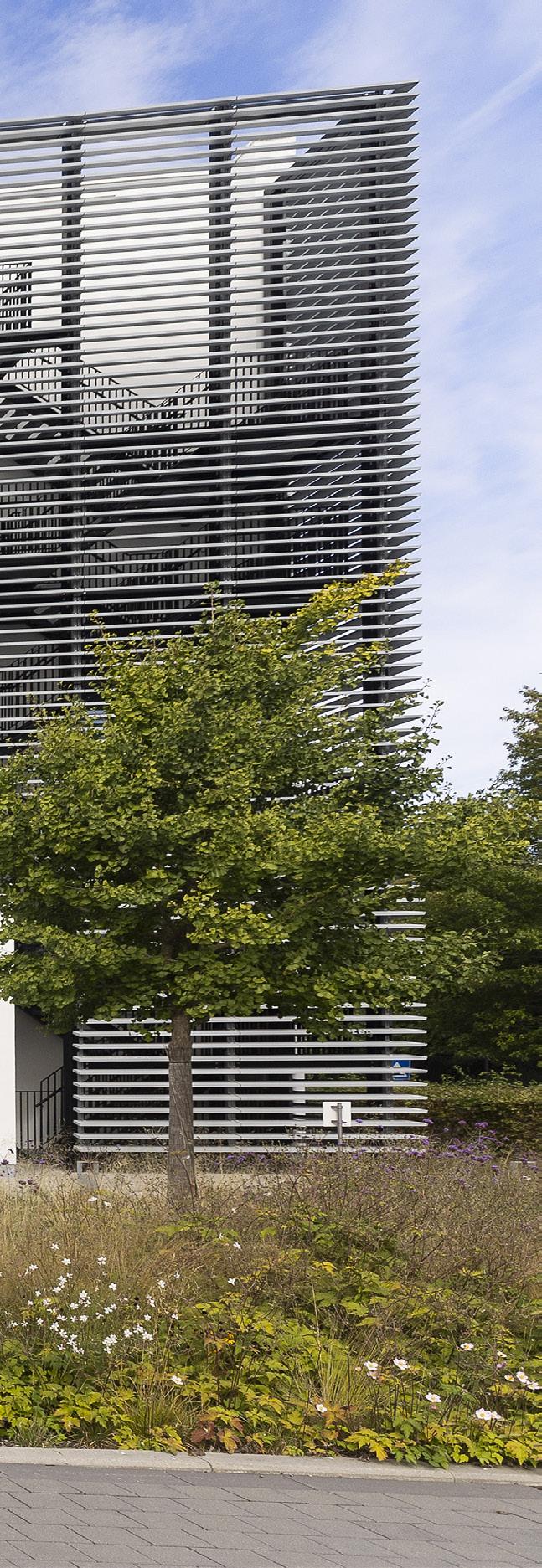
About this report
Organisation
Reynaers Group
Oude Liersebaan 266
2570 Duffel
Belgium
Scope
This report covers the key financial figures and sustainability information of Reynaers Group. It is consistent with our financial statements.
Reporting period
Publication date: 1 October 2024
Reporting period: 1 January 2023 – 31 December 2023
Contact details
For questions regarding this report, please contact: Guillaume Nijdam, Group Sustainability Manager: sustainability@reynaers.com
Reynaers Group at a glance
Reynaers Group is a leading specialist in the development, distribution and commercialisation of innovative and sustainable architectural applications in aluminium and steel. Thanks to our brands, including Reynaers Aluminium and Forster, we have grown from a small family business into an internationally oriented group of companies.
Driven by innovation and entrepreneurship, Reynaers Group builds long-term relationships with partners and clients to achieve mutual sustainable growth and improve the living and working environment of people, now and for generations to come.
Every day, we try to alleviate the lives of building professionals all over the world. We offer innovative products at competitive prices and reliable delivery. Next to physical products, our partners can rely on user-friendly digital tools, expert know-how through training and human-centred support to make their processes more efficient. Our professional network opens opportunities for new customers too, as we grow together.
“Together for better” is our motto and symbolises the core beliefs of this Belgium-based, family-owned company. We employ more than 2,650 people and export our products to more than 70 countries.
Our mission and vision
We implement sustainable thinking in everything we do. As an established family-owned company, we focus on long-term growth. We understand that the success of our business depends heavily on the health of our planet.
That is why we are committing to our sustainability goals: not only because it is the best way to help preserve our planet, but because our unique position as a leading company allows us to set new sustainable standards in the industry, today and for the future.
Our mission
Together we improve the living and working environment of people, now and for generations to come. We blend design, technology and digitalisation in innovative solutions that add value and inspire our partners to create unique sustainable buildings.
Our values
It takes a specific mindset to create ground-breaking innovations. At Reynaers Group, we all share these four core values:
We are innovative entrepreneurs
We give the best of ourselves
Building towards a better future
Reynaers Group CEO Bert Geerinckx and Chairman of the Board of Directors Jan Reynaers reflect on recent company achievements and our sustainable road ahead: “Not only are we on the right track, but we are leading the way too.”
“The Reynaers Group sustainability report is a yearly summary of our sustainability actions, in which we keep a critical eye on our futureproof commitments. By embracing the CSRD regulations, we can communicate our sustainable journey more transparently. But beyond mere compliance, we aim to contribute to a more sustainable world.
If you want to make a change, you need to define the right KPIs based on reliable data. In 2023, we have improved a lot in gathering trustworthy data on our operations and tracking the impact of our products. Our SBTi approved goals and SDG Pioneer status confirm we are not only on the right track, but we are leading the way too.
Next to delivering sustainable solutions to the building market, we also apply them ourselves. The construction and completion of the Forster Campus in Switzerland and the new Reynaers Campus in Poland are milestones that provide a strong base for future growth. These low-energy buildings are proof we walk the talk, creating comfortable and safe places to work with all the latest technologies.”
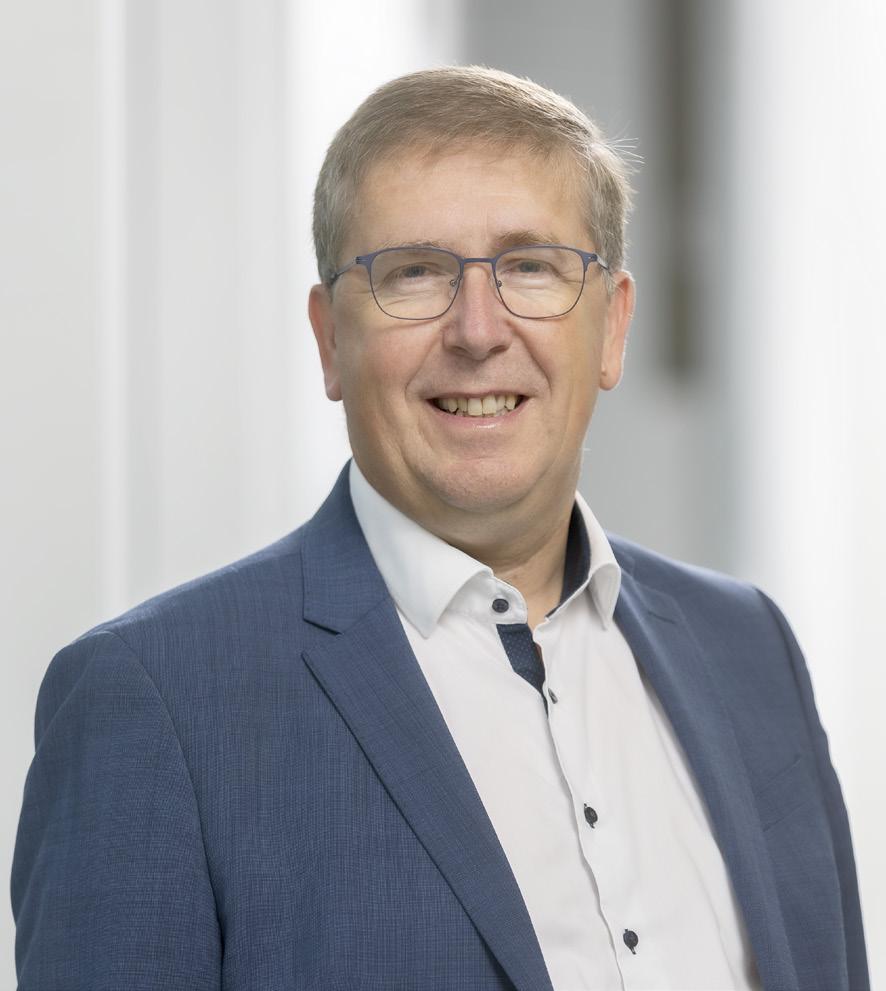
New perspectives
“Acting together, we see our sustainability initiatives result in a concrete positive impact. Slowly but surely, we are reducing our carbon footprint, while inspiring our partners to do the same.
The transition to the sustainable use of materials is ongoing and opens new perspectives for both our aluminium and steel building products. We continue to expand our range of certified circular solutions and tailor our services to
While we still have a long way to go to reach our goals, Reynaers Group stands stronger together, now more than ever.
the needs of building professionals everywhere.
However, the true reason behind Reynaers Group’s success is our dedicated workforce of more than 2,650 employees worldwide. Their continuous efforts help our company reach new heights every day. That is why we keep investing in our people, nurturing personal and professional growth with attention to their physical and mental well-being. While we still have a long way to go to meet our 2030 targets, I believe Reynaers Group stands stronger together, now more than ever. With our shared values and entrepreneurial spirit, we are committed to help create more sustainable buildings, now and for future generations.”
Bert Geerinckx

We are committed
“Reynaers Group has always been a frontrunner in innovative and sustainable building solutions, a champion of positive change. With the full support of the Board of Directors, our company leaders have mapped out the company’s course towards a better tomorrow, “Our sustainable road ahead”. We lead the way and dare to take risks, but we also focus on sensible investments that answer all stakeholders’ needs. What started in my father’s workshop in 1965 has become a global group of companies that delivers outstanding aluminium and steel solutions. Yet we stay true to our roots. Reynaers Group is a Belgium-based, family-owned company that takes pride in its human-centred values, which are reflected in our motto: ‘Together for better’.
It takes a specific mindset to be part of the Reynaers Group community. We give it our all, we share ideas, we challenge the status quo but respect tradition. We are committed to sustainable innovation, and we always deliver on our promises. Sustainability is embedded in everything we do. I invite you to join our journey towards a better future, as illustrated in this ambitious report.”
Jan Reynaers
Our value chain
Reynaers Group is a leading specialist in the development, distribution and commercialisation of innovative and sustainable architectural applications in aluminium and steel with main product groups in windows, doors, sliding systems, façades and complementary systems. We develop products and test them to the highest standards in our own test centre.
SUPPLIERS R&D
• Aluminium & steel profiles
• Insulation strips
• Accessories
• Product design
• Testing
• Certification
• Industry 4.0
• Profile insulation
• Surface treatment (aluminium)
• Logistics OPERATIONS
‘Together for better’ is our motto, we orient ourselves to the needs of our fabricators and business partners which includes architects, engineering offices, contractors and investors. We offer solutions for all phases of a building project from start to finish. We go beyond products and offer our partners tools and digital convenience so our partners can make the right choices for their specific projects.
ARCHITECT
CONTRACTOR
FABRICATOR
• Sales
• Assembly
• Installation
ENGINEERING OFFICE
INVESTOR
• Windows & doors
• Sliding systems
• Façades
• Complementary systems
END USER
Our brands
The seven brands of Reynaers Group complement each other perfectly:
• Reynaers Aluminium: an international specialist in the development and marketing of aluminium solutions for windows, doors, sliding systems and façades.
• Forster: an international specialist in the development and marketing of steel solutions for windows, doors, façades and sliding systems.
• Alural: an international aluminium coater who specialises in powder-coating and anodising aluminium products in all colours and structures.
• Roval: a Dutch specialist in aluminium construction products for roofs and façades.
• Somalu: a French fabricator of aluminium joinery solutions.
• Bloxer: an Italian specialised manufacturer of steel windows and doors.
• ATA IT: a Belgian software company, specialised in tailor-made software solutions.
The purpose of this dynamic group of companies is to increase the value of buildings worldwide and improve the living and working environment of people, with a dedicated focus on innovation, technology, sustainability and design.
3
5
4 Reynaers Group currently comprises:
Corporate governance
Family-owned business
Reynaers Group was founded by Jan Reijnaers in 1965. More than 50 years later, 100% of the company shares are still owned by the Reijnaers family. A shareholders’ agreement and a family charter describe the main governance principles. In this way, Reynaers Group intends to continue as a family busines. Since 2021, the daily operations are managed by an external CEO.
Board of Directors
The Board of Directors is Reynaers Group’s highest decision-making body. The Board meets every two months. The primary objective of the Board of Directors is to develop and sustain a successful industrial group. The company creates sustainable value in line with the vision of the family shareholders, i.e. making innovative products and services to contribute to more sustainable buildings.
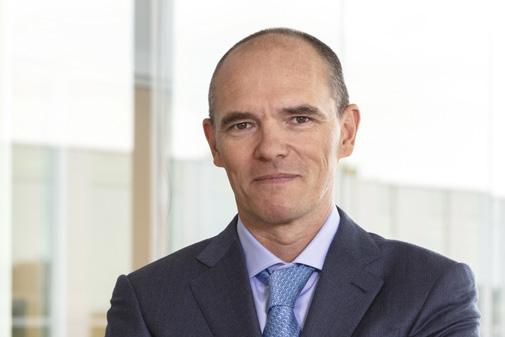
Jan Reijnaers
• Chairman of Reynaers Group
• Member of the Audit & Remuneration Committee
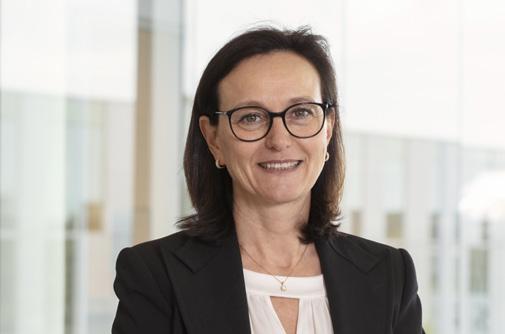
Annik Reijnaers
• Non-executive director of Reynaers Group
• Member of the Remuneration Committee
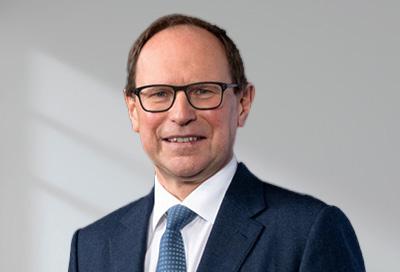
Jos De Vuyst
• Non-executive director of Reynaers Group
• Member of the Audit Committee
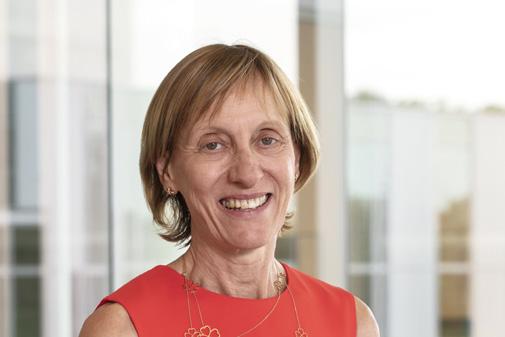
Martine Reijnaers
• Chairwoman of the Audit Committee
• Non-executive director of Reynaers Group

Curd Vandekerckhove
• Non-executive director of Reynaers Group
• Member of the Audit Committee
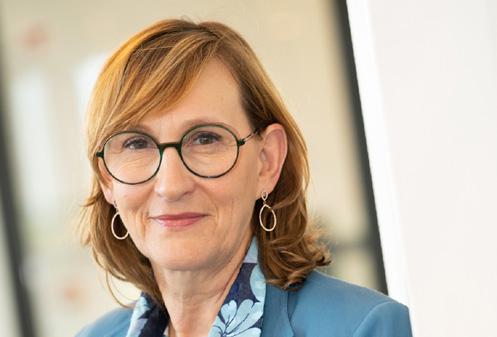
Karin Reijnaers
• Executive director of Reynaers Group
• Member of the Remuneration Committee
• Facility and Mobility Director of Reynaers Aluminium NV

Pieter Puelinckx
• Chairman of the Remuneration Committee
• Non-executive director of Reynaers Group

Denise Reijnaers
• Non-executive director of Reynaers Group
• Member of the Audit Committee
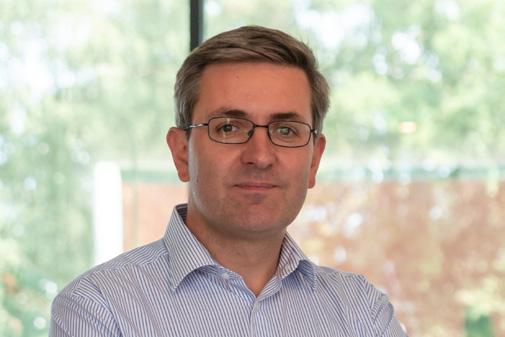
Stefaan Merckx
• Non-executive director of Reynaers Group
• Member of the Remuneration Committee
Management Team
The Management Team is responsible for our day-to-day management. It is a multidisciplinary team that represents all aspects of our business.
• Bert Geerinckx: Chief Executive Officer
• Christoph Vandenbussche: General Manager Belux
• Dominique Schaeken: Chief Marketing Officer
• Edgar van Ginkel: General Manager The Netherlands
• Erik Rasker: Chief Technology Officer
• Johan Van Der Straeten: Group Supply Chain Manager
• Kathleen Dupont: Chief Human Resources Officer
• Peter Nauwelaerts: Chief Operations Officer
• Richard Clavier: Chief Sales Officer (Western and Southern Europe, Africa, North-America)
• Thomas Knobloch: Chief Sales Officer (Central & Eastern Europe, Middle East & Asia)
• Tim Schelfhout: Chief Financial Officer
• Willi Lüchinger: CEO Forster Profilsysteme AG
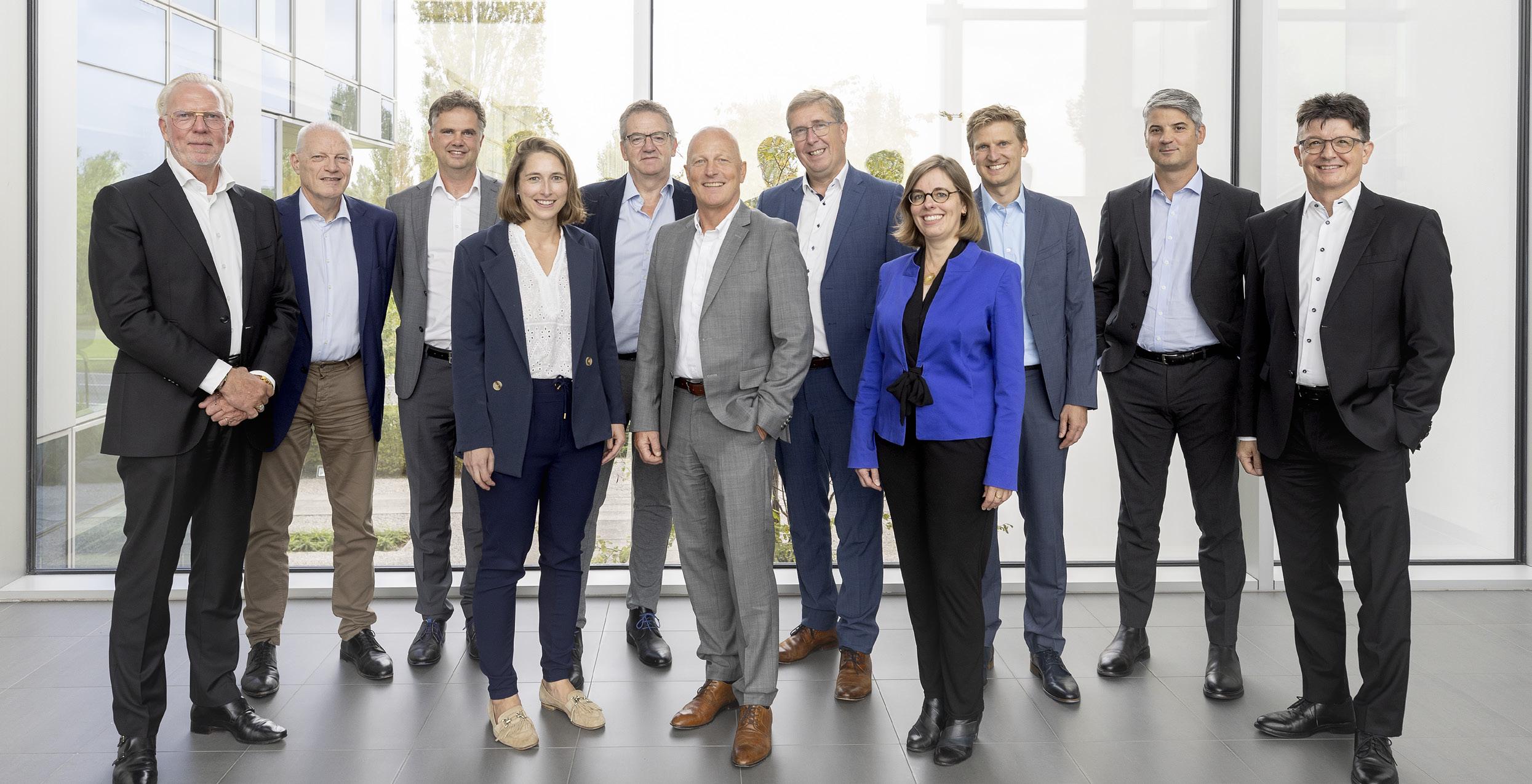
Sustainability governance
In order to implement our sustainability strategy and to achieve our sustainability goals, Reynaers Group created a Sustainability Board in 2021. Many key managers from the Management Team and senior leadership are on this board. This group meets every six weeks to evaluate the impact, risks and opportunities of the company and follows up on the sustainability strategy and targets.
Ambitious strategies need ambitious leaders.
As the CEO is part of the Sustainability Board, ESG1)-related topics and points of attention can be communicated easily, efficiently and by direct line to the Board of Directors and the Management Team. This is crucial to address the management of our impact, risks and opportunities at the highest company level, in a transparent way.
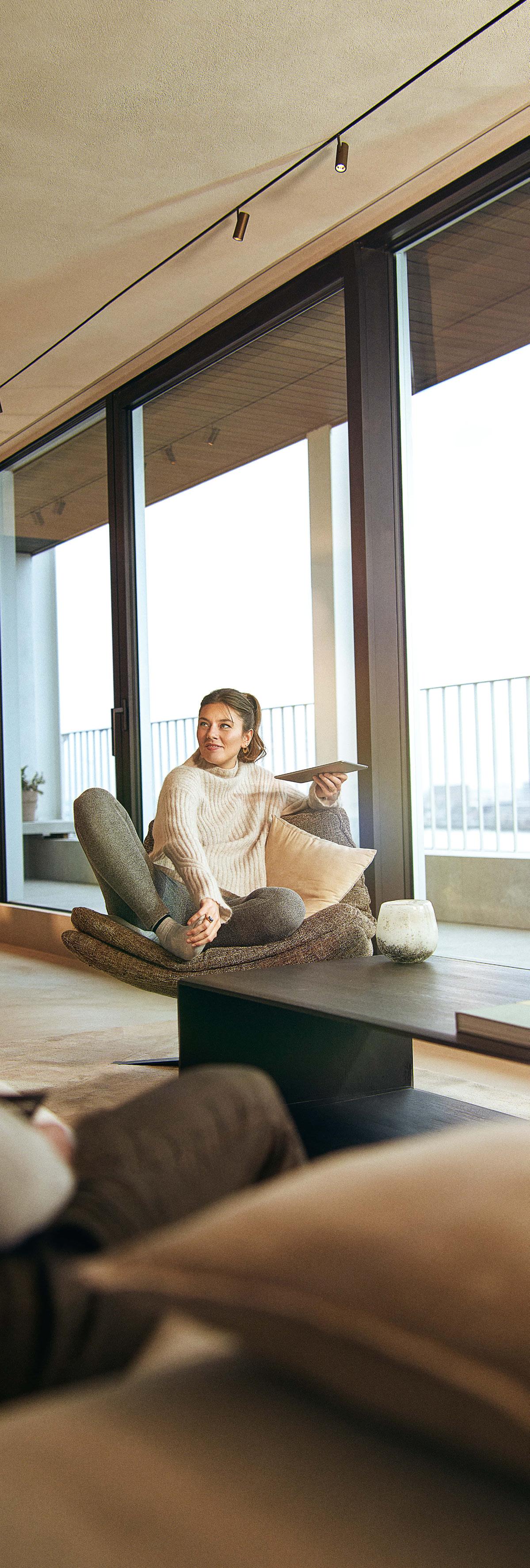
Reynaers Act
A powerful commitment
At Reynaers Group, we firmly believe that the time of making promises is well behind us. It is time to act. Reynaers Act is a company-wide programme that encompasses all our internal and external sustainable initiatives. We keep track of our futureproof actions in the Reynaers Group Sustainability Report, “Our sustainable road ahead”.
Our initiatives are based on facts. They clear the path for us to make a lasting positive impact. They show how we make a difference through the way we act.
Do not say. Just show.
Do not promise. Just prove.
Do not talk. Just act.
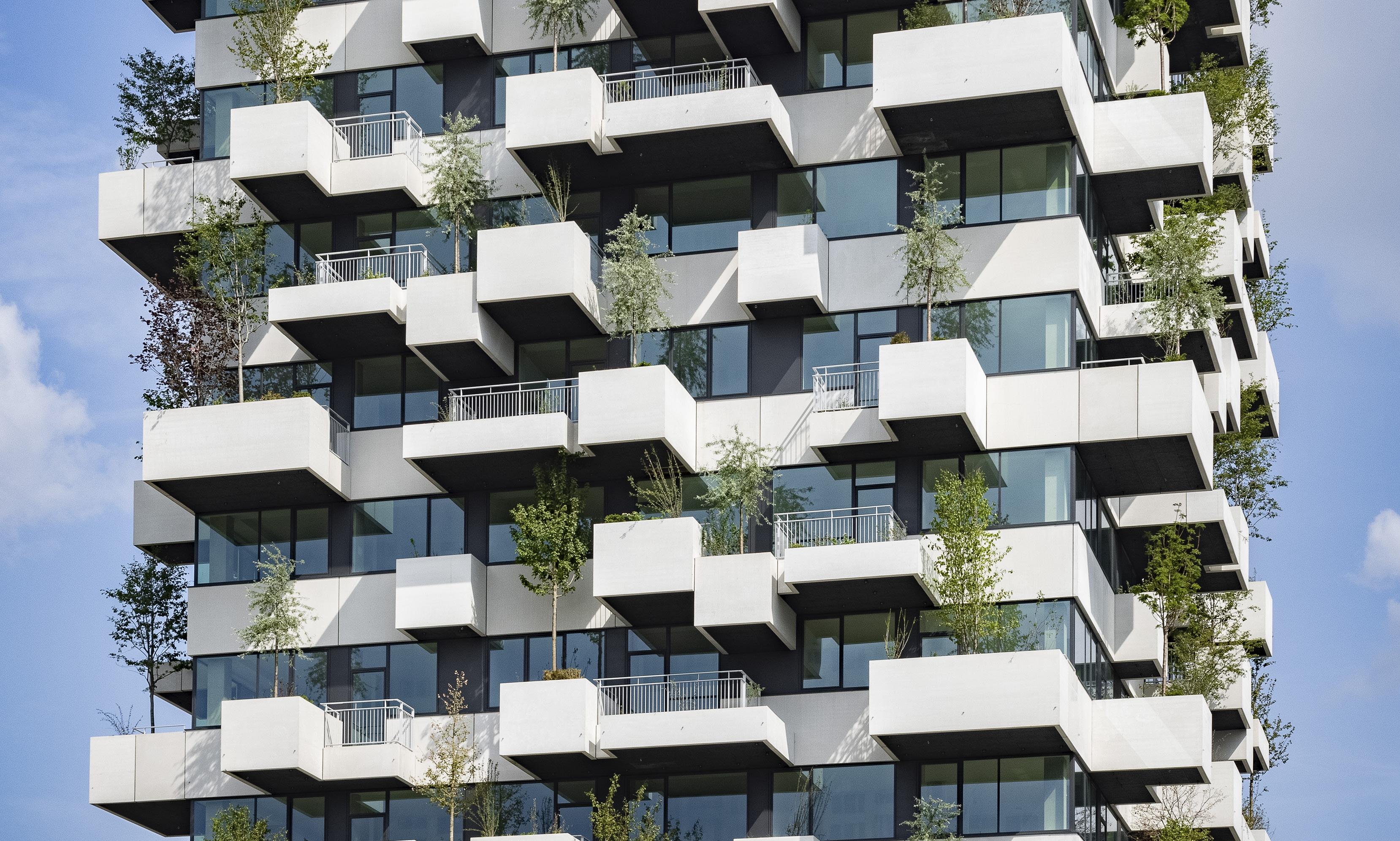
Trudo Vertical Forest
Reynaers Act is a powerful commitment. We aim to be a trusted partner for everyone who wants to build sustainably; honest and transparent communication is an important first step in this process. Our role is to educate and guide building professionals in their ambition to create futureproof living and working spaces, today and tomorrow.
GUILLAUME NIJDAM - Group Sustainability Manager
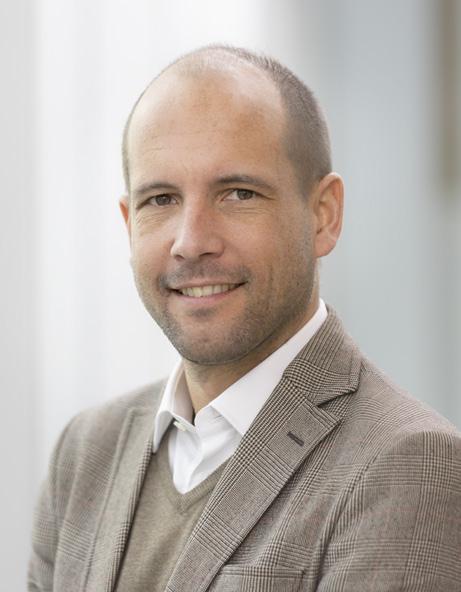
Architect: Stefano Boeri, INBO
Location: Eindhoven, The Netherlands
Sustainability report
Our sustainability strategy
At Reynaers Group, we aim to improve people’s living and working conditions, now and in the future. Sustainability is part of everything we do, and it is at the core of our worldwide futureproof strategy.
By doing our part, we can help limit the effects of global warming one step at a time. Less waste and CO2 pollution, more circular systems and sustainable homes: these are just a few ways we can build a better future together. But we do not stop there.
Reynaers Group fully commits to an ambitious set of goals, as described in our corporate sustainability strategy, Reynaers Act. Promises and good intentions are no longer enough: it is time to act to have a lasting positive impact. While we may have a long journey still ahead of us, we are confident we can reach our goals together with our trusted partners.
To keep an overview of our commitments, we focus on three pillars to act upon:
I. Safeguarding our planet
II. Engaging our people
III. Taking responsibility towards society
Lifelong learning and personal growth
• Lifelong learning
• Talent development
Healthy and safe place to work
• Safety and physical health
• Mental health
Empowering culture
• Employee engagement
• Entrepreneurship and innovation
• Diversity and inclusion
SAFEGUARDING OUR PLANET
Climate action
• Reduction of greenhouse gas emissions in our operations (Scope 1 and 2)
• Reduction of greenhouse gas emissions in our value chain (Scope 3)
• Water and soil pollution
Circular solutions
• Eco-design of our products
• Circular business model and collection of scrap material
• Packaging
Sustainable buildings
• Decarbonisation
• Circular buildings
• Comfort
ENGAGING OUR PEOPLE
TAKING RESPONSIBILITY TOWARDS SOCIETY
Ethical and responsible business
• Ethical behaviour
• Healthy and sustainable business growth
• Sustainability strategy and risk management
• Local communities (philantrophy)
Responsible procurement and due diligence
• Responsible procurement and supply chain management
• Biodiversity and water management in the value chain
Transparency, traceability and communication
• Transparency and reporting
• Traceability
• Dialogue with stakeholders
Building our strategy
Our Corporate Sustainability Strategy is the result of an in-depth process of research and stakeholder consultation. We performed broad desk and sector research and organised workshops in our company. We interviewed external stakeholders and conducted a broad quantitative survey among internal and external stakeholders.
Materiality assessment
The Corporate Sustainability Reporting Directive (CSRD) requires companies to report on the impact of their corporate activities on the environment and on society. As a first step toward CSRD compliance, we carried out a double materiality assessment.
This assessment identified the sustainability topics that are most important to our company and the stakeholders, and those that affect the company in terms of growth, cost or risk. The material topics are also the matters that stakeholders expect us to act upon.
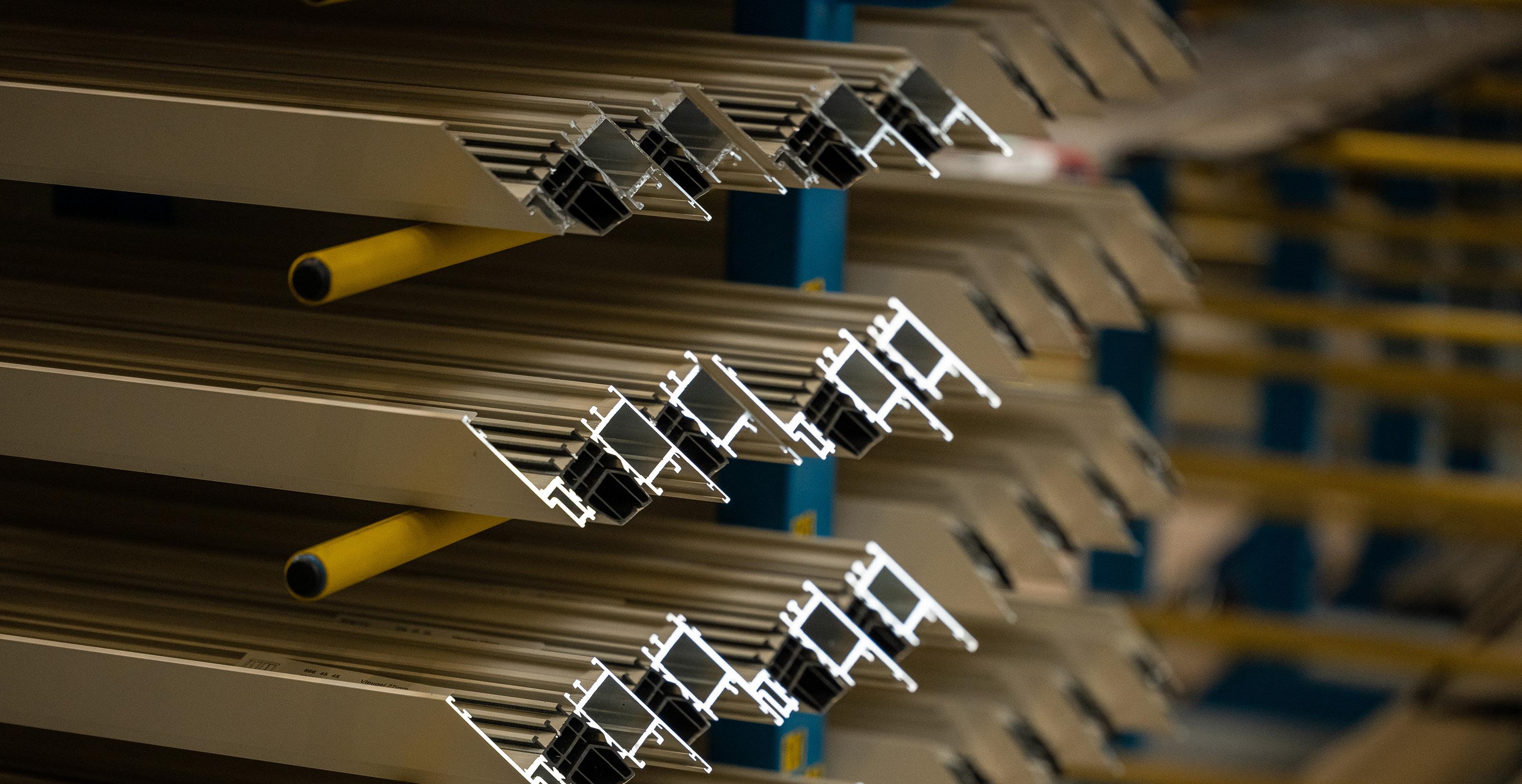
The materiality assessment enabled us to identify our most important focal points. It helped us to understand which environmental, social and governance issues are of most concern to our stakeholders and how they affect our business model and financial value. Thanks to the assessment, we were able to align our sustainability strategy with stakeholder expectations.
GUILLAUME NIJDAM - Group Sustainability Manager
This is how we proceeded:
• Company-specific information and sector-specific information, such as international frameworks and standards (e.g. EA2)), form the basis of the materiality assessment. Through benchmarking, interviews and desk research, we created a long list of relevant topics.
• To determine priorities, we connected with internal and external stakeholders. Through in-depth interviews, we consulted clients, suppliers, knowledge institutions, financial institutions, NGOs and other partners. We also organised focus group discussions with internal stakeholders.
• Through an online questionnaire, we consulted a large range of external stakeholders and employees, from production workers to senior management members (580 respondents).
2) EA (European Aluminium): represents
• We used the same online survey to categorise the most relevant topics according to our management and the Board. Workshops were also held with management members to discuss and determine materiality in greater depth. As a result, we developed a materiality matrix, which showed the importance of various issues to the company (x-axis) and the importance to the stakeholders (y-axis).
• As the CSRD states, a materiality assessment needs validation from leadership. Therefore, the matrix was presented to our management and Board and the last adjustments were made to determine the material topics for Reynaers Group.
Materiality matrix
1 Reduction of greenhouse gas emissions in our operations (Scope 1 and 2)
2 Reduction of greenhouse gas emissions in our value chain (Scope 3)
3 Water and soil pollution
4 Eco-design of our products
5 Circular businessmodel and collection of material scrap
6 Packaging
7 Sustainable buildings
and risk management 18
communities (philantrophy) 19 Responsible procurement and supply chain management
in the
22
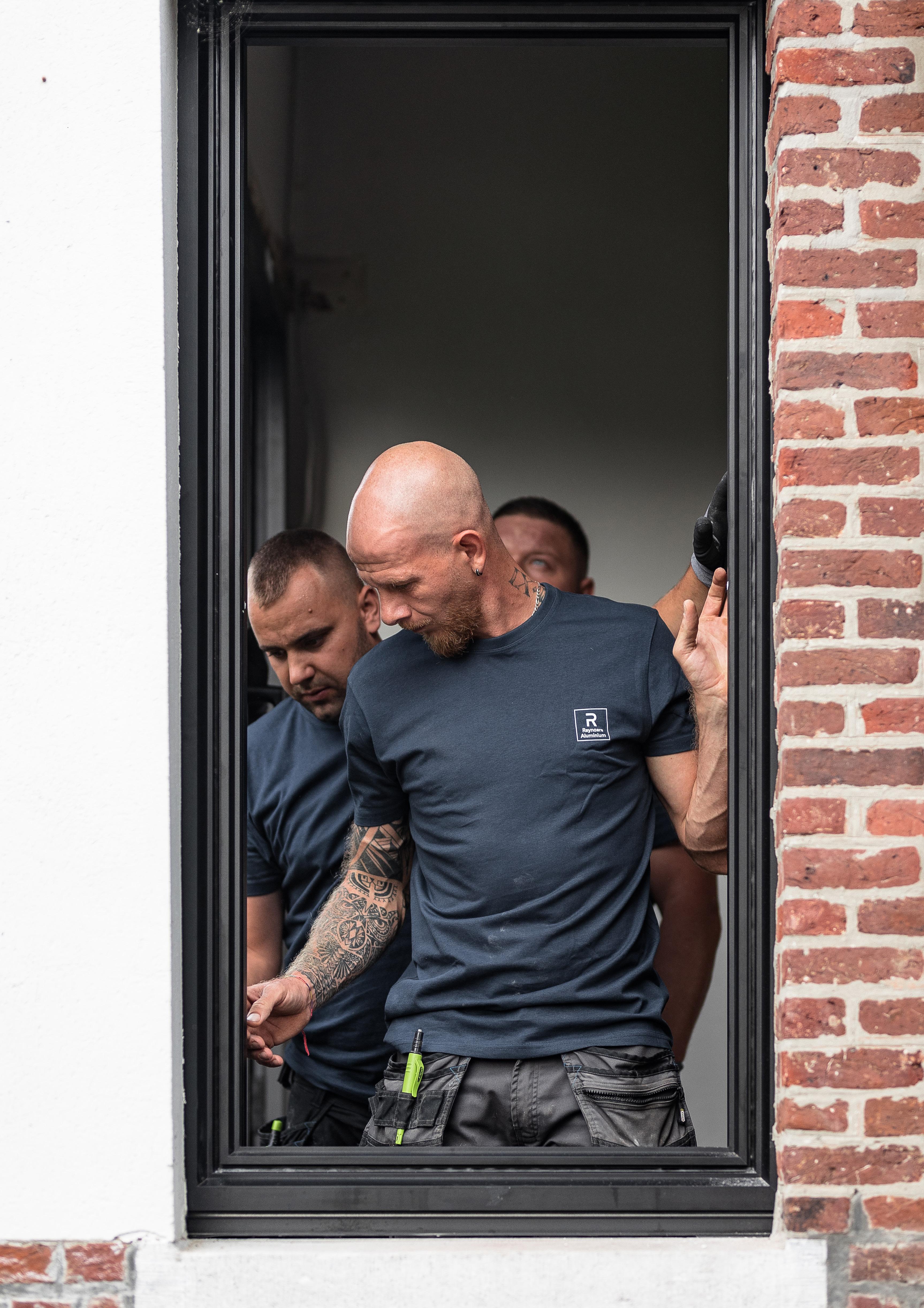
INTRODUCTION
Safeguarding our planet
Climate change is an indisputable global challenge that requires immediate attention and collective action. As a global company, Reynaers Group is aware of its potential environmental impact. We choose not to turn a blind eye, but to embrace our responsibility.
We are deeply committed to making lasting changes and having a positive impact on the environment. We are convinced that we can help address the consequences of climate change and be
a part of the solution. Through innovation, collaboration, and responsible business practices, we aim to set an example within our industry and inspire others to join us.
SAFEGUARDING OUR PLANET
Climate action
• Reduction of greenhouse gas emissions in our operations (Scope 1 and 2)
• Reduction of greenhouse gas emissions in our value chain (Scope 3)
• Water and soil pollution
Circular solutions
• Eco-design of our products
• Circular business model and collection of scrap material
• Packaging
Sustainable buildings
• Decarbonisation
• Circular buildings
• Comfort
Climate action
Large-scale companies have a significant impact on climate change, and Reynaers Group is no exception. This impact implies a certain responsibility, and we are motivated to lead the way to sustainable progress. To take effective action, we first limit the ecological footprint of our operational processes and logistics to an absolute minimum. Next, we are expanding our efforts to reduce carbon emissions in our value chain.
To demonstrate our ambitious CO2 reduction commitments, Reynaers Group has joined the Science Based Target initiative (SBTi), a United Nations environmental partnership that sets
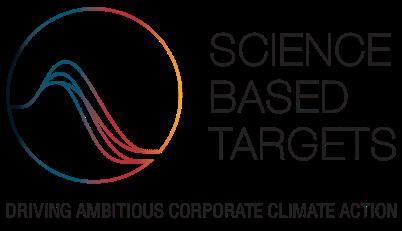
emission reduction targets for businesses all over the world. In 2020, we calculated our carbon footprint of the previous year for the first time: in 2019, the activities of Reynaers Group generated a footprint of 340,015 tonnes of CO2 equivalent (divided in Scope 1, 2 and 3 emissions).
In 2022, we have established our emission reduction targets with 2019 as baseline. Our goals were presented to and approved by the offical SBTi Committee in 2023. The objective is to continuously collect the necessary data in order to keep track of our CO2 -reduction strategy on a yearly basis.
REDUCTION OF CO2 EQ. EMISSIONS IN OUR OPERATIONS (SCOPE 1 AND 2)
Why it matters
Climate change is one of the biggest challenges for present and future generations. Extreme weather conditions are already having major consequences for communities all over the world. We need to address these changes to prevent public health issues, economic crises and other climate-related challenges. As a business, we must also consider the rising cost of CO2 emission due to increasing taxes.
At Reynaers Group, we are determined to address this critical issue. We recognise
the need to contribute and actively engage in efforts aimed at reducing our own environmental footprint.
Additionally, governments worldwide are implementing stricter environmental regulations to combat climate change effectively. By proactively addressing our direct emissions, we position ourselves as leaders in sustainable and innovative entrepreneurship. We exceed regulatory requirements and adopt clean energy solutions whenever possible.

Our goals are clear, now it is time to act. By reducing carbon emissions at our own facilities and across the value chain, we can help create a sustainable future together with our partners.
JOHAN VAN DER STRAETEN - Group Supply Chain Manager

Our approach
Reynaers Group aspires to be a leading company that is compliant with the 2015 Paris Climate Agreement. Although our Scope 1 & 2 emissions only represent 3.2% of our total carbon footprint, we still find it important to set out an ambitious absolute reduction target of 46.2%, independently of future growth. We take full responsibility for these emissions and their respective reduction goals, as they do not depend on the action of third parties, unlike Scope 3 emissions.
Our actions
To reduce our emissions, we are actively pursuing various key actions:
• Greener electricity: to compensate a considerable part of our day-to-day energy consumption, we have already installed solar panels at different strategic production sites. In 2024, we plan on installing even more, e.g., at our Reynaers Aluminium facilities in France. We also benefit from green energy contracts to limit our overall energy expenses.
• Hybrid coating process: most of our coating production lines still run on natural gas. To replace this non-sustainable energy source, we are currently investigating all commercially mature options available on the market.
• Electric car fleet: switching our company’s fuel-driven car fleet to electricity is a straightforward and effective way to reduce our carbon footprint.
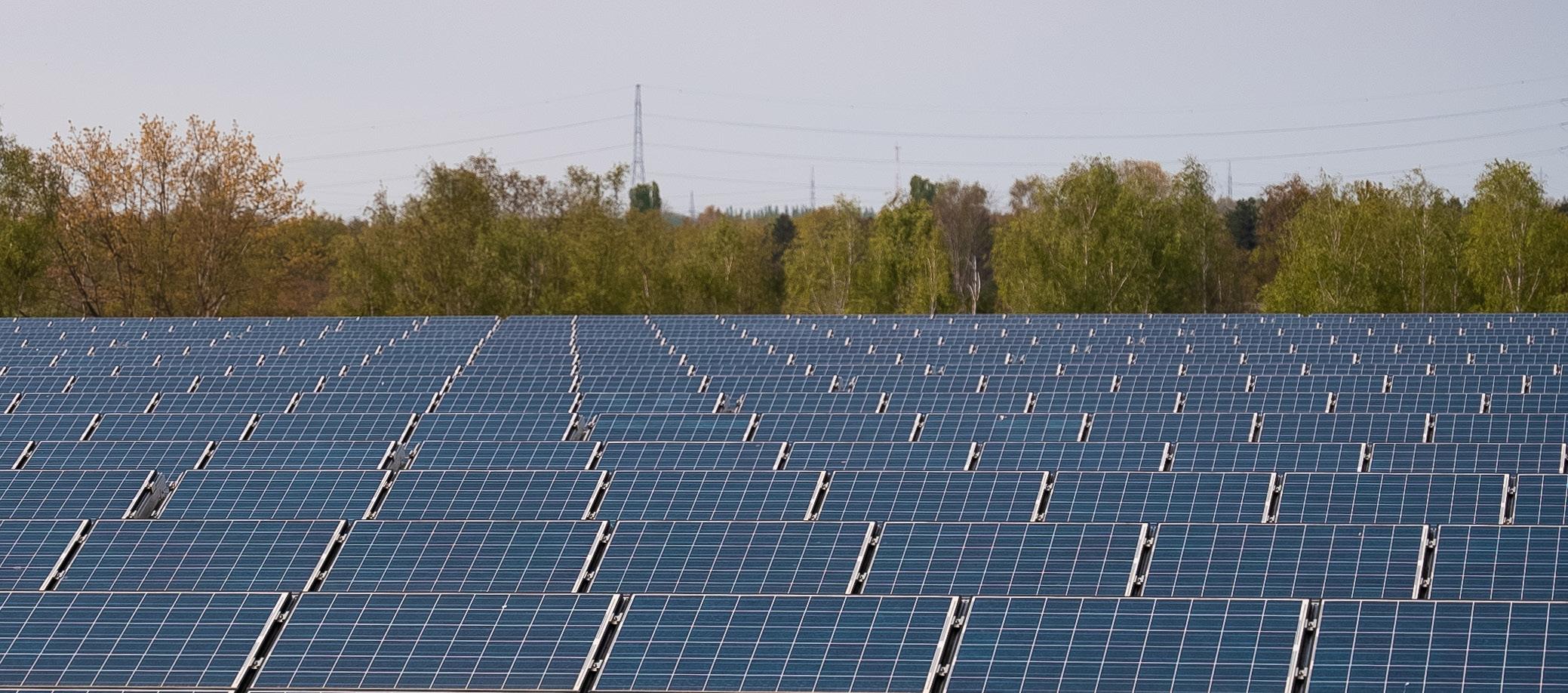
By 2030, our current actions should lead to an absolute, direct emission reduction of 35% compared to the 2019 baseline. We are investigating other projects to raise this reduction rate to 46.2% by 2030.
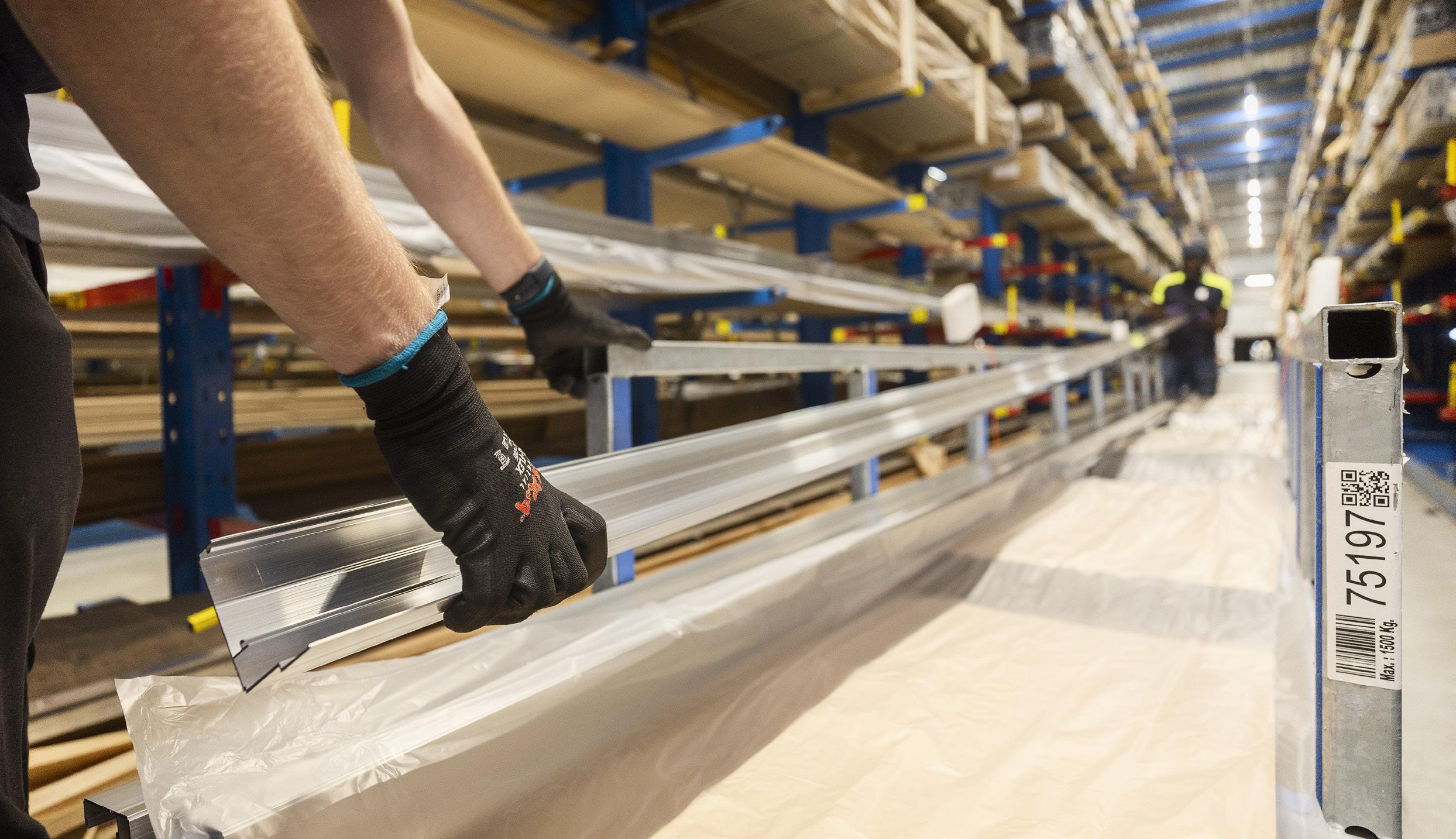
Graph:
Targets
I. 46.2% absolute reduction of Scope 1 and 2 emissions by 2030, compared to baseline 2019.
Our performance
Reynaers Group recorded its first carbon footprint in 2019, and has been tracking it annually ever since. In 2023, we conducted the same exercise.
For Scope 1 and Scope 2 emissions we recorded a decrease of 4.5% (absolute reduction). The largest driver of this drop is the CO2 eq. related to our car fleet. We see the first effects of changing fossil fuel business cars to hybrid and electric vehicles, and experience a decline in the total amount of commuting hours. Since the
Covid health crisis, our employees work more regularly from their home office, thus spending less time on the road.
We foresee a further decrease of Scope 1 & 2 emissions in the next years, as we will see the impact of recent investments we made in our infrastructure, such as the lowenergy campuses in Switzerland and Poland.
Table: Reynaers Group’s carbon footprint in 2019 and 2023
REDUCTION OF CO2 EQ. EMISSIONS IN OUR VALUE CHAIN (SCOPE 3)
Why it matters
Indirect emissions across the value chain, also known as Scope 3 emissions, are usually the largest contributor to a company’s carbon footprint. Of the 340,015 tonnes of CO2 eq. Reynaers Group emits every year, 96.8% comes from our Scope 3 emissions. Emissions originating from purchased materials, in particular aluminium and steel, represent 90% of these emissions.
Our approach
As with our Scope 1 and 2 emissions, we implement the Science Based Target initiative (SBTi) model to reduce our Scope 3 impact. While we take direct responsibility for our own activities (Scope 1 & 2), we engage our stakeholders to help reduce the indirect impact of our supply chain (Scope 3). As a main priority, we collaborate with strategical suppliers, third-party logistics partners and customers to find efficient ways to reduce the ecological impact of our purchased materials. Next to cost, lead time and quality, we consider sustainable commitment as a crucial criterion when engaging in long-term partnerships.
The most relevant sources of Scope 3 emissions at Reynaers Group are:
• Purchased materials
• Freight/transport
• End-of-life processing of products
• Home-to-office commuting
• Business travel
• Waste generation
Our actions
We are implementing several procedures to reduce carbon levels in our purchased aluminium, insulation strips and steel.
I. Decarbonisation of the aluminium mix
We explicity focus on using low-carbon primary aluminium. Finding a balanced mix between low-carbon primary aluminium and recycled aluminium is the right way to go. Only focusing recycled aluminium with the lowest carbon level is not the solution. The reason is simple: with more buildings being constructed than demolished, the demand for recycled aluminium far exceeds market availability. And as the recycling process is commonly applied, all available scrap is re-used. Real impact can be achieved by transforming the primary aluminium into a low-carbon industry.
In 2019, for each kilogram of sourced aluminium, the average footprint was 5.16 kg CO2 eq. In 2023, we were able to cut that impact to 4.76 kg CO2 eq./kg by procuring more low-carbon aluminium. By 2030, we anticipate figures as low as 2.81 kg CO2 eq./kg.
has a carbon footprint that is only 5% of that of standard primary aluminium
has a carbon footprint that is max 46.5% of that of standard primary aluminium requires less energy to produce is made with renewable energy
Recycled aluminium
Low-carbon primary aluminium
II. Decarbonisation of thermal breaks
We are also increasing our use of recycled content in our thermal breaks to 37.1% of our total volume (2023). For instance, Reynaers Aluminium is currently using 100% recycled thermal breaks in our top performing solutions, including MasterLine 8 and MasterLine 10 windows and doors, and MasterPatio and HiFinity sliding systems.
III. Decarbonisation of the steel mix
Forster is in the process of placing the first orders for the gradual conversion of its product portfolio to “low carbon emission steel”. The innovative material is characterised by an environmentally friendly manufacturing process that requires less CO2 emissions, and thus enables a reduced carbon footprint. Forster will be the first supplier of insulated steel profiles made of 100% low carbon emission steel in the world.
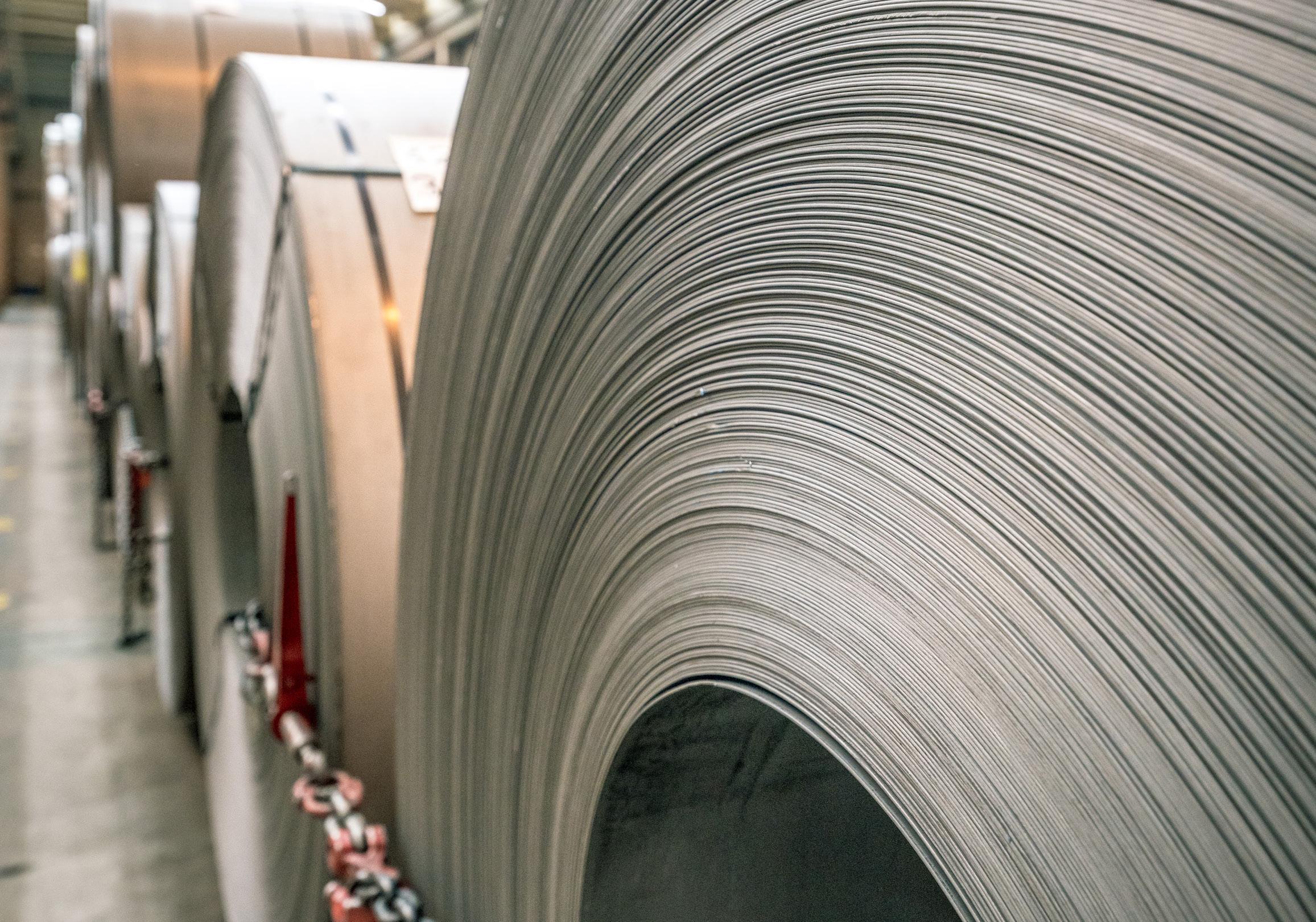
Targets
I. 55% relative reduction of Scope 3 emissions by 2030, compared to 2019 baseline.
Our performance
In 2023, Reynaers Group recorded a relative decline of 4.6% in Scope 3 emissions.
We expect a further decline in the next years because of the implemented action on decarbonisation of our Scope 3 emissions. We will yearly monitor the progress.
Table: Reynaers Group’s carbon footprint in 2019 and 2023
WATER AND SOIL POLLUTION
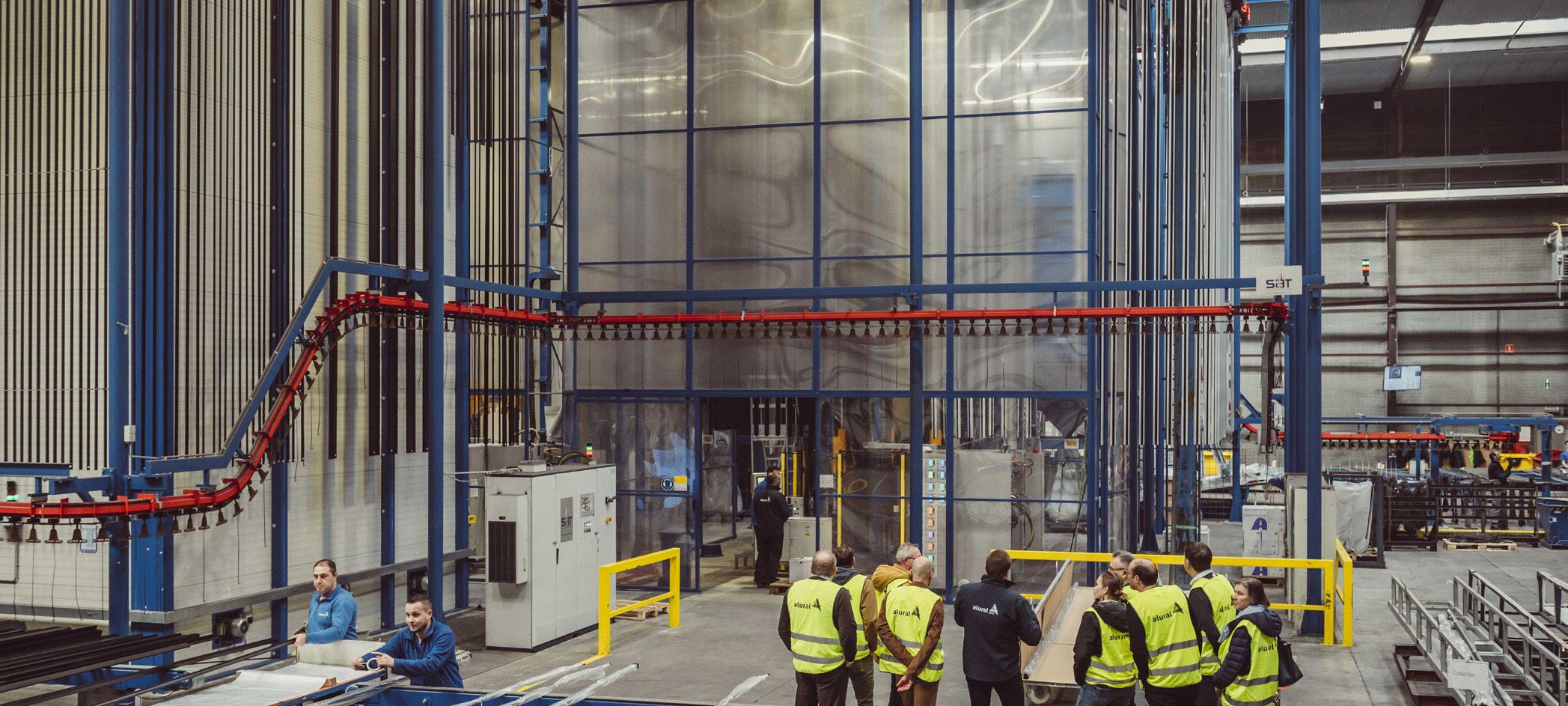
Why it matters
The greatest source of our impact on water and soil can be found at our Alural sites in Belgium (Lummen and Tisselt). Alural specialises in coatings and anodisation processes, to protect the profiles from different types of weather conditions and to create the perfect colour for each project. However, these processes have an impact on soil quality, water quality and water consumption levels.
Our approach
In terms of soil pollution, we monitor our sites 24/7. Reynaers Group takes active measures to preserve current soil quality and to ensure existing contaminants do not spread or cause any harm.
When it comes to water pollution, our two Alural coating sites have the biggest impact – and the largest potential for improvement. We take steps to reduce water pollution and to improve and expand our wastewater treatment processes.
Our actions
At Alural, we have invested in new techniques and processes to reduce our impact on water and soil. We have installed a new water treatment process at Alural Lummen, while the plant in Tisselt implemented two evaporators to improve their wastewater quality. At Alural Tisselt, 100% of process water is now treated and the residue is processed by a third-party partner.
Our performance
With the recent investments in both Alural sites, we expect the metrics to further evolve in a positive way. We will closely monitor the projects’ outcomes, assess their impact, and set new sustainability targets and objectives based on real-time data.
CASE STUDY
Upgrading wastewater treatment
At Alural Lummen, we have developed and implemented a new wastewater treatment process. The project involves an optimisation of the existing water treatment plant, with a specific division in three separate flows to treat each flow accordingly. As a result, the process has become more efficient.
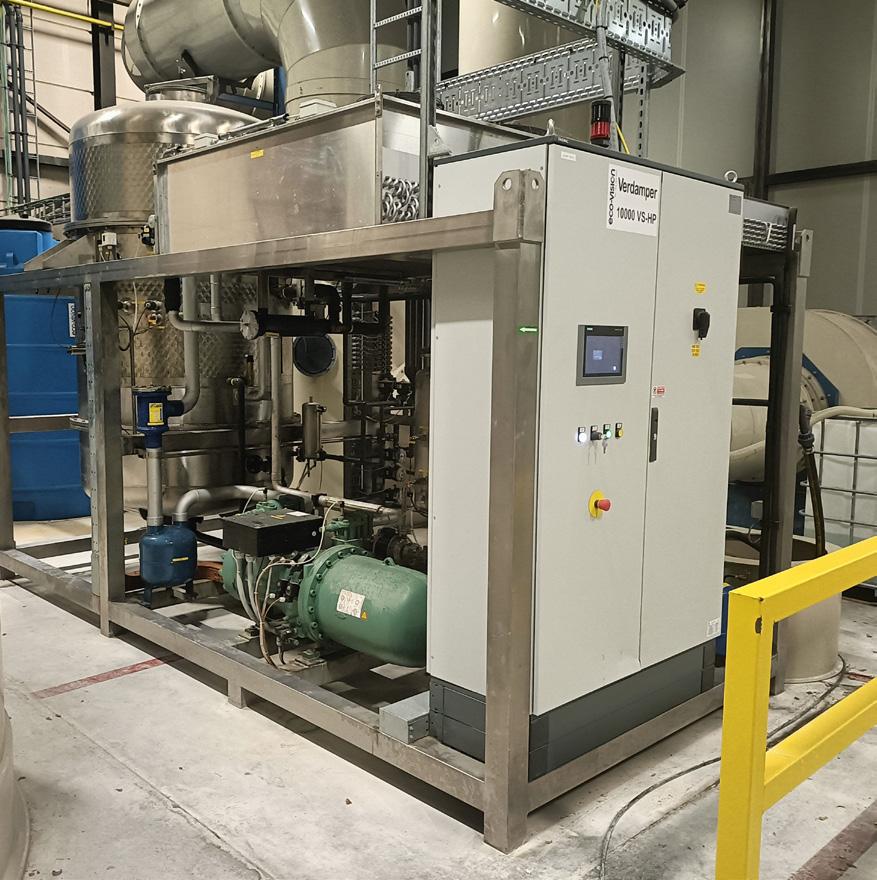
• Flow 1: the majority of the wastewater, around 90% of the total volume, continues to be treated through the existing water treatment process.
• Flow 2: a second wastewater flow, consisting mainly of sulphates, is now separated from the main flow and directed to a vaporiser. Approximately 90% of this flow is converted into distillate, while the remaining 10% becomes a concentrated solution which is treated by third-party partners. The distillate can be fully recovered and reintegrated into the production process, resulting in 12% less water usage at the plant.
• Flow 3: a third flow, consisting mostly of aluminium bleed, is treated separately.
By investing heavily in this wastewater treatment process, we have taken considerable steps forward when it comes to responsible water consumption and wastewater treatment. 37
Circular solutions
Aluminium and steel are among the most widely used building materials, and increasing their circular character has become an industry-wide priority. Reynaers Group plays an important role in the circular economy model, as we increase material efficiency and develop products with an extended lifespan. As a result, through futureproof research and design, we are able to improve the recyclability of all our solutions, tackling different environmental challenges at the same time.
The road towards a circular economy is always a shared responsibility. We aim to contribute to this journey by choosing our materials carefully. At Reynaers Group, we take pride in offering joinery made of steel and aluminium—two materials that can both be reused and fully recycled an infinite number of times. Choosing aluminium and steel not only ensures the longevity and durability of our products, but also plays a pivotal role in reducing a system’s lifelong carbon footprint.
ECO-DESIGN OF OUR PRODUCTS
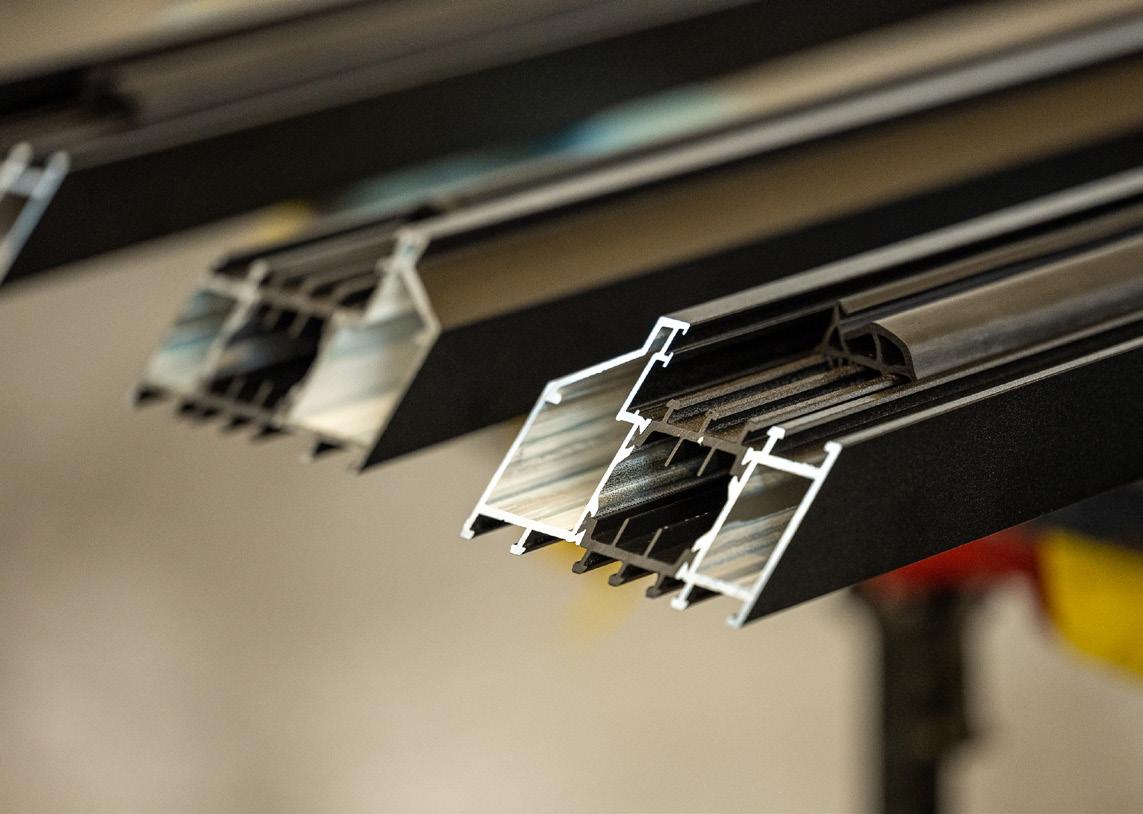
Why it matters
We believe that 80% of a product’s environmental impact can be limited by making the right decisions during the design stage. That is why eco-design has been a focal point of our company philosophy for many years. When we develop new products, sustainability is always top of mind. Topics such as material use, increased thermal performance and circularity play an important role in this phase.
Our approach
Reynaers Group contributes to the eco-design of its products in several ways:
• Collaboration: our designers, engineers and developers work together to ensure that eco-design principles are integrated throughout the entire product development process.
• Material selection and use: we choose quality materials with a long lifetime and a limited environmental footprint. We use lowcarbon aluminium and steel to reduce embodied carbon levels and opt for coating finishes with minimal negative effects. In order to limit material use, we optimise the material use within our profile design and the respective cutting lenghts too.
• Modularity: we design systems with modular components that can be easily replaced or upgraded, extending the product’s lifespan and reducing the need for complete replacements.
• Efficient manufacturing: we implement efficient manufacturing processes at our partners.
• End-of-life considerations: we plan for the future disposal or recycling of our aluminium and steel systems. We design for materials that can be recycled.
Eco-design has been a focal point of our company philosophy for many years. When we develop new products, sustainability is always at the forefront. Themes such as material use, increasing thermal performance and circularity play an important role in this.
TIJS VAN BOVEN - Products & Services Manager
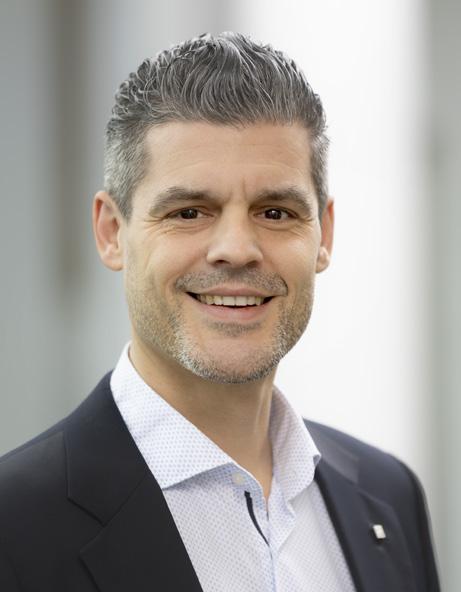
Our actions
Our company has decades of experience when it comes to eco-design research. As ecological market needs are ever-changing, we are currently conducting a research study to create an eco-design template for new product developments. The template consists of a checklist of relevant subjects related to the eco-design principle. It will facilitate the analysis of a product’s impact on the environment, as the checklist suggests improvement options for areas where environmental problems are identified. The uniform document will streamline our internal communication and nurture interaction with parties outside of Reynaers Group.
Next, official certification is an important indicator of effective eco-design. For instance, several Reynaers Aluminium solutions are Cradle to Cradle Certified®.
The Cradle to Cradle® certificate is the global standard for products that are safe, circular and responsibly made.
It assesses products on five criteria:
Material health
Product circularity
Water and soil stewardship
Social fairness
Clean air and climate protection
Since our latest recertification (v3.1), the Cradle to Cradle® Product Innovation Institute has launched a new and stricter standard (v4.1). We are currently conducting all preparations to have our systems recertified following the new standard.
Finally, we will investigate the use of fireretardant alternatives for our Forster steel joinery range. We acknowledge the environmental impact of these materials and will search for new, more sustainable alternatives.
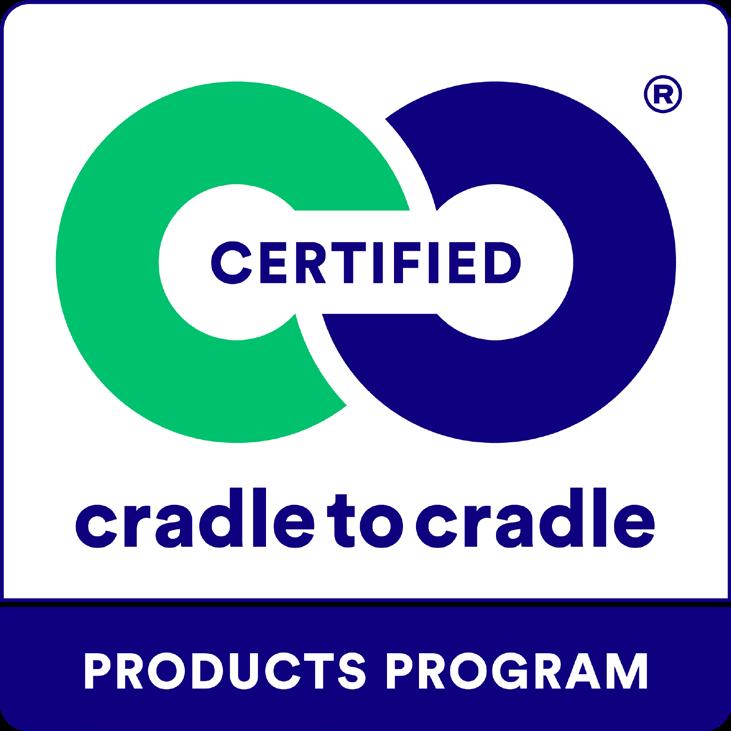
Targets
I. From 2024, every new strategic product development needs to be cross checked with our Reynaers Group eco-design checklist.
II. By 2025, we will have a strategical Reynaers Aluminium product offering recertified to the stricter criteria of the v4.0 Bronze level of Cradle to Cradle®.
III. By 2026, we start to replace the fire-retardant material in our Forster fireproof products to a more sustainable material.
Our performance
Reynaers Aluminium currently offers 14 products with a Cradle to Cradle® Bronze v3.1 certificate. In 2025, we will apply the new and stricter v4.1 level of bronze certification for a selected range of systems.
Systems
Windows
Doors
MasterLine 8
MasterLine 10
SlimLine 38
ConceptSystem 77
MasterLine 8
MasterLine 10
SlimLine 38
ConceptSystem 77
Sliding doors
Façade systems
MasterPatio HiFinity
ConceptWall 50-HI
ConceptWall 60-HI
ConceptWall 86-EF
ElementFaçade 7-GB
MasterLine 8
MasterLine 10
SlimLine 38
SlimLine 38-HI+ ConceptSystem 77
MasterLine 8
MasterLine 10
SlimLine 38 ConceptSystem 77
MasterPatio HiFinity
ConceptWall 50-HI
ConceptWall 50-MT
ConceptWall 60-HI
ConceptWall 60-MT
ConceptWall 86-EF
ElementFaçade 7-GB
SlimWall 35
At Forster, we have started the investigation for sustainable fire-retardant alternatives by mapping out all the materials currently used. The data collection will set us up for further investigation in the coming years.
Eco-design in action: MasterPatio
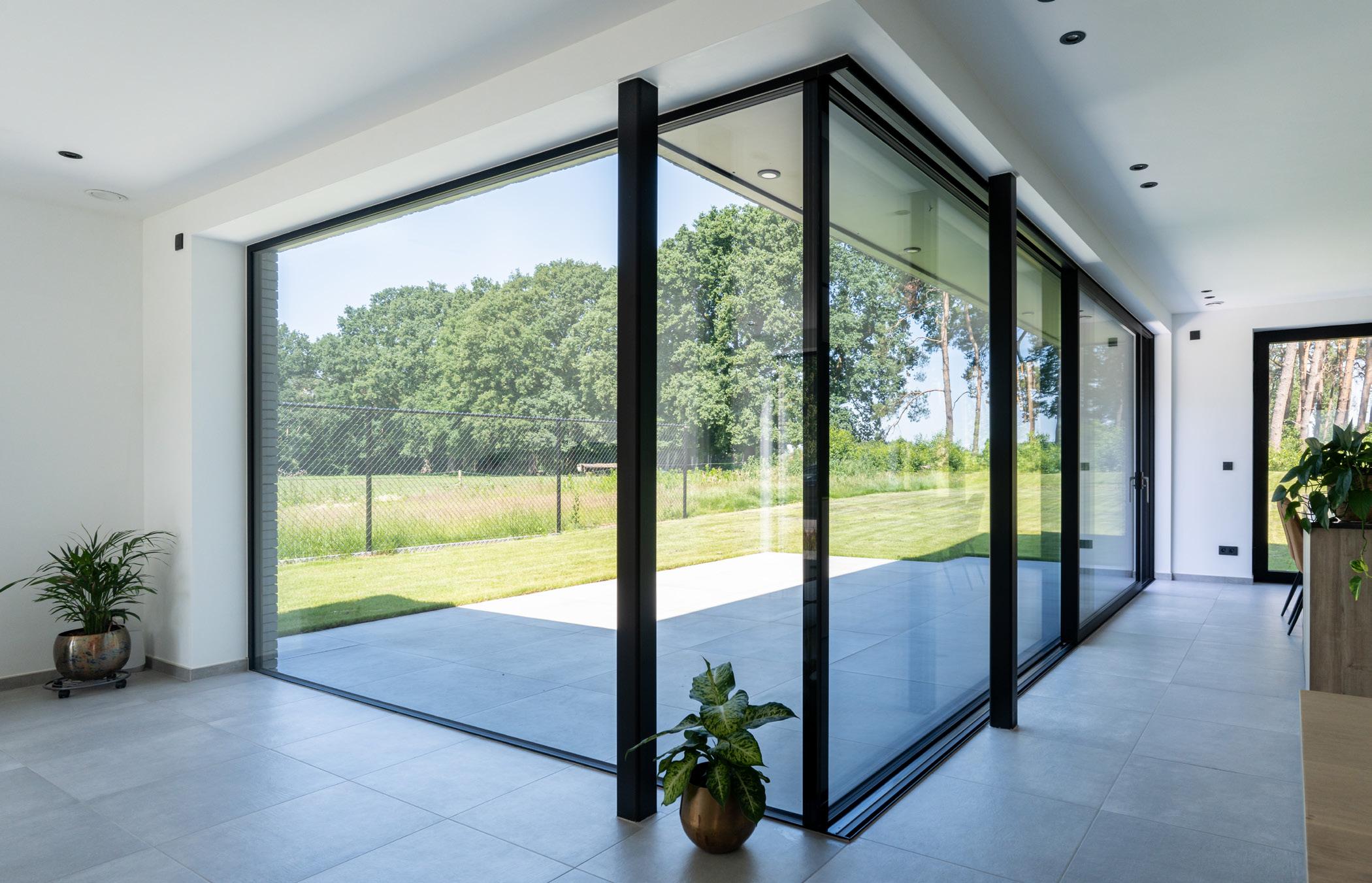
A high-quality lift-slide system, MasterPatio is one of Reynaers Aluminium’s most ambitious product designs yet. It is designed to achieve higher insulation values, with attention to aesthetic details, durability and superior technical requirements. However, MasterPatio is also a sustainable choice, as we use recycled thermal breaks.
There are quite some benefits to using insulated strips with recycled instead of non-recycled content. For instance, the production process has a lower carbon impact and requires less water.
By offering the aluminium profiles in different lengths, we also see a drop in production waste when assembling the system. MasterPatio’s futureproof design played a pivotal role in the system’s Cradle to Cradle® Bronze certification. It also earned MasterPatio multiple international awards, including a Red Dot Award (2021), Archiproducts Award (2021) and a National Sustainability Award (Portugal, 2023).
Eco-design in action: circular steel thermal breaks
Our Forster steel systems need no additional synthetic insulating materials: the profile system is entirely made of steel, including the thermal breaks. They meet the highest standards for technical and structural functions thanks to their unique framework construction. The combination of the latest technology, excellent energy efficiency and ecological use of materials offers the ideal responsible joinery solution for all kinds of sustainable buildings.
Forster’s high-quality system range showcases the circular potential our products offer, as the steel frames can be easily recycled, over and over again, without loss of quality. The ongoing switch to low carbon emission steel as Forster’s main system material opens even more opportunities to environmentally friendly building projects all over the world.
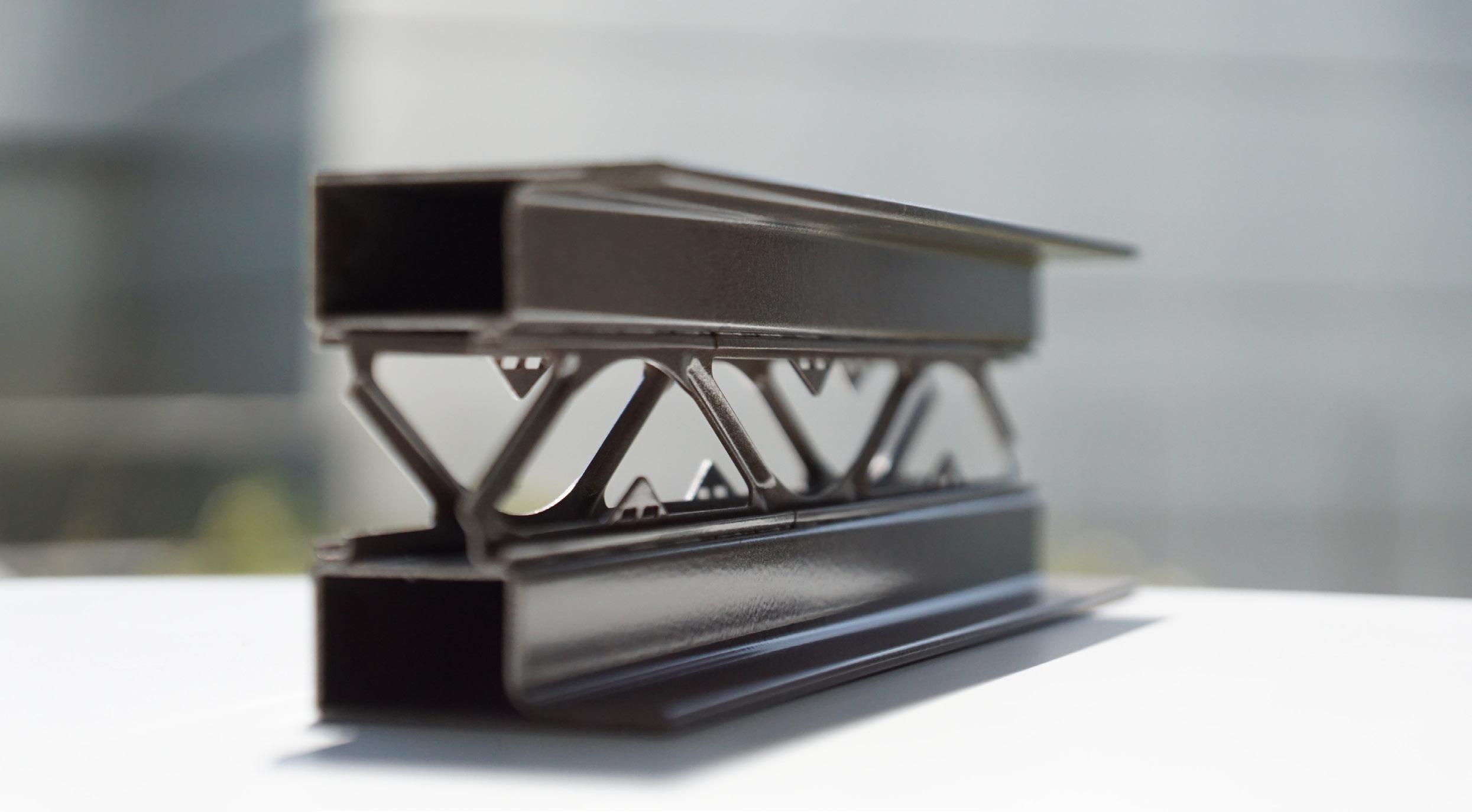
CIRCULAR BUSINESS MODELS AND COLLECTION OF SCRAP MATERIAL
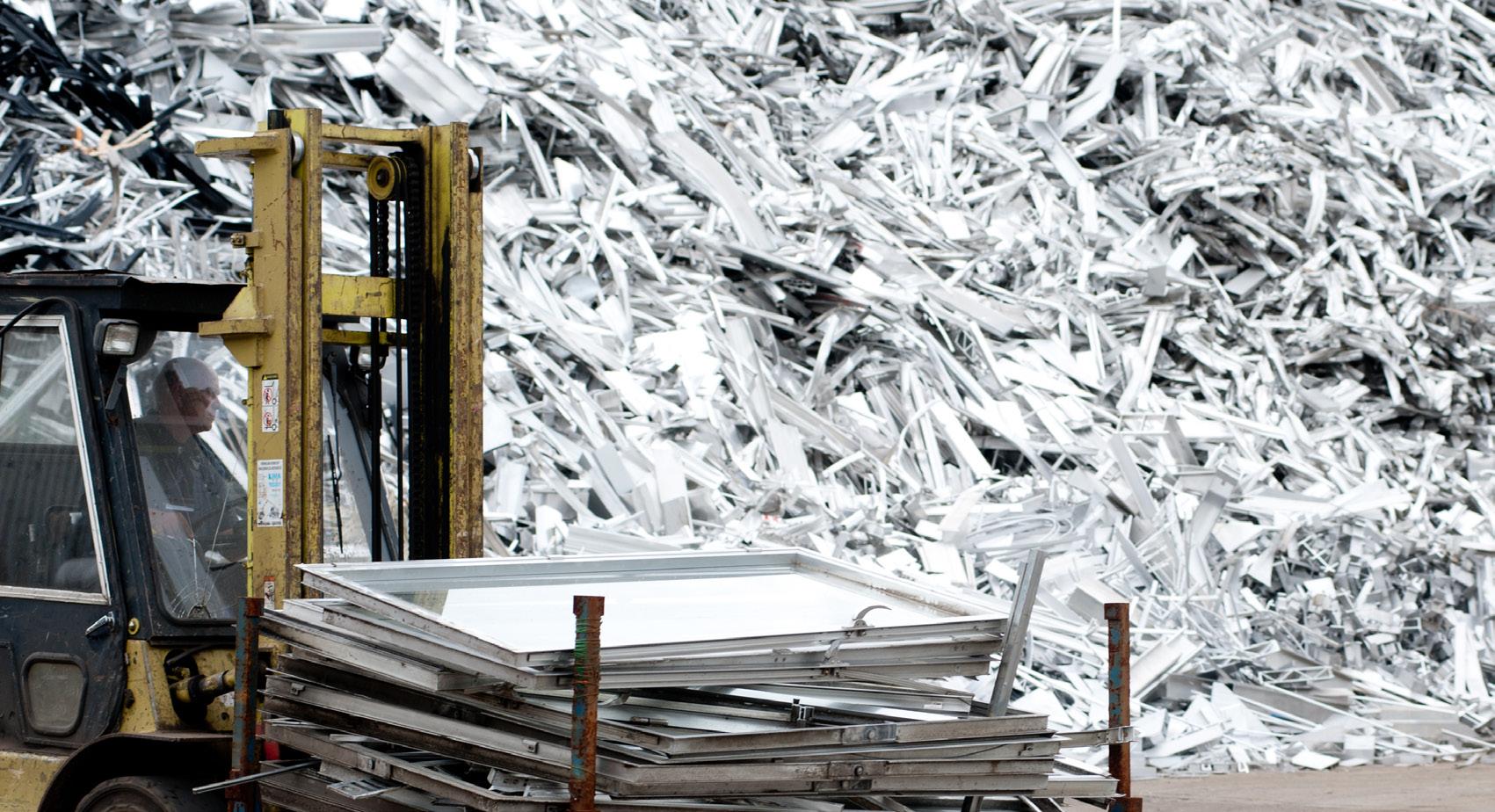
Why it matters
Thanks to the long lifespan of aluminium systems, limited scrap volumes are available. By working together with our partners to collect building and process scrap more efficiently and to set up new circular business models, Reynaers Group contributes to the circular economy.
Our approach
We push ourselves to maximise the circular nature of our products, while helping our business partners achieve their sustainability goals. Information is key to making sustainable choices, which is why we provide as much digital information as possible about our systems and the materials we use. Our transparency makes it easier to repair or recycle the materials in our solutions. In addition, we also believe in building an ecosystem of partnerships that enhance circularity through the collection of scrap. By collaborating closely with other players in the industry, we can create a wider, more positive impact.
Our actions
To turn the current take-make-waste model into a circular one, recovering and repairing products and materials is a crucial step. To do this effectively, we need a proper understanding of the products that need repair and the materials we want to recover. At the same time, data sharing with all stakeholders is becoming very important. To answer this need for information, we have started the development of product passports and the DigiTrace platform.
By scanning the DigiTrace QR code on the tag of a particular element, end-users and other stakeholders will be able to access relevant and accurate information about the product more quickly and more easily. They can check system and technical characteristics or access relevant documents, such as maintenance instructions and the product’s CE passport. In the future, DigiTrace will make circular data, such as featured product materials, readily available as well.

Targets
I. By 2025, we investigate possible partnerships to stimulate a collection system for scrap material.
II. By 2026, we develop our digital tool DigiTrace further to add more sustainability data so it can be used to improve the circular use of our products in buildings.
Our performance
DigiTrace was presented to our stakeholders in 2023 with great enthusiasm. We showcased how product passports can be accessed, which included vital information such as:
• Technical data on the system, glass and performance levels
• General documentation (e.g., maintenance guides, installation photos)
• Certificates (e.g., CE labels)
• Contact details of the fabricator in case of problems
PACKAGING
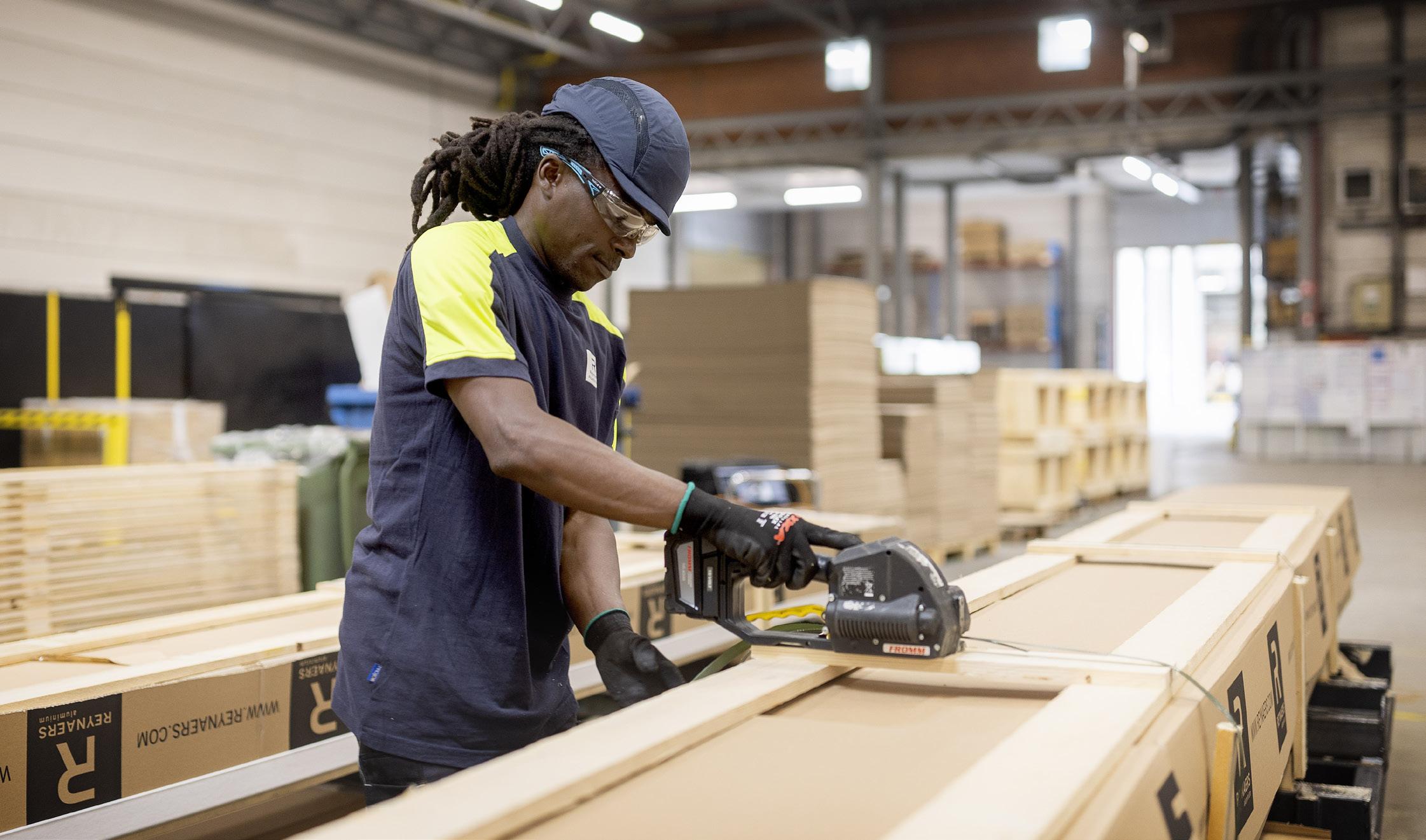
Why it matters
We package our products to protect them during transportation. However, although packaging materials are safe and useful, excessive waste has become a global concern. In a circular economy, minimising packaging waste is therefore a priority.
Our approach
Reynaers Group wants to contribute to the circular economy, as we view packaging materials as a resource rather than waste. We reduce our total amount of packaging waste by keeping materials in circulation for as long as possible. Additionally, we continue to explore different options to limit and reuse our packaging.
Our actions
In our quest to minimise packaging waste and embrace circular practices, we are investigating various routes. Our first step involves gathering essential data, the foundation for our efforts. Furthermore, we are researching methods to close the material loop and are engaged in an innovation project that aims to reduce our packaging footprint.
Targets
I. By 2025, we have a strategy on how to reduce the environmental impact of our packaging.
Our performance
To support our group-wide efforts to enhance our packaging processes, we are currently developing a waste management strategy. With that in mind, we are assessing the requirements, opportunities and aspirations of various Reynaers Group sites. A collective policy will enable us to refine our packaging solutions. Our group policy will also remain aligned with one of our core beliefs: ‘Think Global, Act Local.’ We aim to offer our local sites a flexible framework that can be customised to specific local requirements and constraints.
Sustainable buildings
Why it matters
The construction industry currently faces two major challenges. On the one hand, the sector is the largest global consumer of energy and generates large amounts of greenhouse gas emissions (GHG). To reduce these consumption levels, we must focus on creating energy-efficient
buildings and making low-carbon material choices. On the other hand, the building industry needs to increase its resilience to the negative effects of climate change, especially now that extreme weather events are becoming more common.
As a developer of joinery systems for windows, doors, and façades, our company can play a vital part in creating more sustainable buildings. What is more, Reynaers Group sees this challenge as an opportunity to confirm its leading role. By sharing our knowledge, we can increase our positive impact and lead by example.
Location:
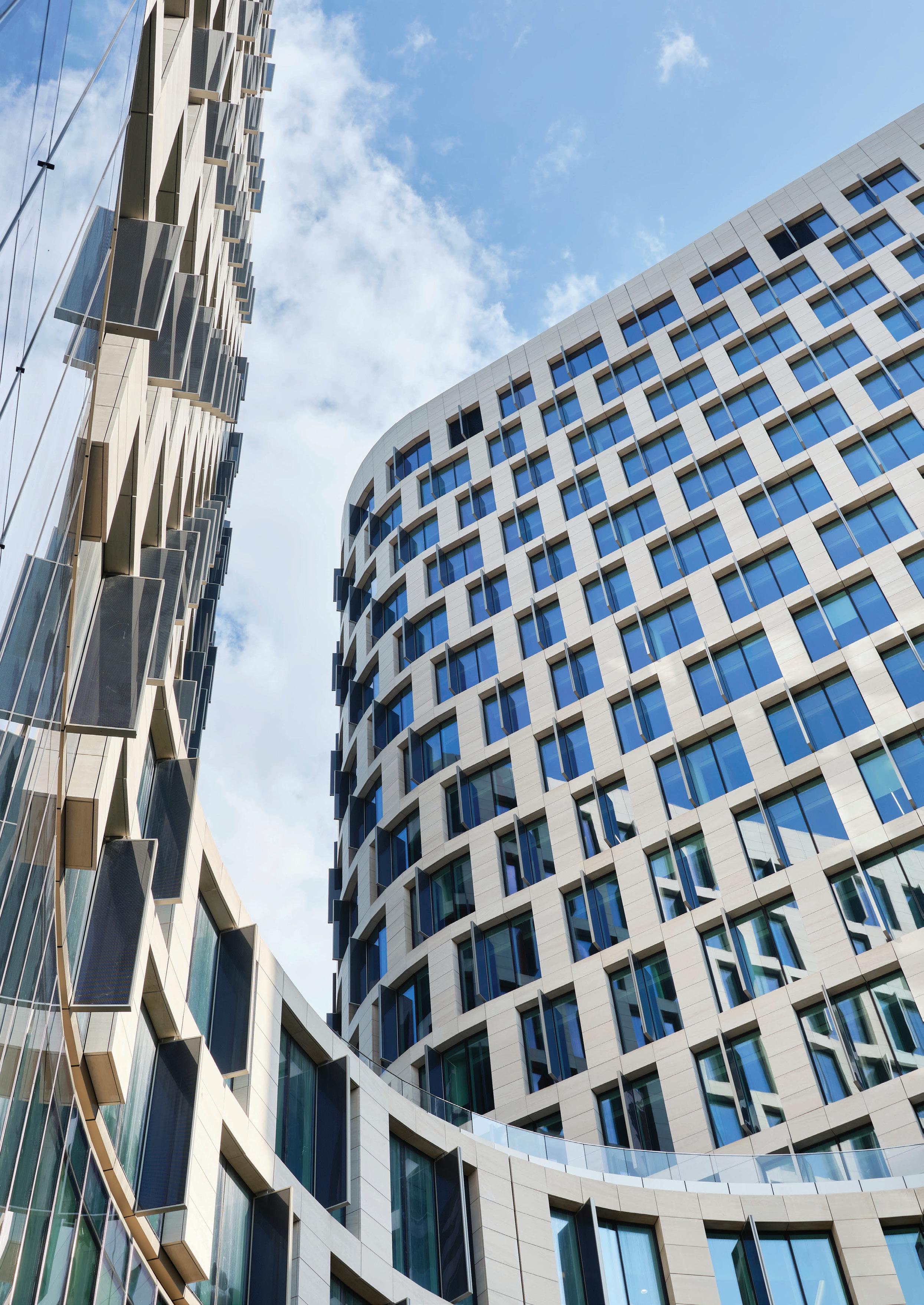
Sustainability
Quatuor
Photographer: ©Philippe Piraux
Architect: Jaspers Eyers Architects
Brussels, Belgium
label: BREEAM outstanding
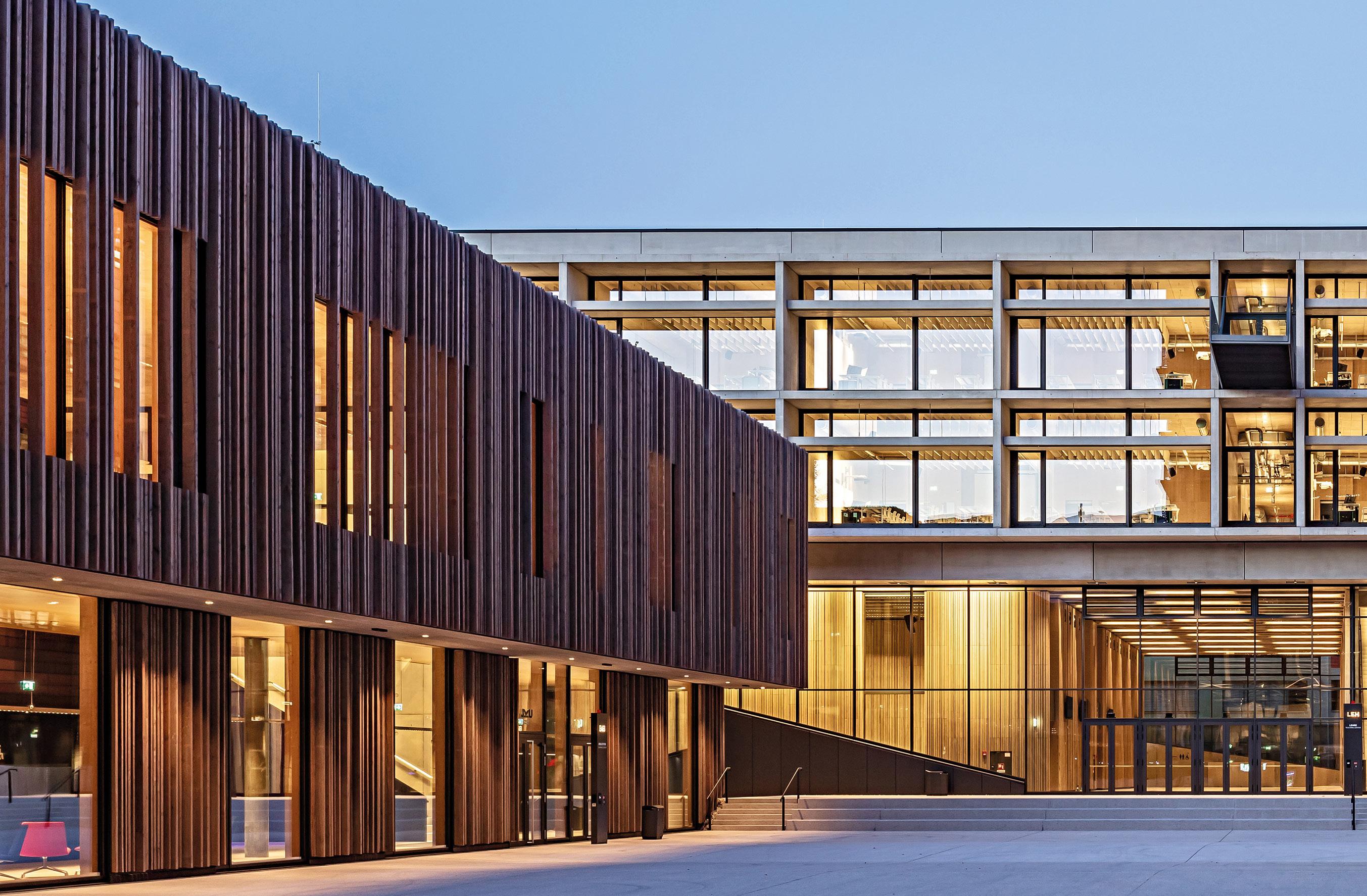
Our approach
Buildings consume a lot of energy. To reach our climate goals, we need to reduce that amount significantly. At Reynaers Group, we develop innovative products and services that have a positive impact on the energy efficiency, comfort, safety, circularity and long-term durability of buildings. To validate that positive impact, we ensure that our products obtain official sustainability certificates such as Passive House, Minergie, Cradle to Cradle®, etc. We look at sustainability labels on the project level too, such as BREEAM and LEED, and assist our partners in achieving the maximum of credits by integrating our products.
Designing sustainable buildings also requires knowledge. Architects, contractors, fabricators and our own employees need information on how to apply sustainable products in projects. Unfortunately, that information is not always readily available or digitally accessible, which makes it difficult to determine the environmental impact of a given building. Reynaers Group helps architects and contractors to make sustainable choices and reduce the negative impact of projects by providing clear information at the right time. We support and guide our partners towards a more sustainable approach in every step of the way.
Photographer: ©Martin Steinkellner
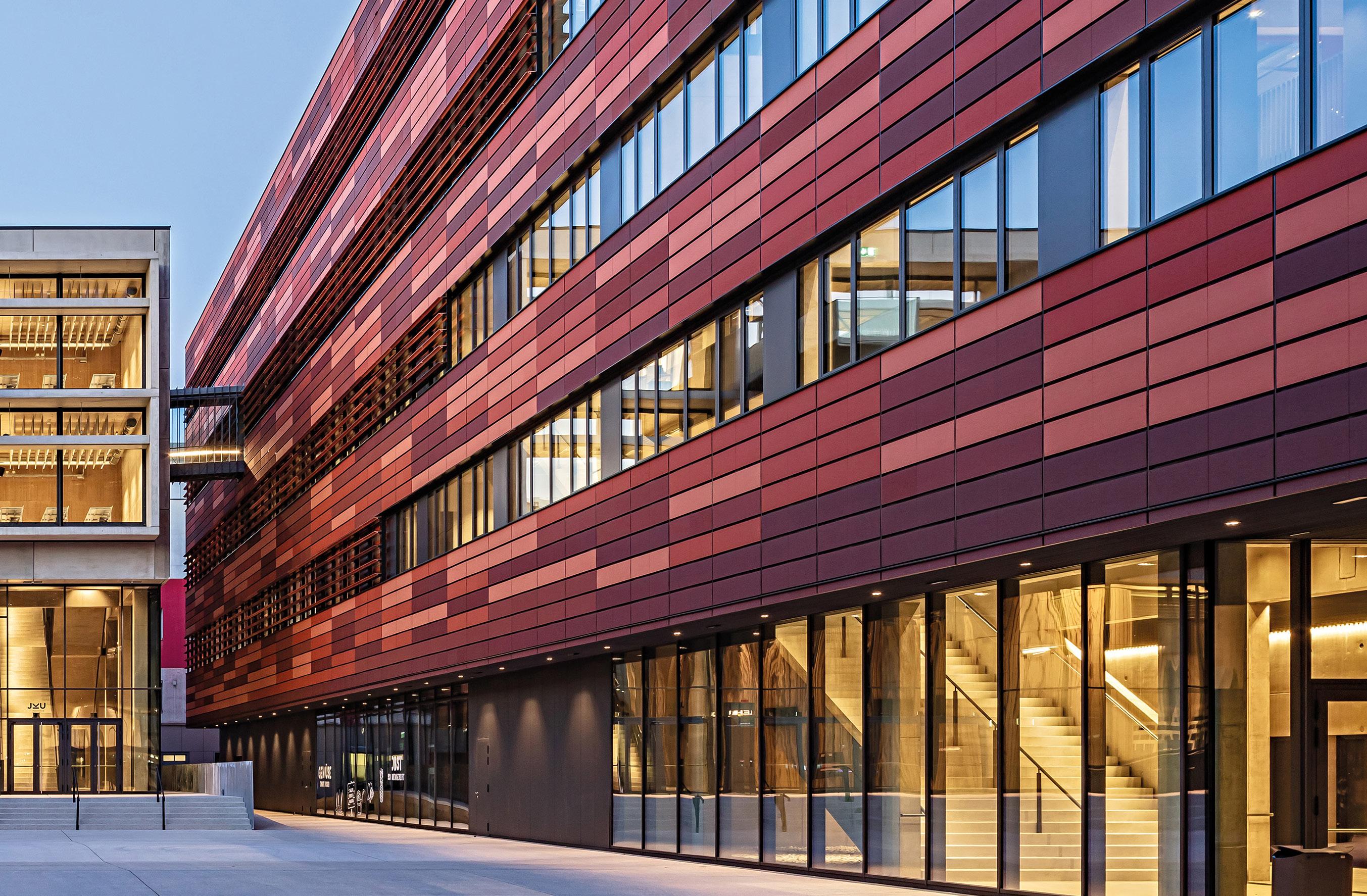
Our actions
Our company acts on three levels to help create more sustainable buildings:
I. Decarbonisation
First and foremost, we want to improve the energy efficiency and ecological footprint of buildings with low-carbon technology. In fact, eco-design plays a significant role in the reduction of the carbon emission levels of our products and of the buildings in which they are used. The model contributes to the decarbonisation of buildings by opting for energy-efficient materials and design alternatives.
A second important aspect in enabling decarbonisation is transparency. We regularly organise events and info sessions to share our knowledge and
highlight the optimal use of our systems. Additionally, we create informative documentation that explains our sustainable efforts in more detail.
Finally, carbon insights help raise decarbonisation in buildings too. To this end, in 2023, we developed a project CO2 calculator. The tool allows us to simulate, measure and monitor the carbon emissions of the aluminium content in our products. Thanks to the calculator, we can offer more accurate estimates of building’s ecological footprint and provide our partners with essential information on how to reduce their environmental impact.
Architect: Lorenzateliers ZT GmbH
Location: Linz, Austria
MedCampus
II. Circular buildings
The term ‘circular buildings’ has many definitions. Reynaers Group focusses on various subjects that relate to circularity, paying special attention to material health, repairability, modularity, design for disassembly and recyclability.
A good example of one of our circular research initiatives is Window of Circular Opportunity (WICO). A Reynaers Aluminium collaboration with VITO1) and Vrije Universiteit Brussels, which resulted in the publication of the guide ‘Circular opportunities of aluminium systems’ which defines design guides to evaluate the circular level of a building and offers improved solutions for aluminium windows, sliding doors and façade systems. We are planning to conduct new research on further circular solutions for our systems.
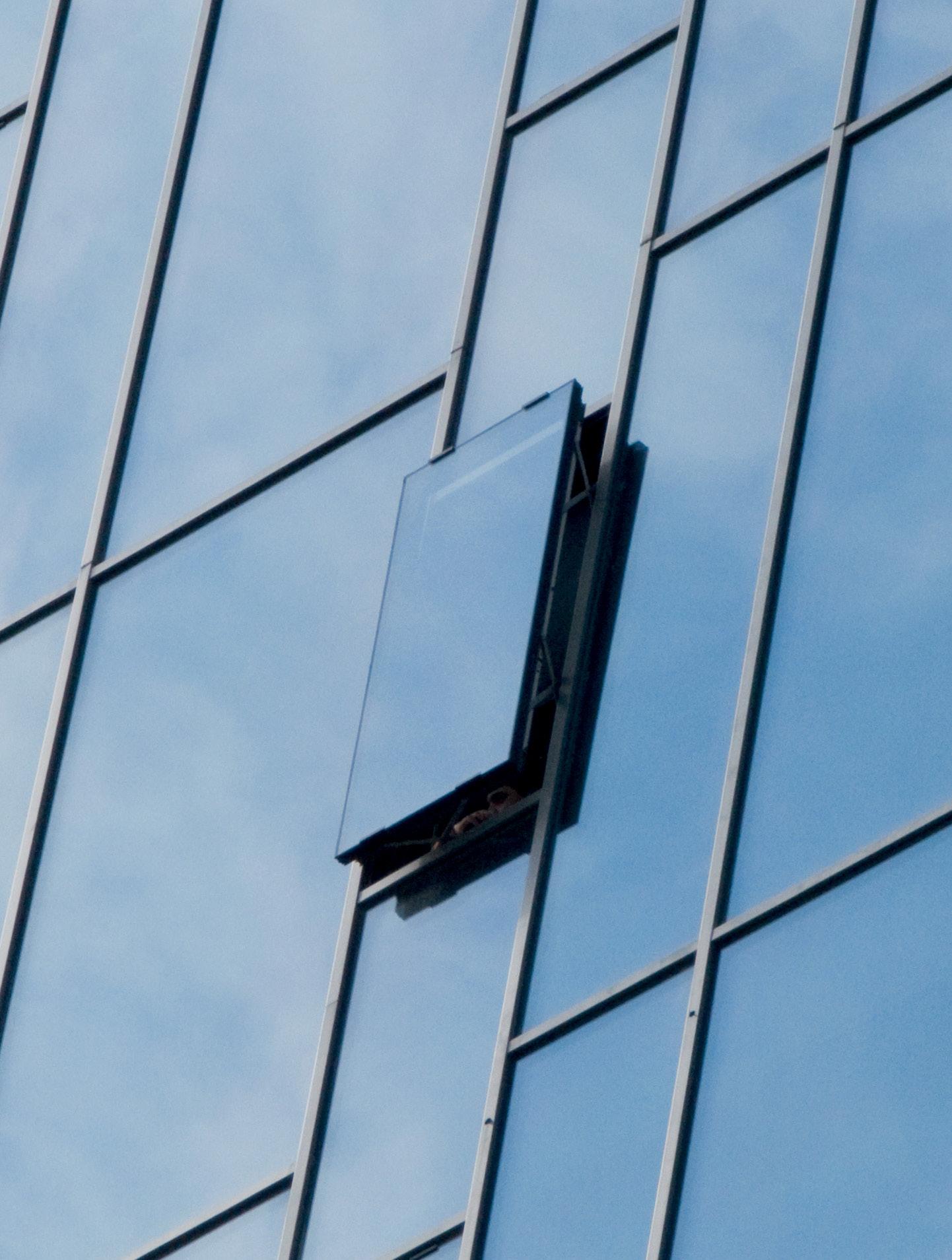
III. Comfort
Our aluminium and steel solutions enhance buildings’ comfort levels thanks to their innovative, energy-efficient and user-friendly design. The systems contribute to a pleasant indoor environment and help limit the building’s overall environmental impact.
By adopting a holistic approach to the heating, cooling and ventilation of building projects, Reynaers Group can effectively address comfort concerns such as overheating and indoor air quality. When linked to a building automation system, our systems proactively cool rooms through a combination of automatic opening window elements and mechanical ventilation.
1) Flemish institute for technological research (in Dutch: Vlaamse Instelling voor Technologisch Onderzoek)
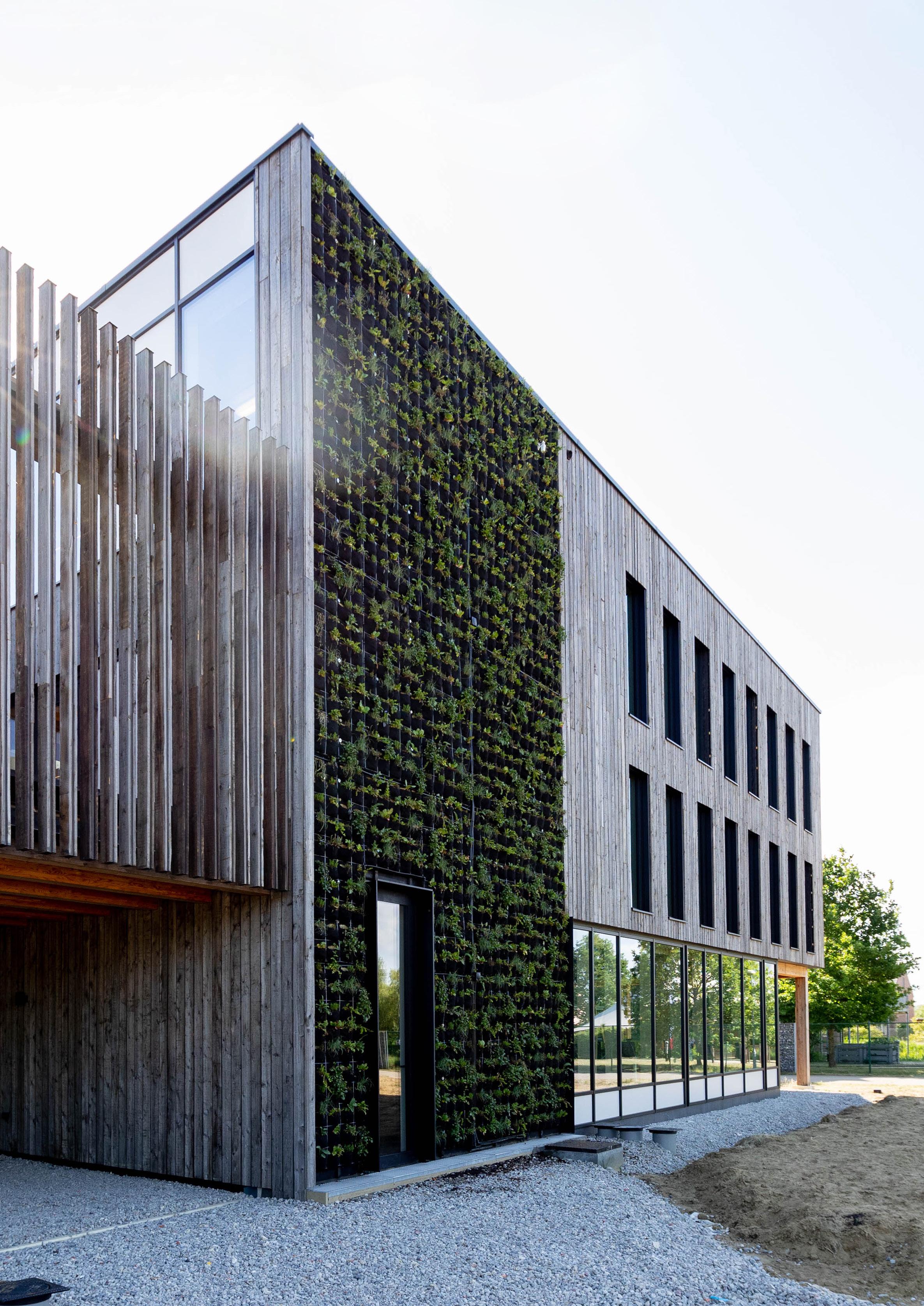
Photographer: ©Compagnie Fotografie
Architect: West Architectuur
Location: Westerlo, Belgium
't Centrum
ASML Building 3
Architect:
JHK Architecten; Architech Company
Targets
I. As of 2024, we commit to annually reviewing our product range to the requirements and criteria of several sustainable building certifications such as LEED and BREEAM.
II. As of 2023, we commit conducting at least one research project on sustainability per year, in order to grow and share our knowledge.
III. By 2025, we offer transparency regarding the environmental impact of our products and link it to Building Information Modelling (BIM) systems. As a result, our partners can make the right sustainable decisions during the design phase of their building.
Location: Veldhoven, The Netherlands
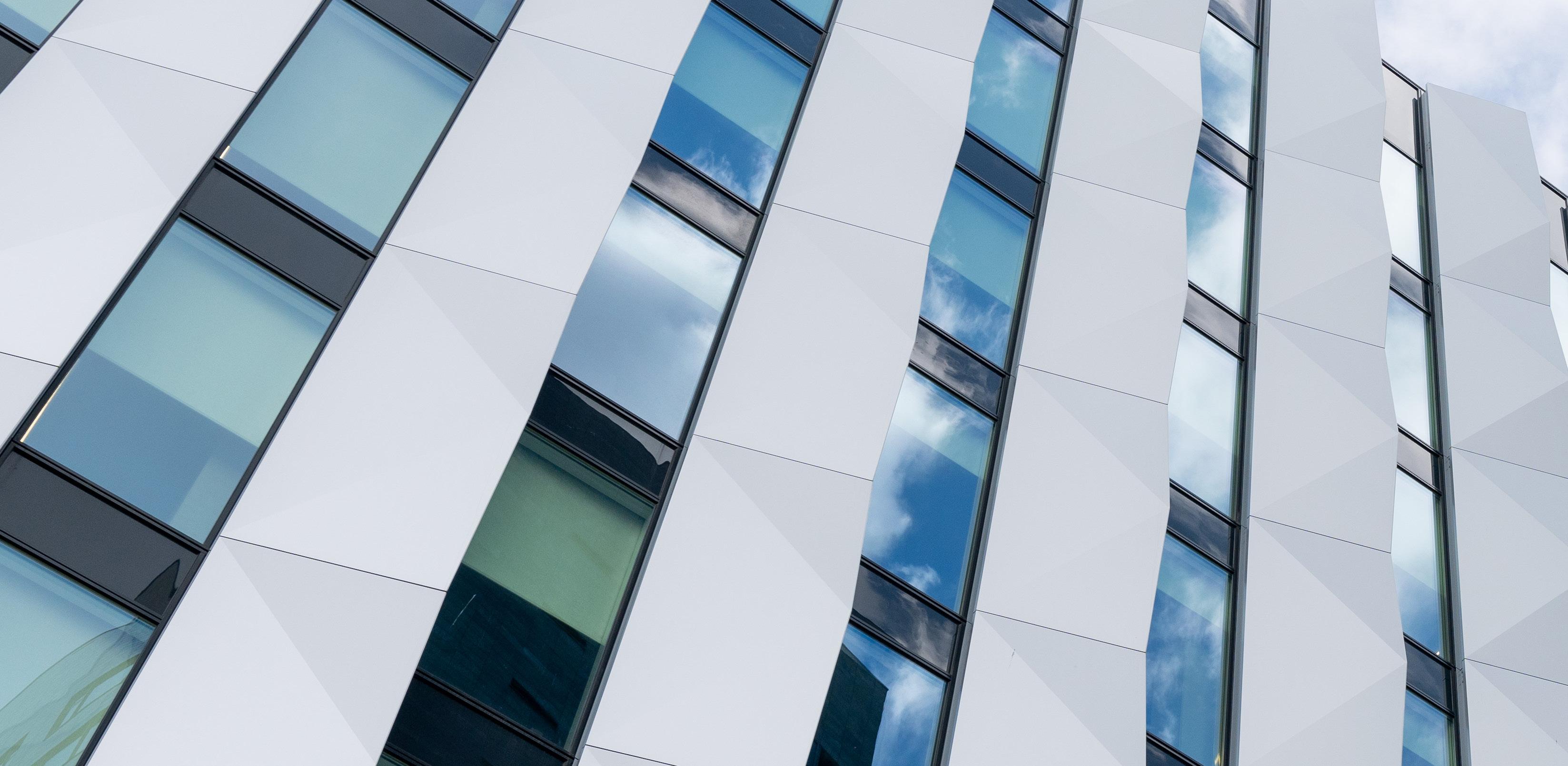
Sustainability label: BREEAM Excellent and WELL Gold
Our performance
Reynaers Group has already supported many buildings in reaching BREEAM and LEED certifications, including our own projects in Poland and Switzerland (see the following case study). We also offer a digital guide that provides our customers insights in the BREEAM and LEED certificate. In the coming years, we will maintain our focus on these topics to help our partners make sustainable choices.
Looking ahead, we are committed to further amplifying our sustainability initiatives. Our CO2 calculator will be enhanced with an EPD (Environmental Product Declaration) generator, which will describe the environmental performance of our products from a life cycle perspective. This extension will enable us to provide even greater transparency regarding the environmental footprint of our products in building projects.
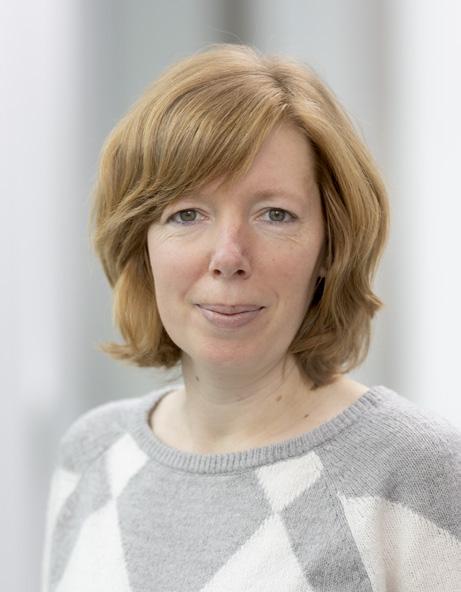
The EPD Generator will enable us to provide even greater transparency regarding the environmental footprint of our products. It will help our partners make more informed decisions on embodied carbon.
MARIJKE RYMENANTS - Sustainability Expert
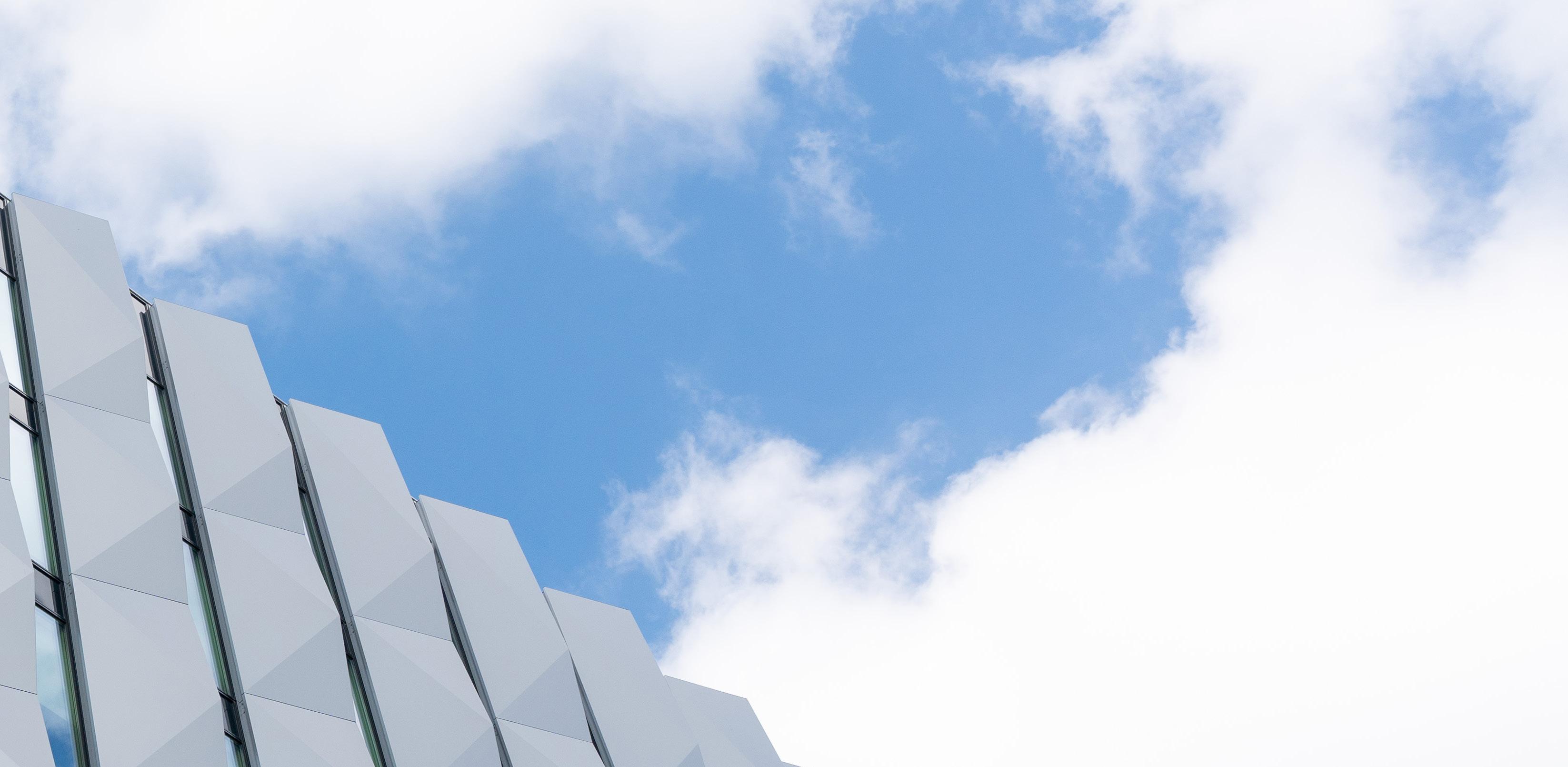
CASE STUDY
We walk the talk –Sustainable company buildings
When our company expands, we always take sustainable design into consideration. For instance, both the new Forster Campus in Switzerland and Reynaers Campus in Poland are lowenergy buildings, equipped with all the latest sustainable technologies.
The new Forster Campus in Romanshorn consists of a production area, office
building and technology centre. The entire building complex meets the LEED Gold sustainable building standard. What is more, the new office building is even LEED Platinum certified, making it the first commercial building in Switzerland that carries this very strict label. Nearly all the roofs are equipped with solar panels, generating an output of up to 1.5 megawatts to power the
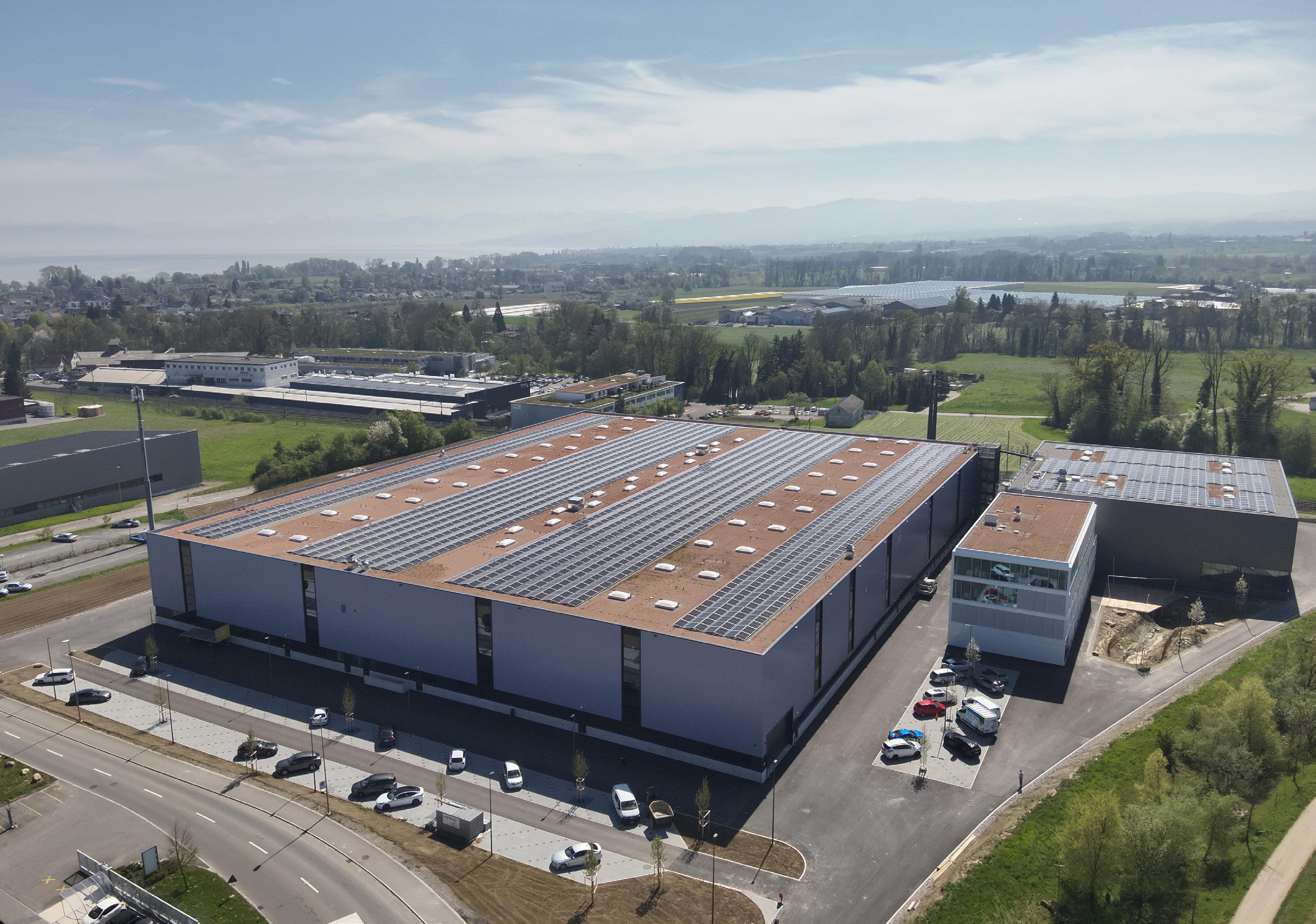
Forster Campus
Location: Romanshorn, Switzerland
Photo:
entire production process with green electricity. For the heating of the energyneutral building, we have installed heat pumps, which are a prerequisite for obtaining a LEED Gold certification.
The recently finished Polish campus is applying for a BREEAM ‘Excellent’ certificate. Home to Reynaers Aluminium Central Europe, the site limits its water
and energy consumption, and keeps CO2 emissions to a minimum. Part of the electricity requirements will be met by solar panels that will be installed on the roof. RCE Campus offers excellent employee comfort in terms of acoustics, air quality and access to natural light; heat pumps create comfortable indoor temperatures at the state-of-the-art office building.

Reynaers Central Europe Campus
Location: Przeszkoda, Poland
INTRODUCTION
Engaging Our People
Over the years, Reynaers Group has experienced tremendous growth. In terms of workforce, we have grown from around 100 employees in 1986 to over 2,650 today. Reynaers Group consists of more than 40 subsidiaries, and our global family keeps growing.
Today, we face challenges that prompt us to constantly evaluate and improve our approach to human resources. To tackle the war for talent, the war for hands and the rapidly changing working environment,
we aim to provide a motivating and attractive workplace. Our employees share their ideas for improvement, so we can create better working conditions together.
ENGAGING OUR PEOPLE
Lifelong learning and personal growth
• Lifelong learning
• Talent development
Healthy and safe place to work
• Safety and physical health
• Mental health
Empowering culture
• Employee engagement
• Entrepreneurship and innovation
• Diversity and inclusion
We are streamlining our global HR strategy as part of our ambition to be an empowering and caring employer who fosters employee engagement. We consider three complementary pillars.
First, we focus on the employee as an individual. Lifelong learning and talent development is encouraged every day, as it benefits individuals and the company alike. In this rapidly changing environment, it is essential that our staff have the opportunity to continuously enhance their skills and acquire new ones.
Next, we want to offer a safe and healthy workspace for all, where colleagues come together. Both physical and mental health are main focal points in this perspective, while safety is a collective responsibility throughout the company.
At Reynaers Group, we offer our employees a career instead of a job.
KATHLEEN DUPONT - CHRO

Finally, our daily way of working is characterised by a welcoming family culture and innovative entrepreneurship. Every day, Reynaers Group challenges the status quo with high-quality products and excellent services, which we offer as a united and passionate team. Respect, inclusion and mutual understanding are driving forces of our success.
Entrepreneurship and employee engagement are essential parts of this strategy. To continue our success story, we will retain our focus on the ‘Think Global, Act Local’ principle. Reynaers Group headquarters will draw up strategic guidelines at a global level and offer them to all our sites, while leaving room for the implementation of local action plans.
Lifelong learning and personal growth
LIFELONG LEARNING
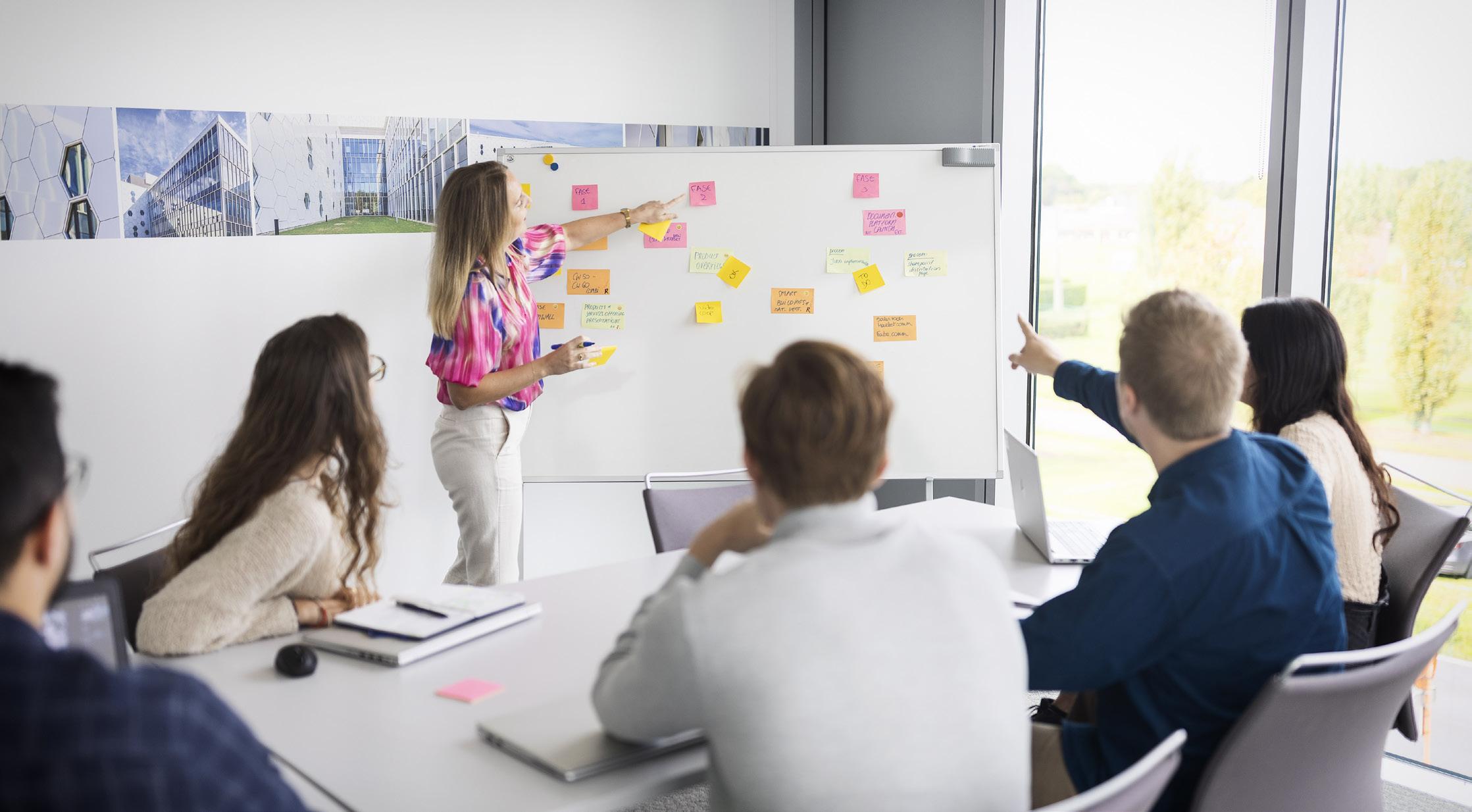
Why it matters
To keep up to date with all changes and evolutions in the working environment, we need to retrain and reskill our workforce continuously. Throughout their careers, Reynaers Group employees are offered tailor-made opportunities to develop their skills and competences. With a wide range of training programmes, we support our people in strengthening their lifelong employability.
Reynaers Group invests heavily in employee development, to meet both our own needs and those of our people. By being an attractive employer, we aim to strengthen our workforce and achieve good business results at the same time. A continuous learning culture is the best way to ensure that employees do their jobs well and willingly, both today and in the future.
Our approach
At Reynaers Group, we want our employees to be able to evolve in their jobs, while also growing as people. We help and encourage our staff to be resilient in a rapidly changing world, and we support employees in exploring their talents and improving their lifelong employability. To reach these goals, we are currently standardising our HR processes. These processes include attracting and onboarding new employees, personal development, and performance and reward cycles. To create the best employee experience, we are investing in the digitalisation of our HR processes as well.
With a company-wide minimum of one formal feedback session per employee per year, we can track our people’s performance as well as their growth and ideas. Employee engagement is an essential part of our business strategy and the centre point of a great career at Reynaers Group.
Since knowledge is key to our activities, we aim to learn and to share our knowhow. In various Reynaers Group training centres around the world, we organise product-related and service-oriented training courses. During these courses, our professional training teams introduce both partners and employees to our products and innovations in an interactive way.
Reynaers Group facilitates lifelong learning by offering a wide range of training programmes for all relevant stakeholders.
Over the last few years, we have gradually increased the number of training sessions. For instance, in 2023, the training team at Reynaers Campus provided a total of 1,937 training days, compared to 1,073 in 2014 – and the demand keeps on growing!
Our actions
As we go forward, we want to streamline, strengthen and expand our worldwide range of learning and development opportunities. To do this more systematically, we have launched a new HRIS (Human Resource Information System) platform. This platform consists of four modules: Learning, Recruitment, Performance and Succession. The learning module provides a structure for all our training and personal development programmes. These include functional
and technical courses, as well as training opportunities for soft skills. Our platform currently contains a wide array of e-learnings and is updated every month. Next to the mandatory learnings (such as the quarterly update on online security), we offer a wide variety of subjects, from safety training and GDPR to job-specific topics. In future, the platform will also feature a selflearning algorithm that can recommend new courses for every individual employee.
Targets
I. By 2025, we have rolled out a new learning platform in our strategical markets with an elaborate online training offering (e-learnings, instructional videos and live webinars).
II. By 2027, 80% of all employees follow at least three training sessions (classroom, e-learning, webinars …) per year.
CASE STUDY
HRIS implementation
HRIS specialist Sarah De Roode sees the new HRIS platform as a great opportunity: “We used to have a very scattered international HR environment. Markets looked at HQ for input and best practices, but they rarely had the right tools to implement them locally. To raise HR efficiency, we are rolling out the international platform to markets.”
“In 2021, we started the first functional analyses and by the end of 2022,
both Belux and the Netherlands went live with all four platform modules. Recently, other countries started using the basic performance module as well, bumping the activity rate up to 77% of our workforce. Our end goal is to align all markets, especially those with limited HR facilities. We want to offer accessible performance tools and tailor-made learning opportunities to all Reynaers Group employees.”
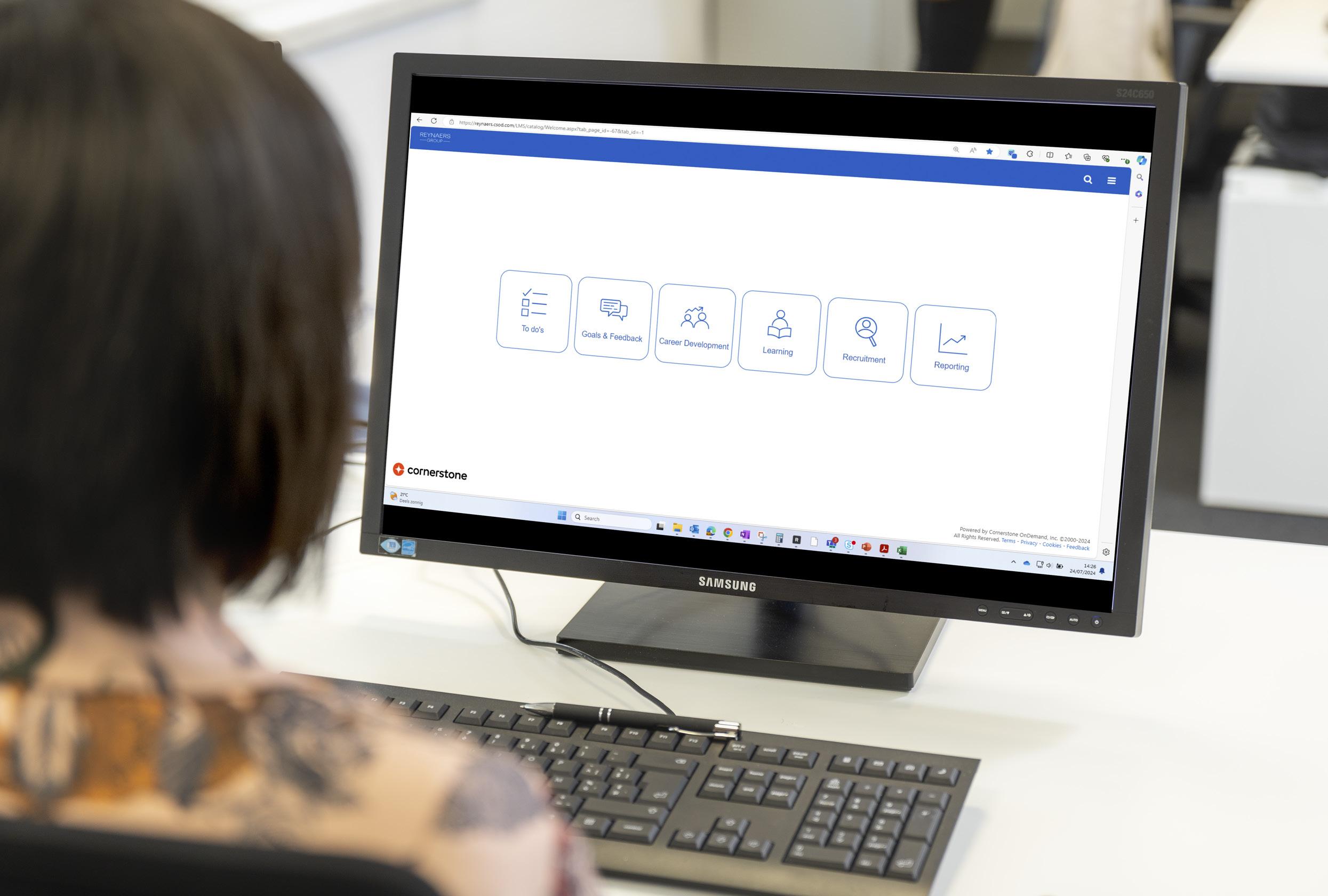
Our performance
The implementation of the Human Resources Information System (HRIS) started in Q1 of 2022 for our sites in Belgium and The Netherlands. In 2023, the platform was rolled out in other markets such as Poland, Ireland, France and the UK. As a result, already 77% of our workforce are currently using the platform. By the end of 2025, we want to make this tool available for our entire staff. We will track the number of training sessions per employee as part of our mission towards lifelong learning and personal development.
training metrics – financial year 20231)
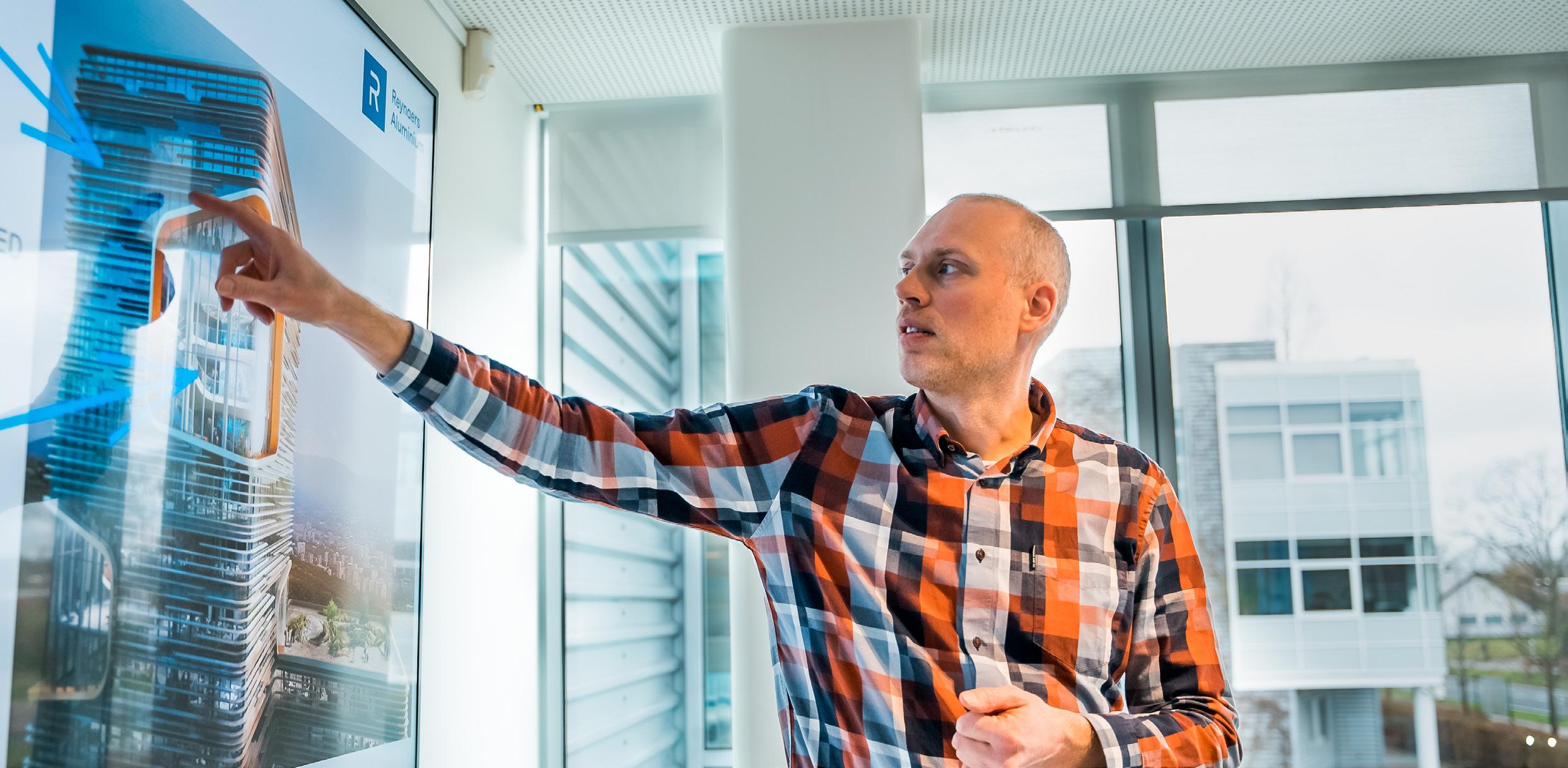
CSRD
TALENT DEVELOPMENT
Why it matters
In a world where the war for talent is omnipresent, employee retention is more important than ever. At our headquarters in Belgium, 50% of employees have a seniority of at least 10 years, while a quarter of our employees has been with the company for over 20 years. Nonetheless, it is crucial for our future operations to attract and to keep new talents within our organisation for a longer period of time as well.
We aim to engage all our employees and help them reach their full potential, whether it is as valuable team member or ambitious team leader. By offering a wide range of growth opportunities, we provide people not just with a job but with a real career at Reynaers Group.
Our approach
A positive learning culture benefits heavily from good leadership. At Reynaers Group, we believe that strong and talented leaders have a positive impact on the entire organisation. They guide their team (and our company) to long-term success by leading by example. That is why we have created the ‘Start2Lead’ programme for new team leaders. During this programme, employees in a new leadership role follow various training courses to develop their skills and learn how to strengthen their employees. By focusing on communication, teamwork and coaching, we maximise the potential of our leaders and our entire workforce.
We believe that strong leaders inspire their teams, guiding them to success and leading by example.
In addition, at Reynaers Campus, we organise an international Masterclass Business Strategy and Leadership every three years, which consists of a comprehensive mix of training and coaching programmes for aspiring leaders. The Masterclass is organised in collaboration with an external Business School and is aimed at our most talented and competent employees. It gives them the opportunity to further hone their management and communication skills. The next edition will be held in 2024.
Our actions
At Reynaers Group, we strongly believe in internal advancement and giving opportunities to all top talents. Upcoming leaders get the opportunity to create their own path, while we keep on training our current managers to help them face the ever-changing challenges of modern leadership. Managers today are instructed as possible mentors for aspiring leaders. In this sense, we apply the ‘Four Es of Leadership’ model.
• Education
• Experience
• Exposure
• Evaluation
With our new HRIS platform, we monitor both the performance and the potential of our employees. Through yearly evaluation and self-evaluation sessions, our employees can track their performance and discover new skills and talents they can develop. That way, we create a pool of multi-talented people who can add value in different teams within the company.
By offering our employees opportunities for internal advancement and multiple career perspectives, we create a culture of job longevity at Reynaers Group. We monitor our talents and offer them continuous challenges and development. On top of the yearly performance reviews, the talent evaluation process can support existing managers in discovering upcoming high potentials. Based on criteria such as cognitive and communicative skills, personal motivation and ambition, this method offers objective tools for team leaders to challenge (or confirm) their intuitive first estimate of the colleagues in consideration. Other sites will follow a similar way of working in the coming years.
Targets
I. By 2025, we have rolled out our Talent Pool Module in our strategical markets. Talents are defined by both their high performance and high potential.
II. By 2025, 80% of performance talks are administrated in the global HRIS platform.
III. By 2027, 100% of the senior management in our strategical markets participate in a leadership topic training.
Our performance
To track our perfomance we will monitor the implementation of the Talent Pool Module, gather yearly data on the trend in performance talks and on topic trainings for our senior management. CSRD performance and career development review metric – financial year 20231)
Healthy and safe place to work
SAFETY AND PHYSICAL HEALTH
Why it matters
We believe that a healthy and safe workplace is a fundamental requirement and also a driving force towards progress and growth. In the past years, we have witnessed a united effort to reinforce our commitment to creating a work environment that nurtures the well-being of our employees, aligning with our broader Environmental, Social, and Governance (ESG) initiatives. We understand that ensuring a healthy and safe place to work goes beyond mere compliance. It is a testimony to our values and an essential element of our corporate identity.
Safety is more than a set of rules and regulations; it is essential when nurturing innovation, fostering collaboration and driving productivity.

Our approach
Since 2022, Reynaers Group implements a group policy on Health, Safety and Environment (HS&E). With this framework, we aim to improve our HS&E performance and become best in class. The CEO and the Group Management Team determine the policy and provide leadership for HS&E activities in our organisation. The local management teams are responsible for the health and safety of their employees and the performance of the local HS&E management system. To monitor our progress, all entities are audited on a regular basis. Over the next years, we will implement the new policy in all our strategical operations.
With the launch of our Group policy comes a Group HS&E Management Manual. This guide ensures a practical implementation of the group policy. By introducing a group document structure and explaining the scope and responsibilities regarding these documents, we create a framework to improve the Group HS&E level. The uniform approach will promote the implementation of group guidelines. It encourages people to share information and knowledge and makes standardised monitoring possible.
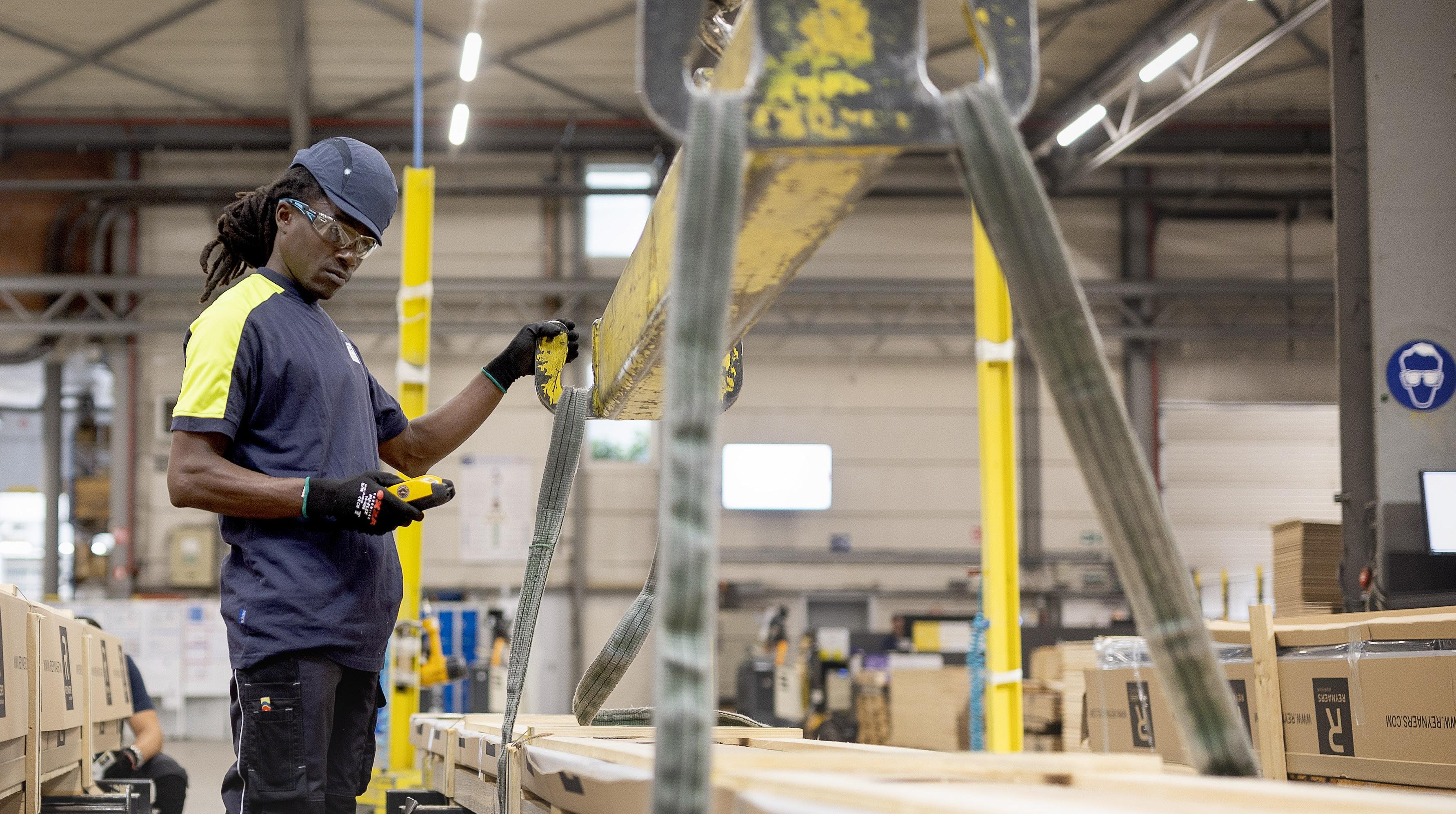
Our actions
To adjust our approach as necessary, we closely monitor workplace safety data. In 2023, we established a global safety dashboard that includes data from all our strategic operations. We have also evolved from monitoring only permanent employees to including temporary employees in our safety figures too.
We register all types of incidents and analyse them for continuous safety improvement. Our monitoring system allows us to detect positive and negative trends and we compare data between our sites. The new dashboard tracks more than 10 different leading and lagging KPIs for our own employees, temporary workers and contractors.
Since the new dashboard was launched in 2023, that year will serve as a preliminary reference point. In the future, we will monitor our KPIs and define our targets accordingly.
We are building an international knowledge network, where local HS&E best practices are shared periodically. Furthermore, we have launched a global internal safety campaign in 2023. With our ‘’We are SAFE. A pact we respect, together’’ campaign, we create awareness among staff and strongly embed the new HS&E group policy in our entire organisation.
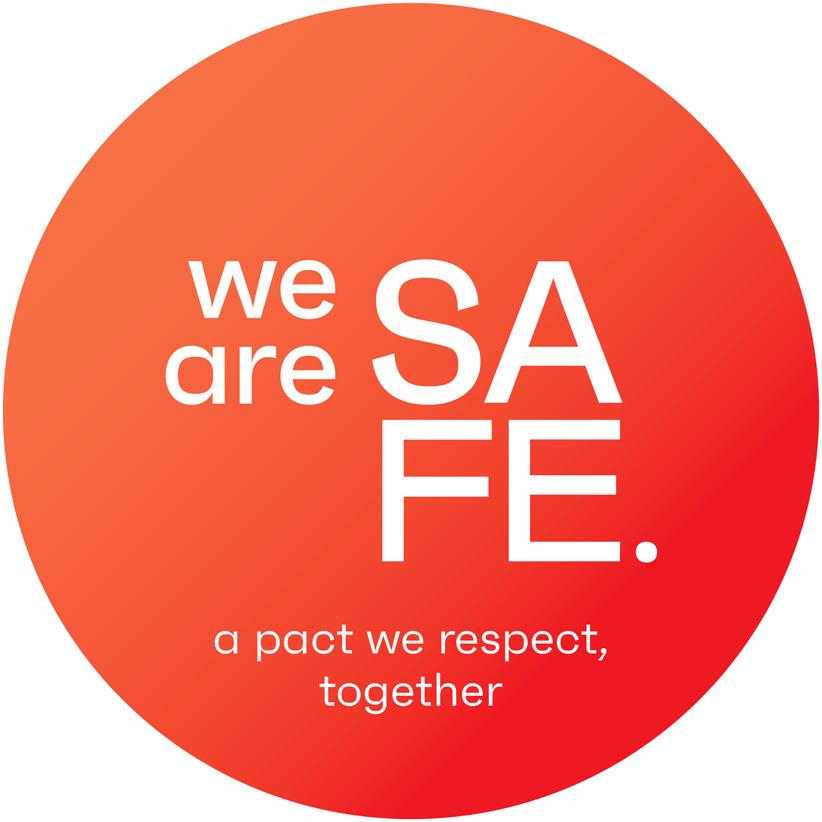
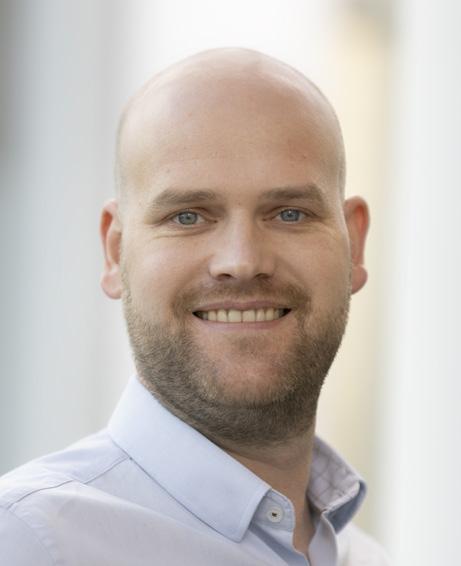
Monitoring HS&E data allows us to learn important lessons, share them throughout the group and grow towards a safe workplace.
DAVY VERCAMMEN - Group
HS&E
Manager
CASE STUDY
''We are SAFE. A pact we respect, together''
The focus of the internal communication campaign is to create awareness about 20 safety principles we believe are crucial for a safe, healthy and pleasant working environment. With these principles we work around five key messages which were launched in different communication waves:
• Creating and guaranteeing a safe working environment
• Being alert to safety risks and dangerous situations
• Protecting yourself and your colleagues
• Safe use of tools, machines and vehicles
• Following HS&E guidelines and rules
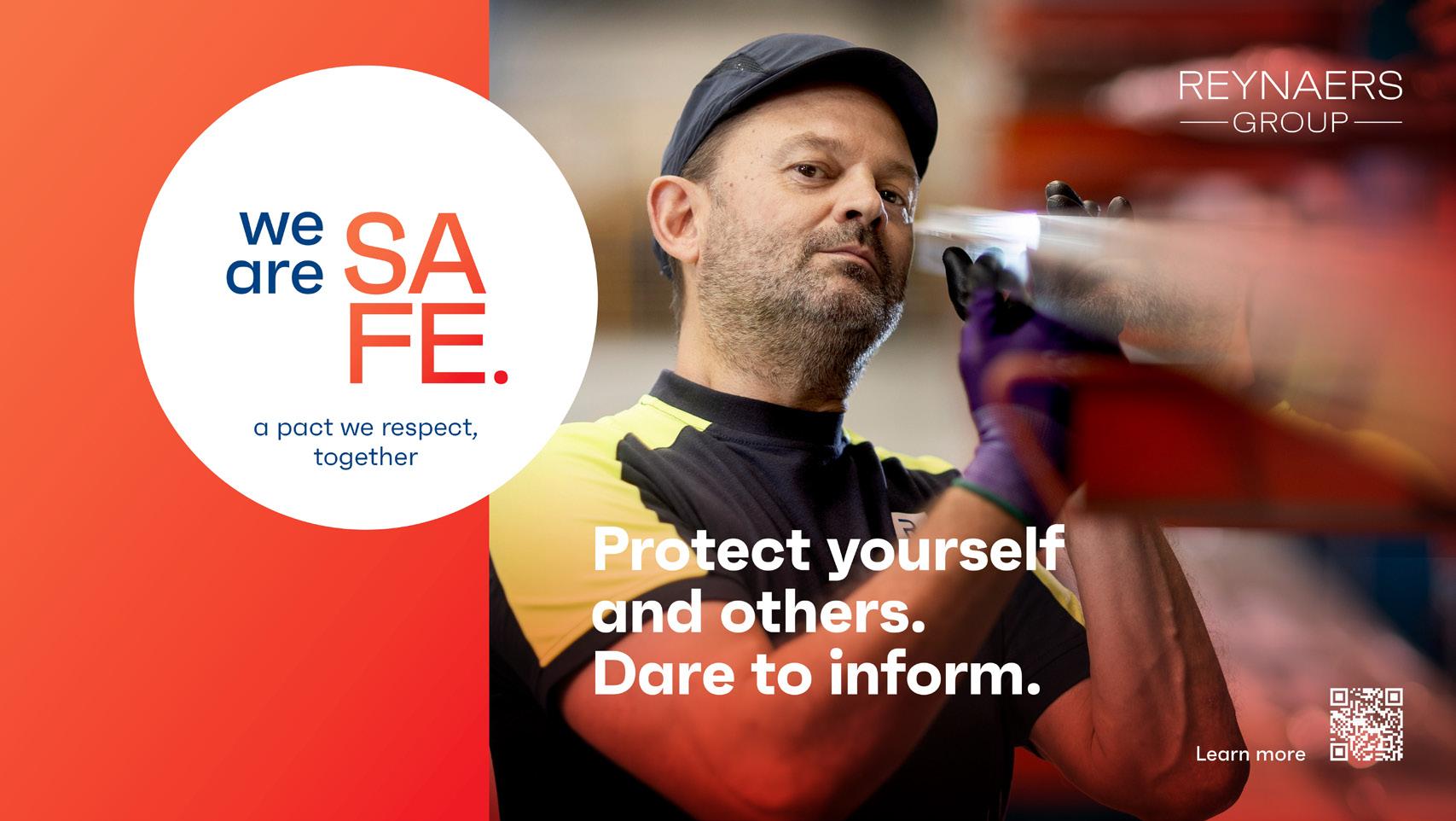
Targets
I. By 2024, Reynaers Group has defined a global HS&E strategy. By 2025, all major (12) facilities have implemented the global HS&E strategy in their local management systems.
II. By 2025, we have set up group KPIs and local KPIs, based on their past performance and group strategy.
Our performance
All key factors related to Health & Safety are mapped, defined and added to the HS&E dashboard. Starting from 2023, we are following up on these items periodically for the whole Reynaers Group. This allows us to set clear objectives for the upcoming years.
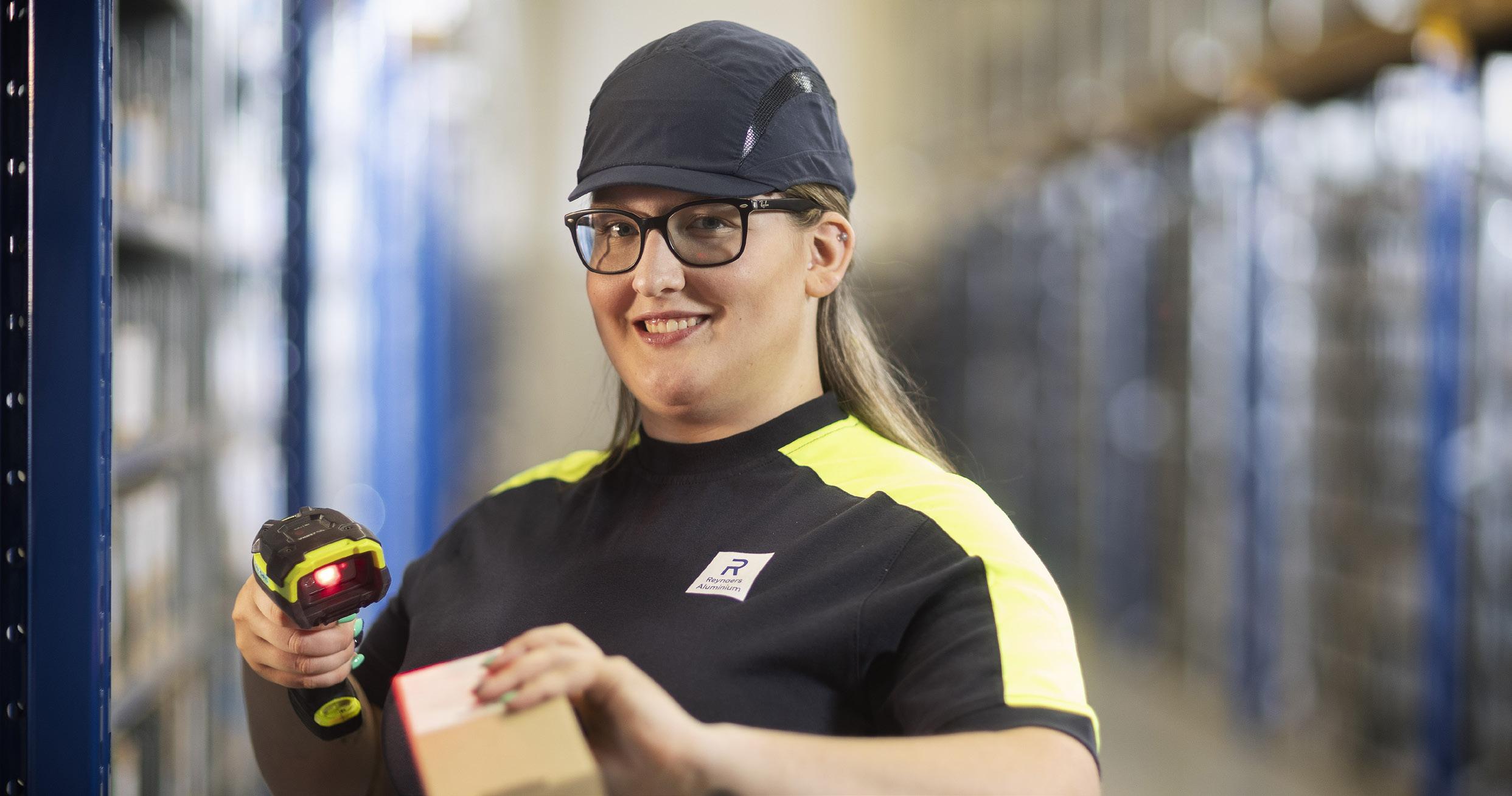
MENTAL HEALTH
Why it matters
Well-being is not just vital for our employees’ overall health, personal performances, and growth. It also plays a critical role in the professional performance and success of the entire Reynaers Group. When we feel mentally healthy, we enjoy life more, cope better with setbacks, feel more accomplished and are more satisfied. Not only do you notice it yourself; your close environment will notice it too. So it is very important to pay attention to this topic as a business.
Our approach
To reinforce our colleagues and allow them to carry out their work in a safe and healthy way, we actively promote a culture of feedback and appreciation. Supported by all leaders, this culture will contribute to a good working environment for everyone. We track current workplace trends anonymously via our employee satisfaction survey and offer training and team support to do better.
We aim to prevent work-related illness and have established efficient ‘return to work’ programmes. We recognise and manage work-related stress and other psychosocial risks. Through various internal promotion campaigns, we aim to create a healthier workplace together.
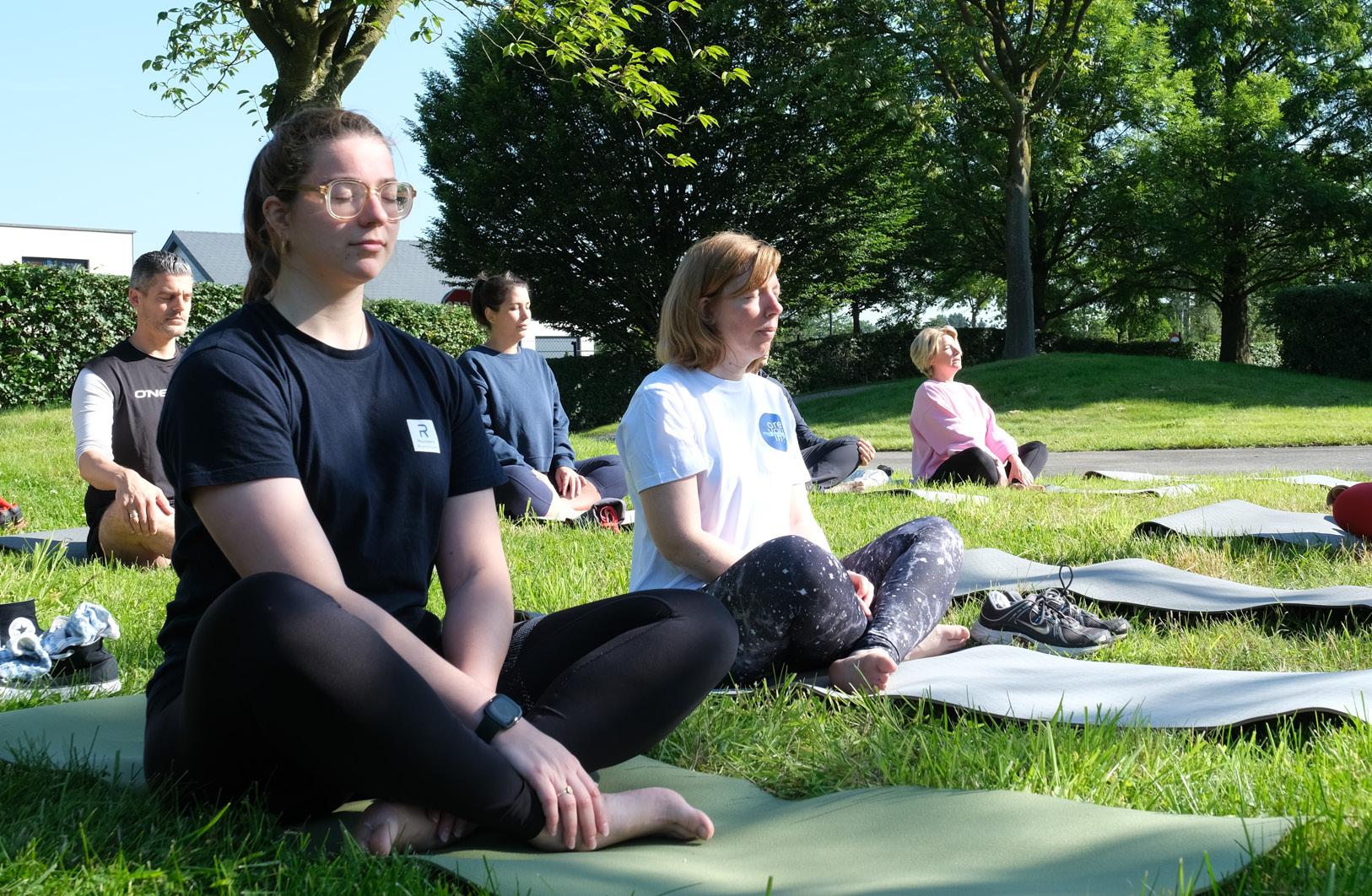
Next, we are strongly committed to a good work-life balance for our employees. We offer flexible working hours and the opportunity to work from home. However, we do ask our white-collar employees to come into the office on a regular basis. Reynaers Group is convinced that working in the office contributes to a better work atmosphere, stimulates personal development and ultimately contributes to a better operation of the company as a whole.
Our actions
In our last employee survey, we made extensive enquiries about our teams’ mental health. The outcome of this survey, which was filled out by 2,022 people, will serve as a baseline for improvements in the coming years. In addition to the survey, we monitor KPIs such as the number of long-term illnesses and the number of complaints made to the confidential advisor. All these data will help us to protect the mental health of our employees in the future. Also, following the results of the employee survey, we will draw up action plans with a specific focus on mental health.
Targets
I. By 2025, we monitor the mental health indicators included in our bi-annual engagement survey (compared to 2023 base year).
II. By 2025, all our strategic markets have a formal confidant counsellor in place.
Our performance
The bi-annual ‘Together for the Best’ employee engagement survey will offer us insightful data that is related to the Mental Health Index.
Empowering culture
EMPLOYEE ENGAGEMENT
Why it matters
Unemployment rates are lower than ever and finding that one perfect colleague for the job becomes even more challenging.
More than ever, we need to listen to our colleagues and act on our baseline ‘Together for Better’. Having strong leaders who listen to their teams and engage with them not only increases the satisfaction and performance, but also builds stronger relationships. It is all about building and retaining an engaging culture.
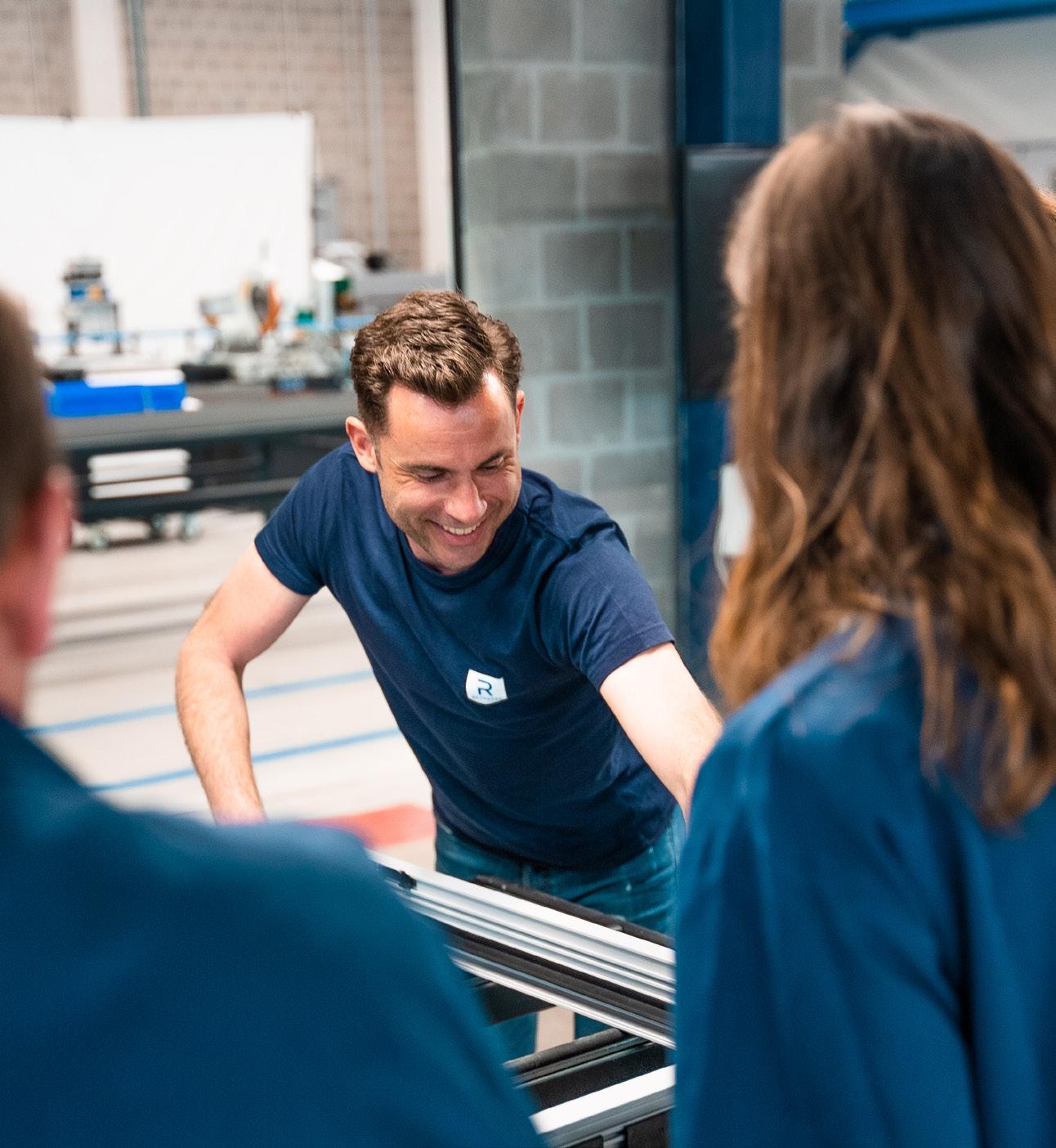
Empowering our employees will lead to great job satisfaction, and it makes them go the extra mile for our customers.
HR Business Partner
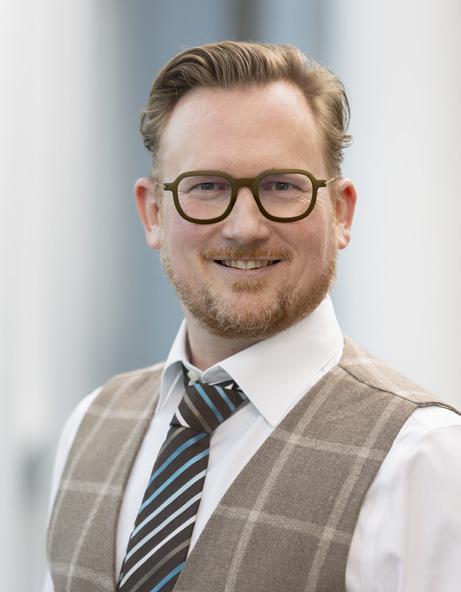
MICHAËL SCHELFHOUT - VAN 'T VEEN -
Our approach
Employee engagement starts with a positive hiring process. Good recruitment is more than filling a job opening: a ‘match’ between the job and the person is vital to safeguard a long-term and sustainable career. Our group-wide onboarding process ensures that all new employees get off to a good start.
Once people are on board, we are strongly committed to their career development. We offer opportunities for internal job rotation, experiences abroad and growth options. To allow our employees to further develop themselves, we focus on lifelong learning and personal growth. Finally, communication is also essential to increase employee engagement. With proper communication, employees start to identify themselves with the company’s vision, values, and goals.
Our actions
One of the formal ways to gauge employee engagement is our worldwide employee satisfaction survey, ‘Together for the Best’, which is available in 10 languages. The survey ensures that our employees can speak up and feel empowered and engaged. It also provides valuable insights into our performance as an employer. We have conducted this survey every two years since 2012 and have gradually incorporated new and important themes. In the 2023 survey, for example, we added questions about inclusion and diversity as new focal points.
The response rate to our survey has consistently been very high (86% in 2021 and 2023). We are proud to see positive ratings in terms of employee engagement. We express these ratings in the Employee
Satisfaction score, which covers the following key engagement dimensions:
• Trust
• Connectedness
• Pride
• Challenge
• Perform
• Stay
After each survey, all our local teams analyse their results and develop new action plans. To encourage improvements, we ask each site to prepare six action plans: three to consolidate good results and three to improve the least performing topics.
Targets
I. Our Employee Satisfaction score remains at or above 80% in the bi-yearly employee survey.
Our performance
The Employee Satisfaction score at Reynaers Group in 2023 is 85%, which is above our benchmark of 80%. Compared to 2021, we see that five indices remain stable and above the set targets. We did notice a drop in the Stay Index from 80 down to 74, but this result still exceeds the benchmark. A future deep dive into this index will offer valuable insights and bring possible underlying trends to light for all markets.
ENTREPRENEURSHIP AND INNOVATION
Why it matters
Giving it our all, going the extra mile for our partners: it is what defines Reynaers Group as a passionate and futureoriented company. We are innovative entrepreneurs who continuously challenge the status quo and aim to push forward. ‘Together for better’ is our motto, and we apply this philosophy in everything we do.
Our approach
Entrepreneurship and innovation permeate all our business strategies and are major drivers of our growth. We maintain a good balance between a culture of entrepreneurship (at individual and business unit level) and effective steering processes (at group level). The ‘Think Global, Act Local’ principle is a key feature of our business strategy. Innovation also constitutes one of our key values, under the heading of Daring.
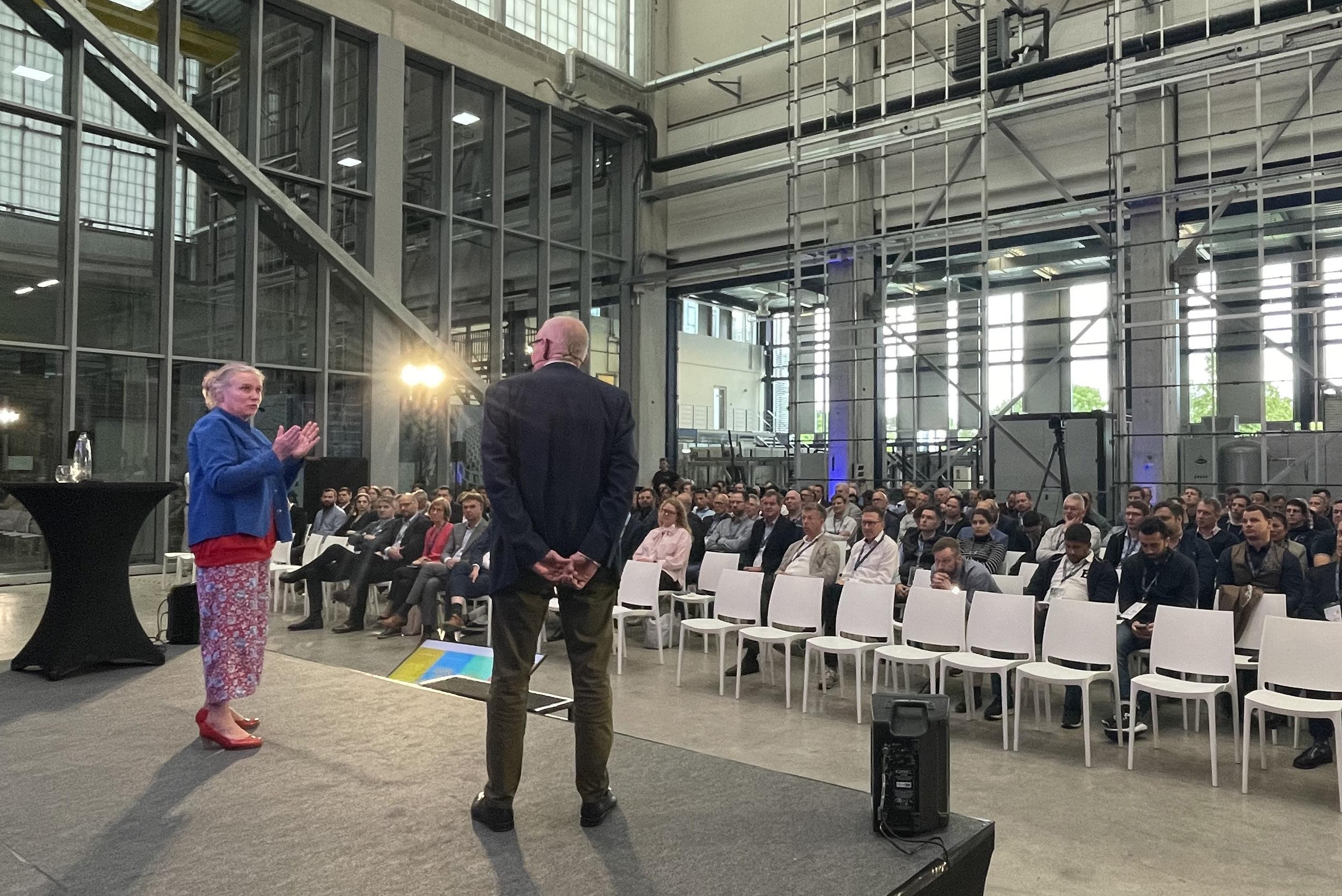
Our actions
To promote innovation at all business levels, we annually organise a call for ideas and projects. The best ideas are selected and incorporated into an innovation project, where the employee becomes part of a project team. This bottom-up method offers all our employees the opportunity to share their ideas and help our company move forward.
We also organise annual functional days at Reynaers Campus, our headquarters in Belgium. These events each focus on one specific pillar within our company operations, such as Quality, HS&E, Marketing and more. Specialised colleagues from all over the world come together to share information, attend workshops and discuss various subjects in an open and inspiring environment.
CASE STUDY
Bringing ideas to life: an employee initiative
At Reynaers Group, we greatly value the ideas of all our employees to improve our business. The launch of Connect is a prime example of such an employee-driven initiative coming to fruition.
Connect is our new internal news platform for sharing stories about new projects won, new product innovations, employee milestones, and more, reaching all our employees worldwide. Communicating these achievements and celebrating positive news are inherent parts of our family values. They play a pivotal role in inspiring our employees.
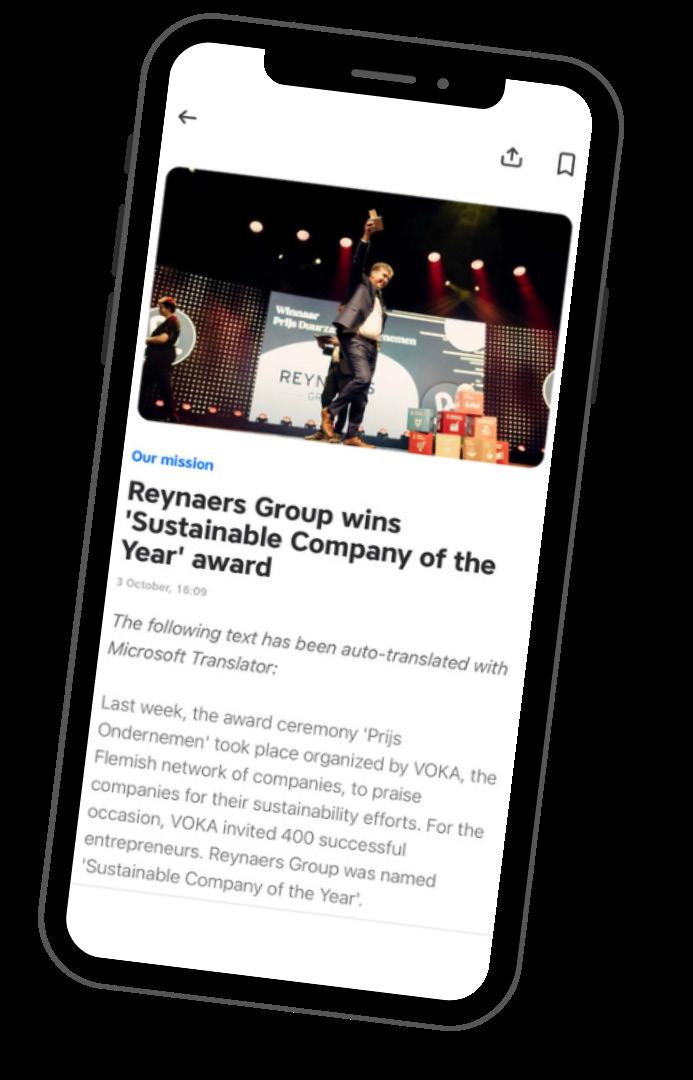
DIVERSITY AND INCLUSION
Why it matters
Reynaers Group employs people from dozens of different backgrounds, cultures and personalities. To respect these differences, it is our duty to create a diverse and inclusive working environment where all our employees can be themselves and feel safe and trusted. This philosophy is central to our company’s family values.
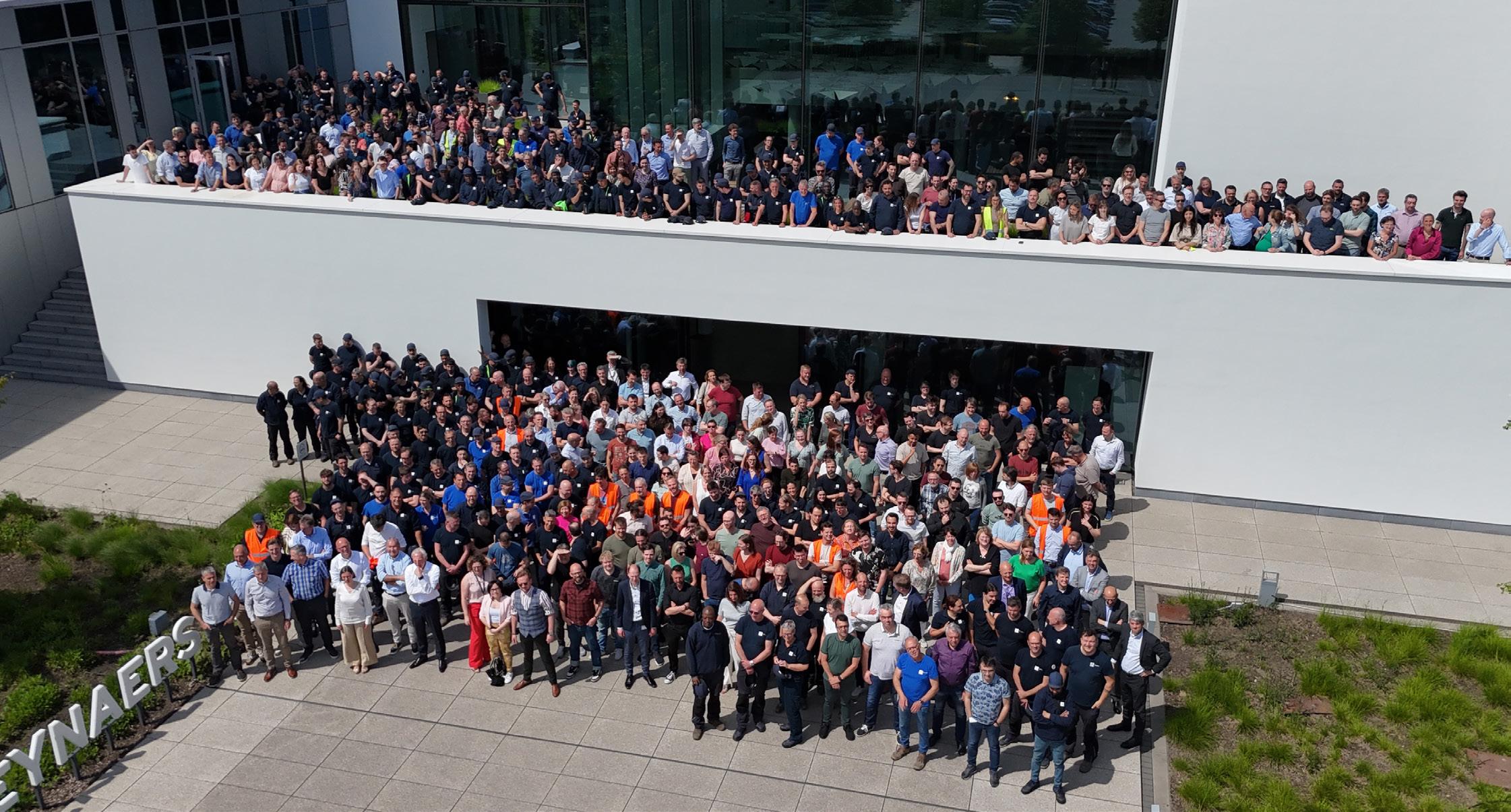
Inclusion is diversity in action. It is about valuing people’s unique ideas and experiences and ensuring their voices are heard. At Reynaers Group, we are aware that people perceive and experience the world in different ways. We focus on creating an inclusive working environment where colleagues feel safe and empowered. An inclusive environment promotes and sustains a sense of belonging and is therefore very closely linked to our principle of employee engagement, the foundation of our HR strategy. Inclusion translates to greater productivity, better teamwork and better decision-making.
CSRD diversity metrics – financial year 20231)
Our actions
Our group-wide onboarding process is the first step in creating an inclusive workplace. By actively promoting respect and togetherness, our employees are more likely to enjoy their jobs, stay engaged and build a career at Reynaers Group. At the same time, our attention to diversity and inclusion results in interesting insights and ideas, that can be used to optimise our processes and better serve our customers. Diversity is about welcoming differences, both visible and invisible, and promoting a wide range of different perspectives in our day-to-day business. Reynaers Group aims for diversity, valuing all individuals, without any form of discrimination.
In addition to diversity in terms of culture, gender, sexual orientation and faith, we are also strongly committed to age diversity. Thanks to a fair mix of young and more experienced talents, we try to futureproof our organisation and prepare it for the challenges of tomorrow. This principle is also fully in line with our focus on internal flow and long-term careers. We offer every employee the opportunity to grow and set out their professional journey.
Graph: Gender distribution
Graph: Age distribution
Targets
I. By 2025, we monitor the D&I indicators included in our bi-annual engagement survey (compared to 2023 base year) and act accordingly.
II. By 2025, we monitor the gender pay gap in our strategic markets and we close that gap in the upcoming years.
Our performance
The bi-annual ‘Together for the Best’ employee engagement survey will offer us insightful data that is related to Diversity and Inclusion variables. We will also measure the trend in gender pay gap in the next years.

Table: Employee turnover (head count at year-end)
Table: Characteristics
Graph: Work-life balance: family related leaves (head count at year-end)
Graph: Work-life balance: family related leaves (head count at year-end)
INTRODUCTION
Taking responsibility towards society
As a family-owned organisation, we recognise our impact on society and acknowledge our obligation to make a positive contribution. By actively engaging with our communities and upholding ethical practices throughout our value chain, we aim to have a positive impact. Moreover, we foster trust among all our partners, up and down the value chain. These commitments align with our strategic goals and our pursuit of long-term sustainability.
Ethical and responsible business
• Ethical behaviour
• Healthy and sustainable business growth
• Sustainability strategy and risk management
• Local communities (philantrophy)
TAKING RESPONSIBILITY TOWARDS SOCIETY
Responsible procurement and due diligence
• Responsible procurement and supply chain management
• Biodiversity and water management in the value chain
Transparency, traceability and communication
• Transparency and reporting
• Traceability
• Dialogue with stakeholders
Island Rest
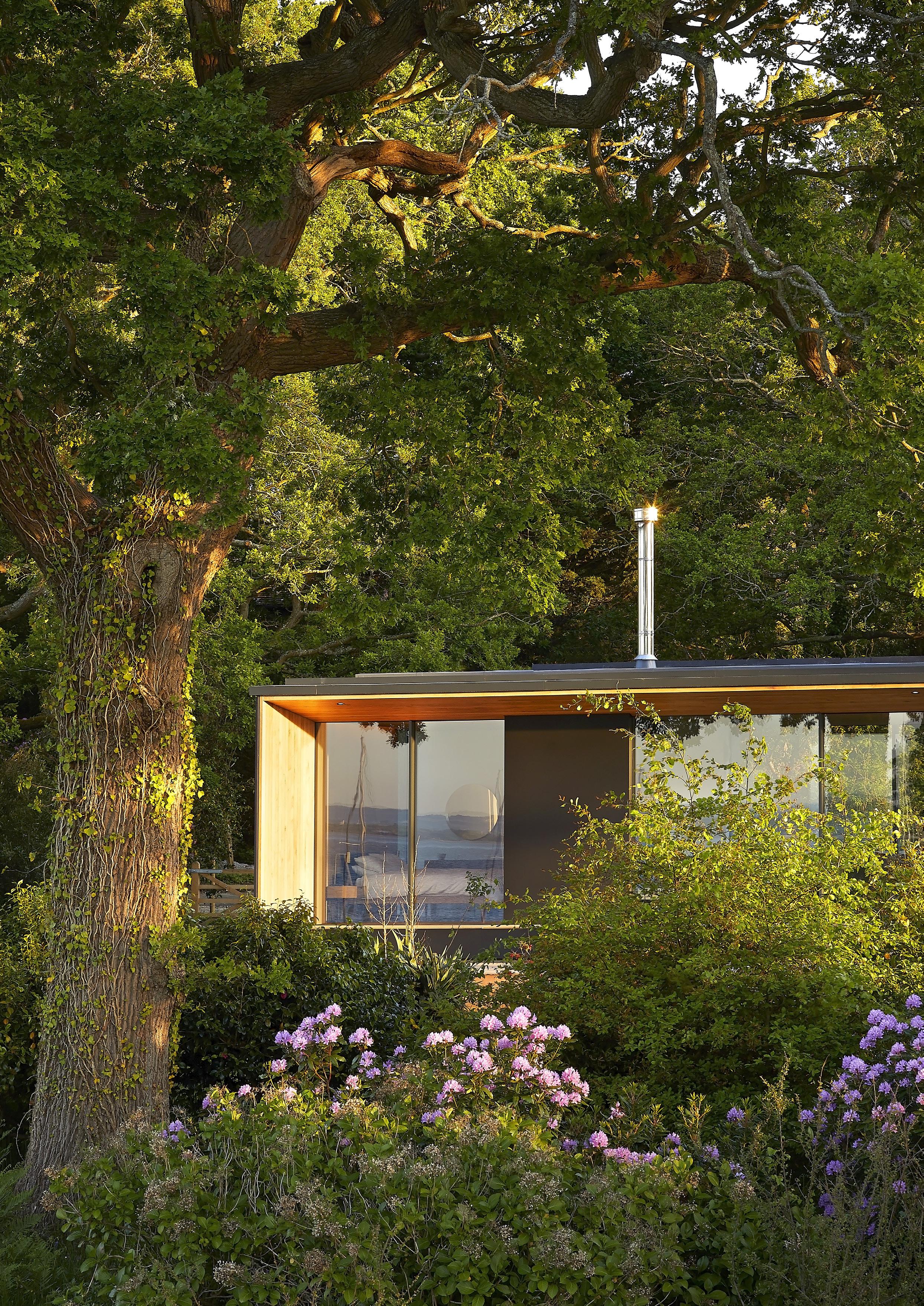
Location: Isle of Wight, United Kingdom
Architect: Strom Architects
Photographer:
Ethical and responsible business
ACTING ETHICALLY
Why it matters
We are fully aware of the responsibility we have towards our employees, suppliers, shareholders, commercial partners and the communities in which we work. We take steps to ensure that all individuals acting on behalf of or for the account of Reynaers Group worldwide perform their activities ethically and in accordance with legislation, regulations and our own policies and guidelines.
Our approach
To ensure ethical business behaviour throughout the organisation, we have created an official Code of Conduct. This charter applies to all our employees worldwide, including temporary personnel, as well as to all our suppliers and subcontractors. The document specifies various rules to achieve ethical business behaviour:
• We respect our employees and business partners and treat them fairly.
• We guarantee the principles of fair competition and a free market. Corruption and infringement of antitrust laws are not tolerated.
• We respect natural resources and adhere to environmental laws to ensure sustainable economic business and to avoid environmental risks.
• We respect data protection, intellectual property and privacy laws.
• We comply with all relevant laws, policies and regulations.
Our actions
Our commitment to ethical practices goes further than having a Code of Conduct. To embed ethical business principles in our entire organisation, we have implemented additional systems, including the Four Eyes Principle1) and a Power of Attorney2) system. Also, a whistleblowing channel is in place to report potential unethical behaviour, and the Audit Committee takes on part of the risk assessment.
As a next step, we want every employee to fully understand the principles of ethical business behaviour. Offering our staff more information will help them to recognise unethical behaviour and act on it proactively.
Targets
I. From 2026 onwards, we offer our employees training sessions on bribery, anti-corruption, our Code of Conduct
II. From 2025 onwards, we organise bi-annual communication campaigns regarding bribery, anti-corruption, our Code of Conduct
HEALTHY AND SUSTAINABLE BUSINESS GROWTH
Why it matters
Reynaers Group has evolved into an internationally oriented group of companies. While we aim to expand and thrive, we are convinced that growth must not be achieved at the detriment of our people, the environment, our valued partners or other critical stakeholders.
Our expansion and international orientation showcase our commitment to responsible and sustainable business practices. We believe that success is not solely defined by financial metrics but also by the positive impact we create in the world.
Our approach
Our own growth is intrinsically linked to the growth and prosperity of our customers and partners. To reinforce our journey towards a sustainable and successful future, we provide durable products, engage our customers in meaningful ways, and invest in R&D.
Futureproofing our own business also means futureproofing the businesses of our partners. By being transparent and offering high-quality and innovative
products and services, we aim to take not only our own business to the next level, but equally those of our partners and customers.
In addition, as a family business, we emphasise the importance of financial independence. As we are not dependent on banks or other financial institutions, we achieve greater financial stability, flexibility, and control over our financial future.
Our actions
We monitor our R&D investments on an annual basis. This measure helps us to maintain our drive for innovation. It enables us to continually enhance our products and to encourage our customers to innovate alongside us.
Our investments are guided by a strong focus on equity. Environment, Social and Governance (ESG) principles are at the core of our decision-making process. This means that we prioritise sustainability, circularity, ethics, and social responsibility in every step of our innovation journey, even when it means opting for a more expensive solution. For Reynaers Group, the long-term impact and value of our innovations always take precedence.
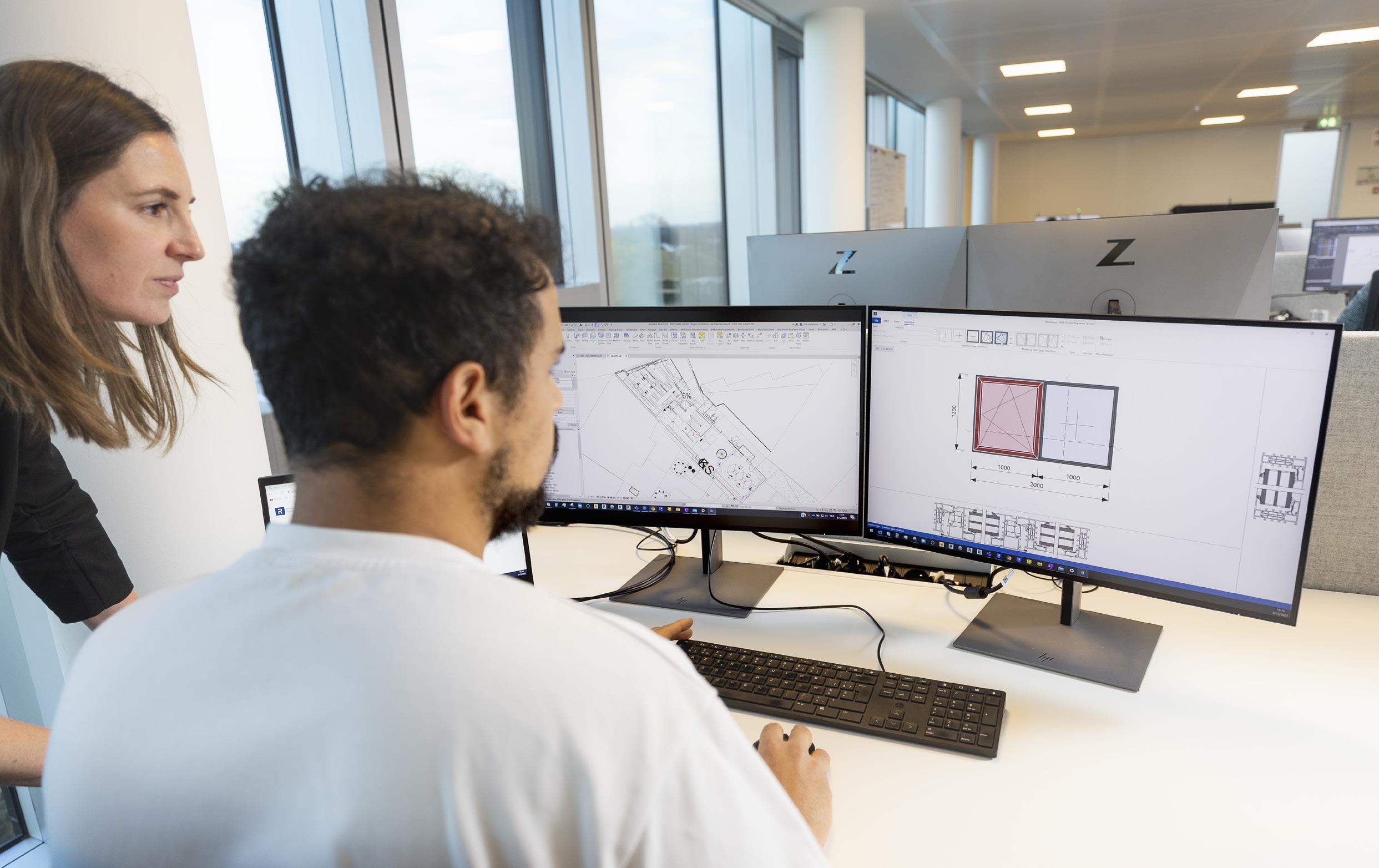
SUSTAINABILITY STRATEGY & RISK MANAGEMENT
Why it matters
A clear sustainability strategy provides direction, adaptability, and a competitive edge. It helps us seize emerging opportunities and allows us to allocate resources efficiently. It also encourages us to innovate, foster partnerships, gain customer insights, and increase our positive impact.
Our approach
Recently, Reynaers Group has gone through a remarkable transition, with our sustainability strategy, Reynaers Act, evolving into a comprehensive Environment, Social and Governance (ESG) strategy. Not only have ESG factors become an integral part of our business strategy, but we also closely monitor potential ESG risks.
Our Sustainability Board, designed to champion sustainability within our company, convenes every six weeks. The members discuss significant news and developments, and cultivate a strong and cohesive approach to sustainability.
Targets
I. From 2023, our Sustainability Board reports on ESG topics when relevant during meetings with our Board of Directors.
II. From 2025, we take ESG risks into account when conducting our annual risk assessment.
CASE STUDY
Reynaers Group’s sustainability initiatives are acknowledged by the United Nations
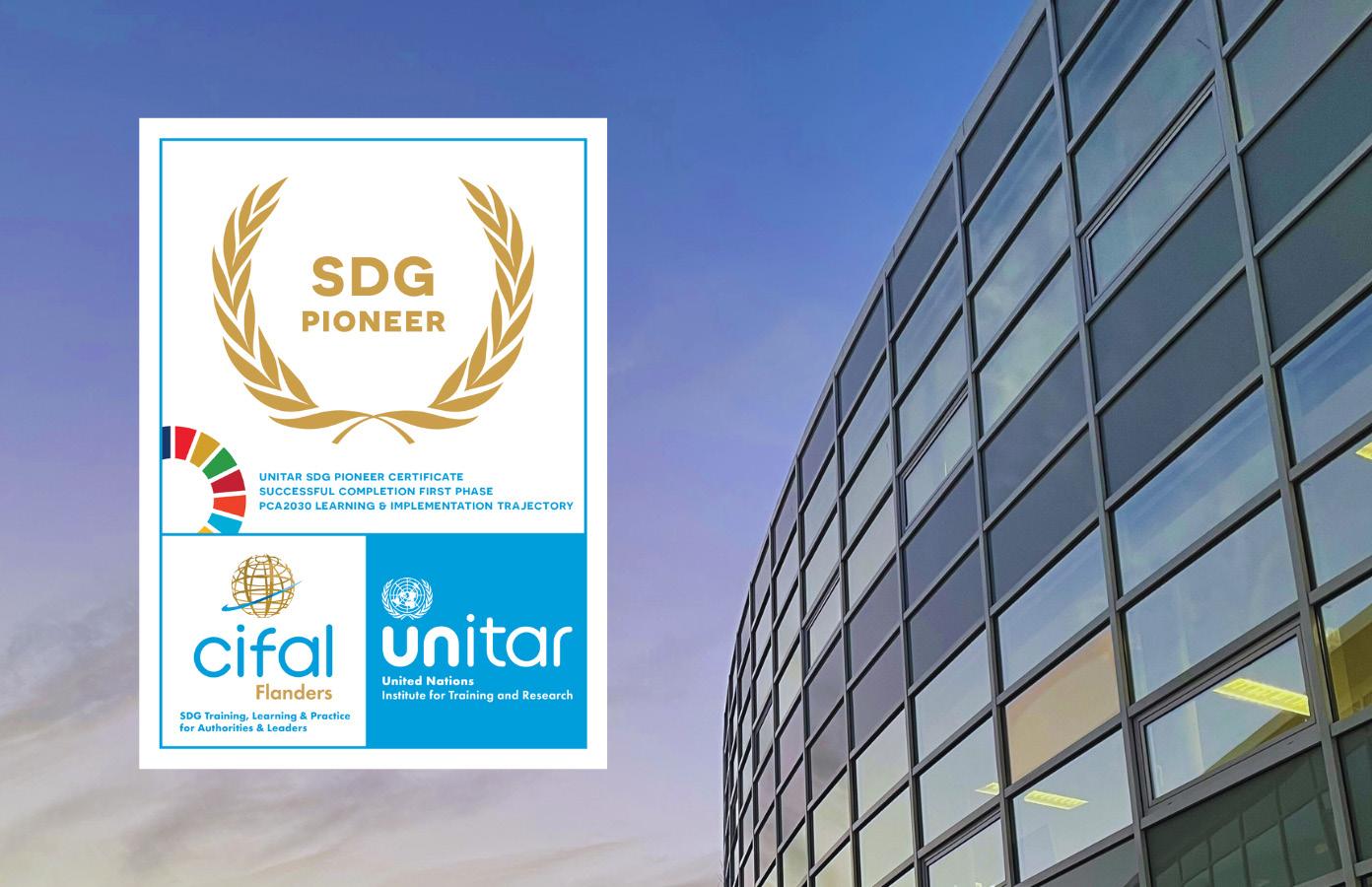
In 2023, Reynaers Group received the internationally recognised SDG-Pioneer Certificate as a reward for our continuous sustainability efforts. The certificate, awarded by the United Nations, honours companies that have taken successful actions to make their business policy more sustainable, taking into account
the 17 Sustainable Development Goals (SDGs) determined by the UN.
At the official event, the certificate was handed over by Sherri Aldis – Director of the United Nations Regional Information Centre.
LOCAL COMMUNITIES (PHILANTHROPY)
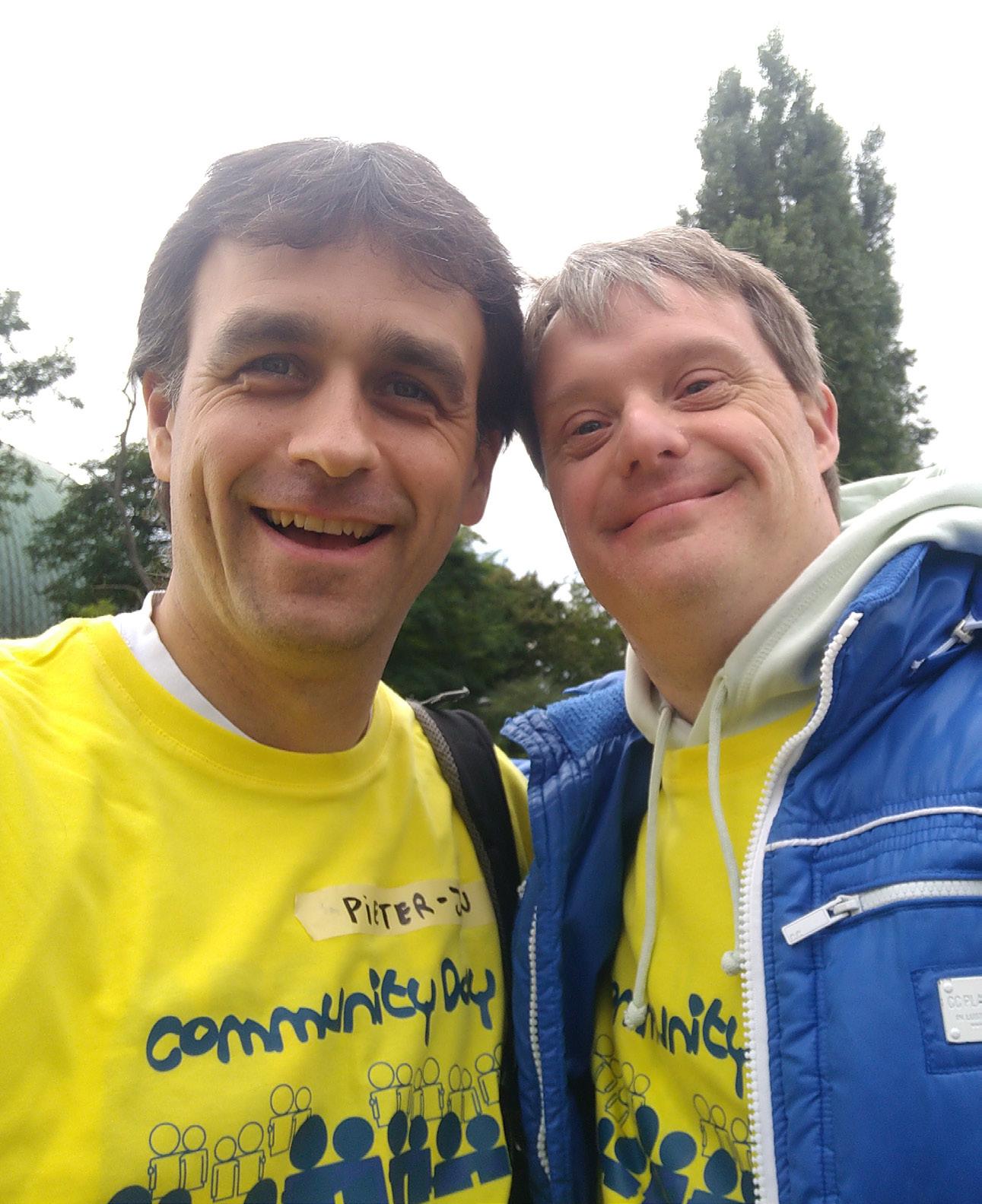
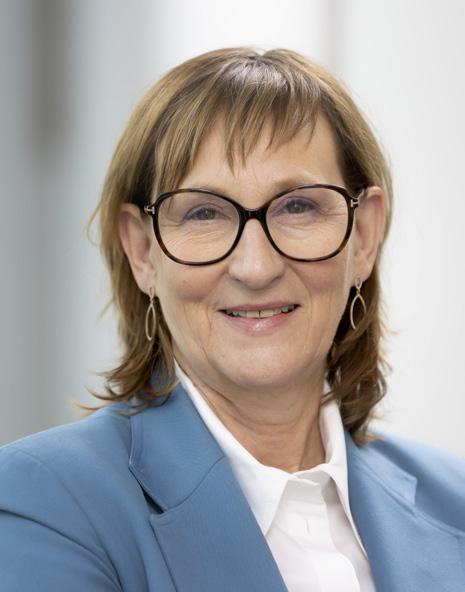
To increase our impact within our local communities, we always involve engaged employees in our charity.
KARIN REIJNAERS - Executive Director
Why it matters
We are a caring partner for all our employees and stakeholders. To have a lasting positive impact on society, we support local and regional initiatives that improve the working and living conditions of people in and around our organisation.
As a large company, we feel it is our duty to give something back to society. After all, trust between us and our communities is a major building block for a successful and sustainable business.
Our approach
To maximise our impact, our approach has two focus points: people and engagement. First, we focus on projects and initiatives that contribute to people and minority groups. In addition, the engagement and involvement of our employees play a crucial role. Reynaers Group supports local communities in three different ways:
I. Reynaers for Community
Reynaers for Community, a two-year funding programme for non-profit organisations, targets two themes: employment-driven education and health. We collaborate with Belgian nonprofit organisations to pave the path for individuals, guiding them to school or work. At the same time, we contribute to health-related charities such as cancer research support.
At the end of 2023, Reynaers for Community reached out to charities all over Belgium that shape vulnerable individuals towards employment. With an internal panel, all applications were screened and five projects were chosen for financial support:
• DUO for a JOB: organisation that guides young, unemployed immigrants towards a new job.
• Rising You: a professional rock-climbing club that guides young refugees to challenging job opportunities at great heights, such as maintenance technician of wind turbines.
• aPart: non-profit that supports vulnerable young adults and families in finding their place in society.
• TWERK: socio-economic organisation where people living with autism can enter the job market as fairtrade chocolatiers.
• Moving Ground: performance collective that tackles social inequality in the city through dance, music, theatre and spoken word.
At the end of 2025 a new call for applications will be sent out for new funding.
II. Community day
Every year, our employees are free to spend one of their workdays doing charity work. We call this a ‘community day’. They can choose from several selected projects and charities. In 2023, around 240 employees attended the Community Day and contributed to a good cause. The actual implementation of all these initiatives is left to the respective Reynaers Group branches worldwide. Each branch manages its own budget and is responsible for proposing its own projects.
III. Sponsoring
We like to contribute financially to smaller and local initiatives. Local sports teams, primary and secondary schools, universities and high school student association, cultural organisations and communal events are among the many entities we sponsor.

Responsible procurement & due diligence
At Reynaers Group, we focus not only on the effect of our own activities, but also on our impact throughout the value chain. Quality and growth are important to us, but not at the expense of our employees, our partners or the planet. That is why our sustainability strategy addresses our entire value chain.
RESPONSIBLE PROCUREMENT & SUPPLY CHAIN MANAGEMENT
Why it matters
Reynaers Group has a significant indirect influence on society and the environment through its supply chain. We collaborate and communicate with our suppliers to improve and mitigate any potential risks and negative impact.
Our approach
To ensure our suppliers comply with our beliefs and requirements, we have made the Supplier Code of Conduct an integral part of our supplier manual, which is signed by all our partners at group level.
We expect all our suppliers and their subcontractors to act according to our Supplier Code of Conduct. In this way, we know they follow our principles and expectations regarding natural resources and environmental risks.
To reinforce our growing sustainability ambitions, we will expand and tighten the current Supplier Code of Conduct. What we expect of our suppliers will be put in line with our new sustainability strategy and its ambitions.
Finally, we expect our suppliers to carry out self-assessments at our request and we regularly assess our suppliers’ compliance with the Code as part of our supplier quality audits and facility visits.
Our actions
Every year, we reward our top-performing suppliers with Supplier Awards. These awards recognise excellence in terms of operations, innovation and sustainability. Our aim is to encourage suppliers to adopt more sustainable practices and to decrease their environmental footprint within the supply chain.
CASE STUDY
Reynaers Aluminium Supplier Awards: solidifying futureproof partnerships
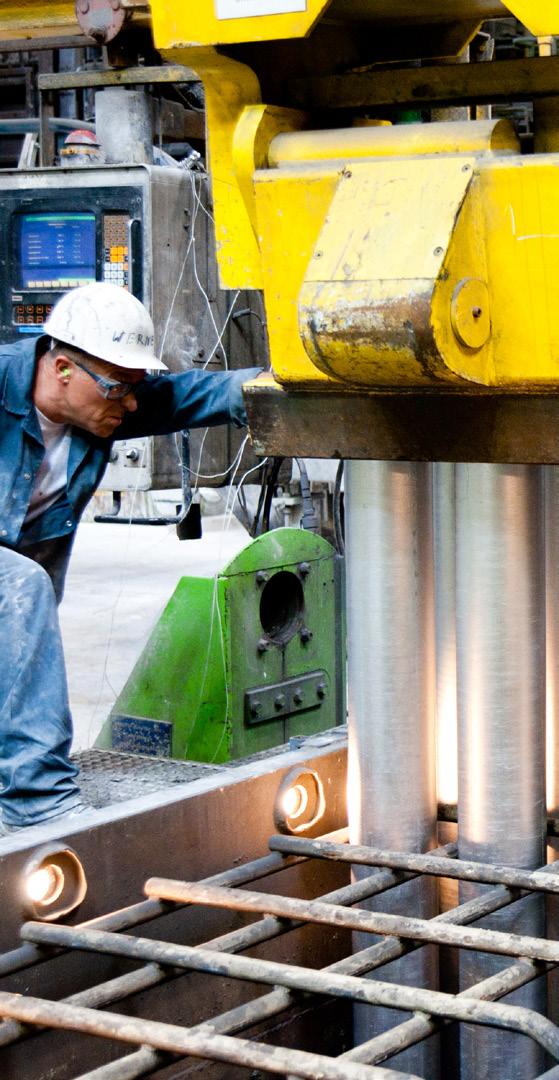
In 2021, we initiated the annual Supplier Awards programme to encourage our suppliers to excel in various areas. These awards revolve around three fundamental business expectations: Operational Excellence, Sustainability, and Innovation.
“Granting these awards not only strengthens the professional bond we have with our partners, but it also showcases our ambition to impact our joint future for the better”, says Filip Buts, Procurement Lead at Reynaers Group. “We want to work with suppliers who help us grow together through their outstanding operational performance, who display fair business ethics at all times, and who continue to innovate in terms of product design and material use.”
What is more, by encouraging suppliers to reevaluate their business practices and to decrease their environmental footprint, we can significantly limit the environmental impact of our entire value chain. Together, we can reach our 2030 sustainable goals, including Scope 3 emission reduction targets.
Targets
I. By 2025, a supply chain risk mapping is conducted.
II. By 2025, a new Supplier Code of Conduct is developed and signed by 75% of our strategic suppliers.
III. By 2027, audits have been performed at 60% of our strategic suppliers’ sites to verify compliance with our Supplier Code of Conduct.
IV. By 2027, 75% of our strategic suppliers have developed an ESG action plan that meets the requirements of our Supplier Code of Conduct.
Our performance
In the next years we will track and report on the signage rate, audit and alignment of our new supplier Code of Conduct.
Quality and growth are important to us, but not at the expense of our employees, our partners or our planet. That is why our sustainability strategy addresses our entire value chain.

BIODIVERSITY AND WATER MANAGEMENT IN THE VALUE CHAIN
Why it matters
Aluminium production and use across the value chain, from bauxite mining to end-oflife recycling, has a significant direct and indirect impact on both biodiversity and water. For example, bauxite mining can entail habitat destruction, soil erosion, and water pollution.
According to a study 3), bauxite mining has a highly negative impact on both groundwater and surface water quality. As a large-scale aluminium user, we feel it is our duty to examine not only our own impact on local water and biodiversity conditions, but the impact of our entire value chain.
Our approach
In order to establish a comprehensive group-wide strategy, we start by mapping out and assessing our indirect impact on biodiversity and water management across the value chain.
By seeking partnership opportunities and collaborating with the right sector organisations, we also believe that Reynaers Group can enhance its efforts and amplify its influence in addressing biodiversity and water management along the value chain.
Targets
I. By 2025, we have mapped out our impact on biodiversity and water (use and pollution) throughout the value chain.
3) KY, L., LY, H. ., KH, T. ., YY, . T., SP, L. ., AM, Q. ., T, . P. ., & R, N. . (2017).
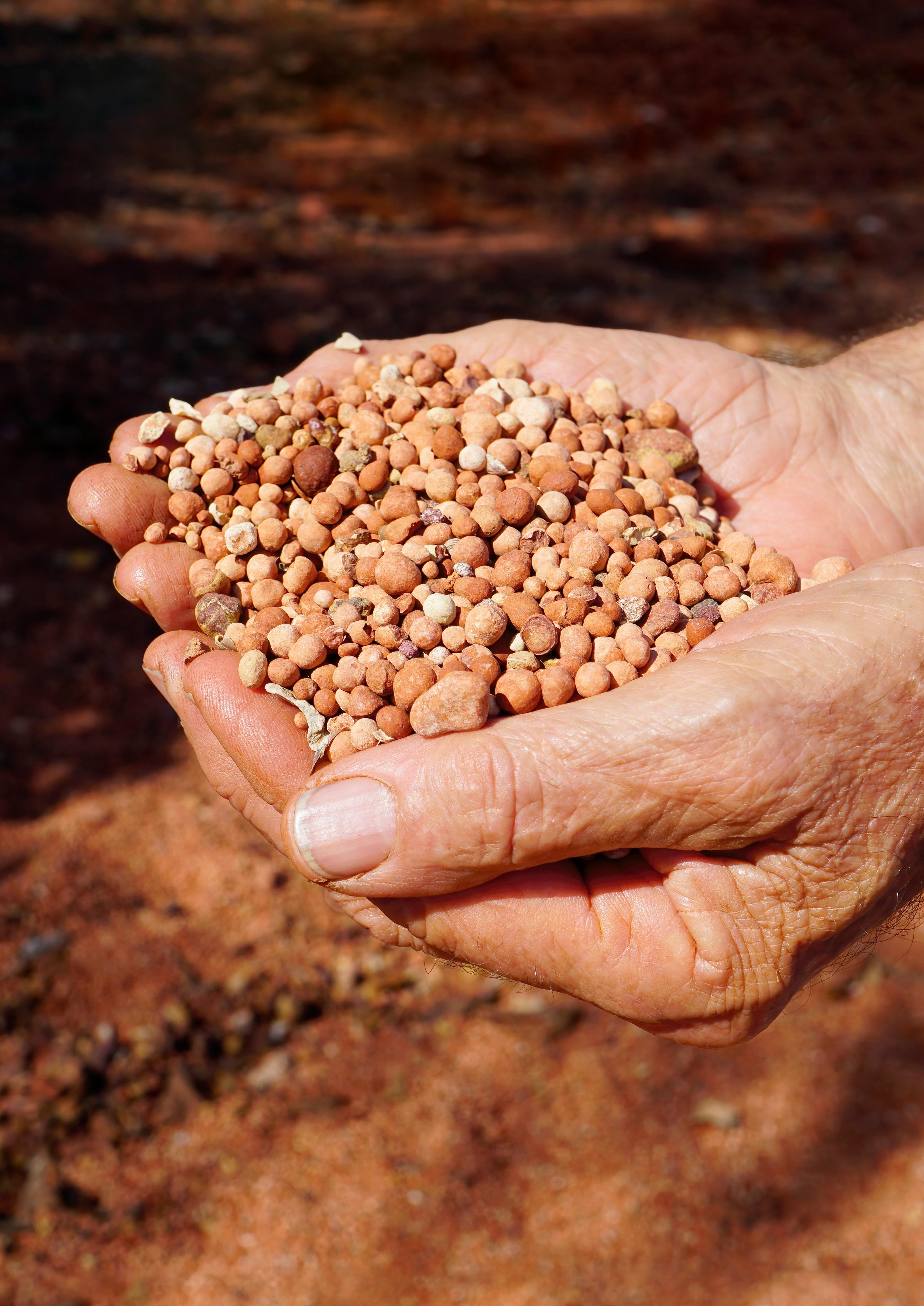
Transparency, traceability and communication
TRANSPARENCY AND REPORTING
Why it matters
Our customers, employees, partners and banks are gradually demanding more insight into our activities. At the same time, ethical entrepreneurship - with an eye for people and planet - is becoming increasingly important. To gain and maintain the trust of all our stakeholders, transparency at all levels of our organisation is essential.
Our approach
Open and frequent communication is key to a transparent and trusting relationship with our stakeholders. That is why we have published our first sustainability strategy in 2021, called Reynaers Act. With this strategy and report, we communicated our commitment to contribute positively to climate and society for the first time. We aim to publish the sustainability report every year, to keep track of our progress with clear targets and objective metrics. In the coming years, we will take the necessary steps to transform this document into a CSRD compliant report, in order to obtain maximum transparency.
Our actions
Data is the source of all knowledge. That is why we are currently working hard to formally set up data streams and track various metrics. That way, we can report transparently as well as track our performance meticulously.
TRACEABILITY
Why it matters
Traceability is an important aspect of ensuring our quality control and sustainability processes. Knowing the complete history of a product and its individual components or materials significantly reduces the risk of product defects, recalls and returns, which are damaging to both the business’s finances and its public image.
Our actions
Our approach
We are committed to procure our materials in a sustainable and ethical manner. We recognise the importance of securing a reliable supply of materials that are environmentally and socially responsible. To this end, we will set up a full traceability strategy and action plan.
In order to guarantee the traceability of materials within our supply chain, we will conduct an exhaustive risk assessment of our suppliers. We will start by thoroughly mapping the risks across the entire upstream supply chain, followed by a comprehensive assessment to gauge their magnitude and extent. This will ultimately lead to strategic mitigation measures.
Targets
I. By 2026, we have developed a traceability strategy throughout our value chain, with a clear roadmap and action plan.
DIALOGUE WITH STAKEHOLDERS
Why it matters
Open communication builds trust with our stakeholders. It helps us to identify potential risks and opportunities early on. Moreover, stakeholders often offer innovative ideas and suggestions that can drive product or service improvements, enhance sustainability efforts or lead to new business opportunities.
Our approach
We have a variety of international stakeholders. In order to engage with them in a more structured way, we are working on a mechanism to share ideas and suggestions.
In the run-up to our new corporate sustainability strategy, we also organised an extensive stakeholder consultation. This consultation process was instrumental in pinpointing the most important sustainability topics for our organisation. From now on, we will conduct a comprehensive assessment every three years. Additionally, we are committed to maintaining ongoing and meaningful engagements with our stakeholders to continuously monitor and improve our environmental, social, and governance (ESG) impact.
Our actions
We try to keep in touch regularly with all our stakeholders to stay up to date with their wishes, ideas, suggestions, etc. For example, we insist that our local sales teams maintain close contact with their clients. Our charity actions for local communities should also reduce the distance between the people and our organisation. In addition, we regularly participate in commercial events and trade fairs. And finally, our bi-annual employee engagement survey ensures that we keep our finger on the pulse of our own employees as well.
Targets
I. We stay in close contact with our stakeholders to monitor our ESG impact, and we conduct a largescale stakeholder survey every three years.
CASE STUDY
Partnering at BAU 2023
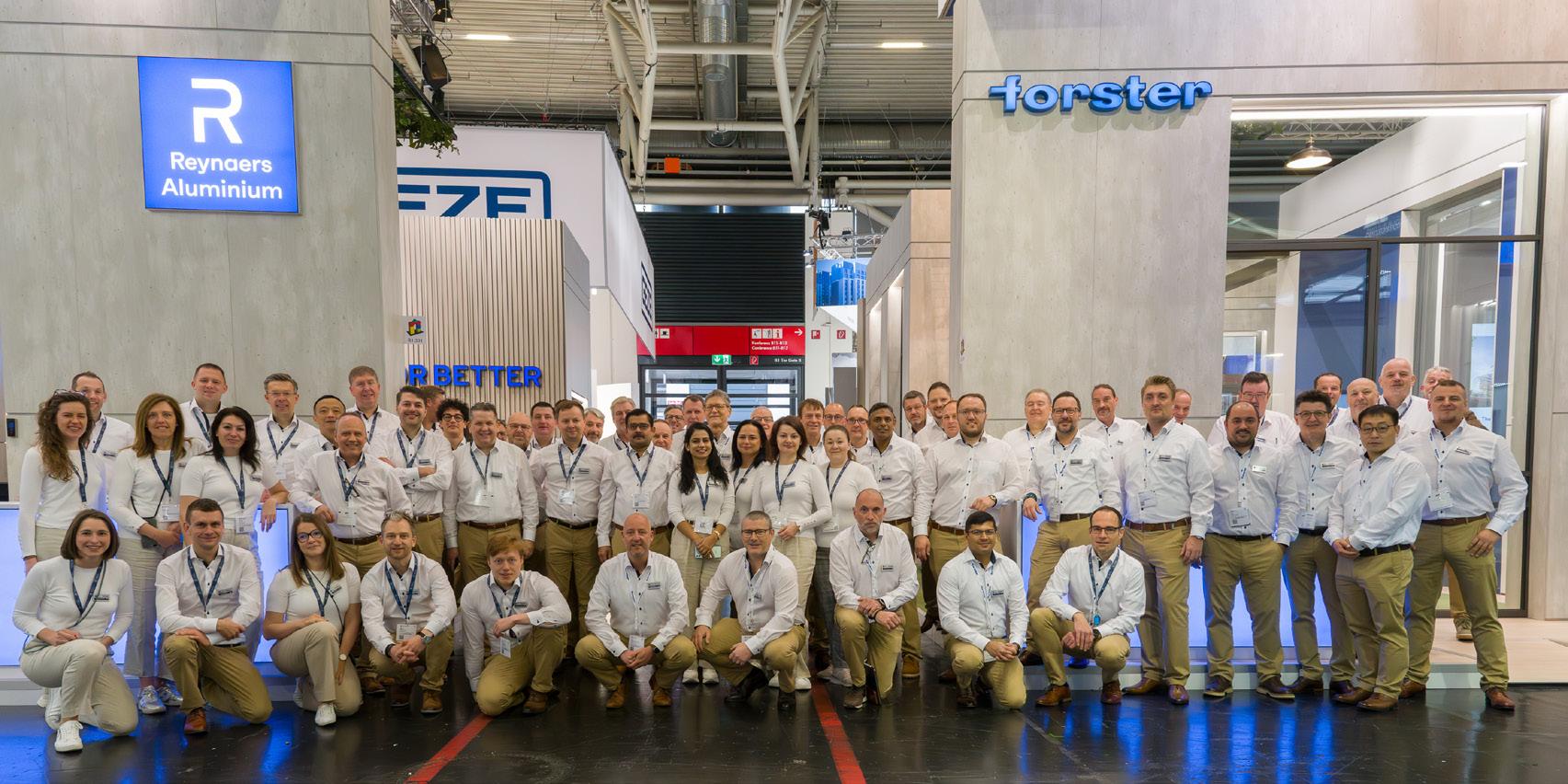
In April 2023, Reynaers Aluminium and Forster attended the BAU trade fair in Munich, Germany. We showcased our latest aluminium and steel developments and connected with our many stakeholders.
BAU Munich is the world-renowned international trade fair where architects, investors, fabricators and the like come together and share the latest trends in architecture and the building industry.
This event was an opportunity to make our motto ‘Together for better’ come alive, by building partnerships, showcasing innovations and demonstrating our sustainability efforts.
Annex
Overview Sustainability strategy
Lifelong learning and personal growth
• Lifelong learning Talent development
Healthy and safe place to work
• Safety and physical health
• Mental health
Empowering culture
• Employee engagement
• Entrepreneurship and innovation Diversity and inclusion
Climate action
• Reduction of greenhouse gas emissions in our operations (Scope 1 and 2)
• Reduction of greenhouse gas emissions in our value chain (Scope 3)
• Water and soil pollution
Circular solutions
• Eco-design of our products
• Circular business model and collection of scrap material
• Packaging
Sustainable buildings
• Decarbonisation
• Circular buildings
Comfort
Ethical and responsible business
Ethical behaviour
• Healthy and sustainable business growth
• Sustainability strategy and risk management
• Local communities (philantrophy)
Responsible procurement and due diligence
• Responsible procurement and supply chain management
• Biodiversity and water management in the value chain
Transparency, traceability and communication
• Transparency and reporting
• Traceability
Dialogue with stakeholders
Overview ESRS
ESRS Standard Chapter Pages
• About this report
ESRS 2 General disclosures
ESRS E1 Climate change
• Reynaers Group at a glance
• Corporate governance
• Our sustainability strategy 6 - 21
• Reduction of greenhouse gas emissions in our operations (Scope 1 and 2)
• Reduction of greenhouse gas emissions in our operations (Scope 3)
ESRS E2 Pollution Water and soil pollution
ESRS E3 Water and marine resources Biodiversity and water management in the value chain1)
ESRS E4 Biodiversity and ecosystems Biodiversity and water management in the value chain2)
ESRS E5 Resource use and circular economy Circular solutions
ESRS S1 Own workforce Engaging our own people
ESRS S2 Workers in the value chain N/A3)
ESRS S3 Affected communities N/A3)
ESRS S4 Consumers and end-users N/A3)
ESRS G1 Business conduct Ethical and responsible business
- 35
- 37
- 49
- 87
1) Water scarcity (own operations) was not deemed as material following the double materiality study and therefore do not follow the respective ESRS standards.
2) Biodiversity (own operations) was not deemed as material following the double materiality study and therefore do not follow the respective ESRS standards.
3) These topics were not deemed as material following the double materiality study.
- 98
Overview targets
Climate action
Absolute reduction of Scope 1 and 2 emissions compared to 2019. By 2030 -46.2% -4.5%
Relative reduction of Scope 3 emissions compared to 2019: purchased goods - production SBT target coverage (Aluminium, Thermal break, Steel and others). By 2030 -55% -4.6%
Circular solutions
Percentage of new strategic product development crosschecked with our Reynaers Group eco-design checklist.
As of 2024 100% NA
Recertification of Reynaers Aluminium products to the more strict criteria of Cradle2Cradle-level bronze. By 2025
Start of replacement of fire retardant materials in our Forster fireproof products into more sustainable alternatives.
Work in progress
As of 2026 NA
Investigation of possible partnerships to set up a collection system for scrap material. By 2025
Development of our digital tool Digitrace to add more sustainability data. By 2026
Availability of a strategy on the reduction of the environmental impact of our packaging. By 2025
Sustainable buildings
Percentage of product ranges reviewed to the requirements and criteria of sustainability certifications such as LEED and BREEAM.
Number of research projects on sustainability per year with external organisations.
Work in progress
Work in progress
Work in progress
As of 2024 100% NA
As of 2023 1
Inclusion of environmental impact of our products in BIM systems. By 2025
Lifelong learning and Personal growth
Roll out of new learning platform with an elaborate online training offering. By 2025
Percentage of employees that follow at least 3 training sessions (classroom, e-learning, webinar,…) a year. By 2027 80%
Roll out of our Talent Pool Module in our strategical markets. By 2025
Percentage of performance talks administrated in the global HR system. By 2025 80%
Percentage of senior management in our strategical markets that participate in a leadership topic training. By 2027 100%
Healthy and safe place to work
Since January 2023, 3 research projects were started.
Work in progress
Work in progress
Data gathering ongoing
Work in progress
Data gathering ongoing
Data gathering ongoing
Definition of a Reynaers Group global Health, Safety and Environment (HS&E) strategy. By 2024 Completed
Number of facilities where the global HS&E strategy is implemented in the local management system. By 2025 12
Set up of group and local KPIs based on their past performance and group strategy. By 2025
Monitoring the mental health indicators included in our bi-engagement survey. By 2025
Availability of a formal confidant counsellor. By 2025 100%
Work in progress
Work in progress
Work in progress
Work in progress
Empowering culture
Monitoring of the diversity and inclusion (D&I) indicators included in our bi-engagement survey. By 2025 Work in progress
Monitoring of gender pay gap in our strategical markets. By 2025 Work in progress
Ethical and responsible business
Percentage of our employees offered training on bribery/ anti-corruption/Code of Conduct.
Number of yearly communication campaigns regarding bribery/ anti-corruption/Code of Conduct/…
Amount of Board of Director meetings where ESG-topics were discussed.
Taking into account ESG-risks when conducting our annual risk assessment.
Responsible purchasing & due diligence
As of 2026 100% Work in progress
As of 2025 2 Work in progress
As of 2023 6 meetings in 2023
As of 2025 Work in progress
Mapping of supply chain risks. By 2025 Work in progress
Development of a new Supplier Code of Conduct. By 2025 Work in progress
Percentage of our strategic suppliers that signed the Supplier Code of Conduct. By 2025 75%
Percentage of strategic suppliers audited. By 2027
Percentage of strategic suppliers that have developed an ESG action plan. By 2027
in progress
Mapping of our impact on biodiversity and water (use and pollution) throughout the value chain. By 2025 Work in progress
Transparency, traceability and communication
Development of a traceability strategy throughout our value chain with a clear roadmap and action plan. By 2026 Work in progress
Continuous contact with our stakeholders to monitor our ESG impact and conduct a large-scale stakeholder survey every 3 years. / Extensive stakeholder survey in 2023
